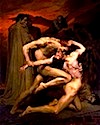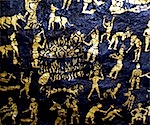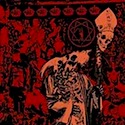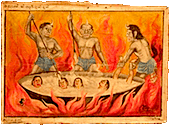| PRESS,
ESSAYS AND EDITORIALS
Click
√ on
Images at
LEFT for full
texts |
| |

|
 Science
and Faith
Science
and Faith |
|
"In
Christian marriage, one's spouse is one's 'Number Two,'
while the only 'Number One' is God.
CatholicMatch.com
is laying the groundwork so that in loving God, future spouses may
find the only way to adequately love each other."
Endorsed
by
Reverend Frank Pavone
(he who knows not)
Founder
Priests for Life |
|
 |

GARY GUTTING
Professor
of philosophy at the University of Notre Dame, and an editor of Notre
Dame Philosophical Reviews
|
Do
the Bishops Have a Case Against Obama?
By GARY GUTTING
The New York Times: May 31, 2012
Religion often comes alive in the face of persecution.
Recently, 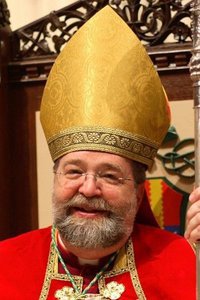 Daniel
Jenky (right),
the bishop of Peoria, Ill., did not hesitate
to play the persecution card in the dispute
with the Obama administration over required
health insurance coverage of birth control. Evoking the history of
“terrible persecution” of the Church,
he said: “Hitler and Stalin
would not tolerate any competition with the state in education, social
services and health care. . . . Barack Obama — with his radical,
pro-abortion and extreme secularist agenda — now seems intent
on following a similar path.” In an effort
to clarify the statement, a diocese spokesperson said, “We certainly
have not reached the same level of persecution. However, history teaches
us to be cautious once we start down the path of limiting religious
liberty.” (She did not explain just what the bishop regarded
as the Church’s current “level of persecution” by
the administration.) Daniel
Jenky (right),
the bishop of Peoria, Ill., did not hesitate
to play the persecution card in the dispute
with the Obama administration over required
health insurance coverage of birth control. Evoking the history of
“terrible persecution” of the Church,
he said: “Hitler and Stalin
would not tolerate any competition with the state in education, social
services and health care. . . . Barack Obama — with his radical,
pro-abortion and extreme secularist agenda — now seems intent
on following a similar path.” In an effort
to clarify the statement, a diocese spokesperson said, “We certainly
have not reached the same level of persecution. However, history teaches
us to be cautious once we start down the path of limiting religious
liberty.” (She did not explain just what the bishop regarded
as the Church’s current “level of persecution” by
the administration.)
Jenky’s remarks are only a bit more extreme
than standard rhetoric from bishops and other conservative Catholics,
who now routinely talk of an “attack”
or “war” on religious liberty.
Are things really this bad? Or are we seeing a perhaps politically
motivated “tempest in a holy water fount”?
We cannot, of course, be certain about the bishops’ motives
in overdramatizing what should be a routine disagreement. But their
often demagogic reaction suggests political rather than religious
concerns. There is, first, the internal politics of the Church, where
the bishops find themselves, especially on matters of sexuality, increasingly
isolated from most Church members; they seem desperate to rally at
least a fervid core of supporters around their fading authority. But
the timing of their outbursts also suggests a grasp for secular political
power. It’s hard to think that the bishops — especially
given their concerns for social welfare — would more than mildly
prefer a Romney administration to an Obama administration. But, hoping
to emulate the success of Protestant evangelicals,
they may well want to establish their own credentials as significant
players in American politics. We can only pray that American
Catholics will see through any such effort.
Published
Commentary
 Daniel
Jenky, the bishop of Peoria, Ill., evoking the history of
“terrible persecution” of the Church, he said:
“Hitler and Stalin would not tolerate any competition
with the state in education, social services and health care.
. . . Barack Obama — with his radical, pro-abortion
and extreme secularist agenda — now seems intent on
following a similar path.” Daniel
Jenky, the bishop of Peoria, Ill., evoking the history of
“terrible persecution” of the Church, he said:
“Hitler and Stalin would not tolerate any competition
with the state in education, social services and health care.
. . . Barack Obama — with his radical, pro-abortion
and extreme secularist agenda — now seems intent on
following a similar path.”
Adolf
Hitler on Education: "Secular schools can never be tolerated
because such a school has no religious instruction and a general
moral instruction without a religious foundation is built
on air; consequently, all character training and religion
must be derived from faith ... We need believing people.".
ROBERT
COANE, May 31, 2012
@
tenoreNew York NY
The recent action of the bishops shows admirable courage and
commitment so often lacking in the past 50 years. As Prof.
Gutting notes, their arguments are correct: there is a limit
to the government's ability to interfere with the rights of
religious people and this limit has been crossed. It is not
the bishops duty to figure out how the government can cross
these limits and not get caught.
A blatant assault on religious freedom is hardly a "routine
disagreement." Prof. Gutting will be well advised to
note that the timing of this political assault was chosen
by the government, not the bishops.
June 1, 2012 at 11:04 a.m.
I
say these accusations of “terrible persecution,”
this alleged “blatant assault on religious freedom,”
are a distraction from pedophilia, misogyny, homophobia and
financial malfeasance in the Catholic Church, smoke and mirrors
from the Vatican.
"To thine own self be true,
and it must follow, as the night the day, thou canst not then
be false to any man."
~ William Shakespeare
Hamlet Act 1, scene 3
ROBERT
COANE, June 1, 2012
@
Manu Radhakrishnan, New York
It was my understanding that this rule applied to entities
that receive federal funds.
Catholic hospitals that are entirely privately funded are
exempt from this rule.
However, those that accept public funds cannot both accept
government monies & then shout foul that these monies
come with strings attached. This strikes one as hypocritical.
 A
proper reply to the bishops:
"Want taxes?" A
proper reply to the bishops:
"Want taxes?"
ROBERT COANE, June 1, 2012
|
|

MAUREEN
DOWD
|
Father
Doesn’t Know Best
By MAUREEN DOWD, OP-ED COLUMNIST
The NewYork Times: May 22, 2012
My parents were the most devout Catholics I’ve
ever known. But my dad came from a family
of 16 in County Clare in Ireland, and my mom’s mother
came from a family of 13 in County Mayo. So
they balanced their faith with a dose of practicality.
After their first three kids, they sagely decided family planning
was not soul-staining. So I wasn’t surprised to see the
Gallup poll Tuesday showing that 82 percent of U.S. Catholics say
birth control is morally acceptable. (Eighty-nine percent of
all Americans and 90 percent of non-Catholics agreed.) Gallup
tested the morality of 18 issues, and
birth control came out on top as the most acceptable,
beating divorce, which garnered 67 percent
approval, and “buying and wearing clothing
made of animal fur,” which got a 60 percent thumbs-up
(more from Republicans, naturally, than Democrats).
Polygamy, cloning humans and having an affair took the most morally
offensive spots on the list. “Gay or lesbian
relations” tied “having a
baby outside of marriage,” with 54 percent approving. That’s
in the middle of the list, above a 38 percent score for abortion
and below a 59 percent score for “sex between an unmarried man
and woman.”
The poll appeared on the same day as headlines about Catholic Church
leaders fighting President Obama’s attempt to get insurance
coverage for contraception for women who work or go to college at
Catholic institutions. The church insists it’s
an argument about religious freedom, not birth control.
But, really, 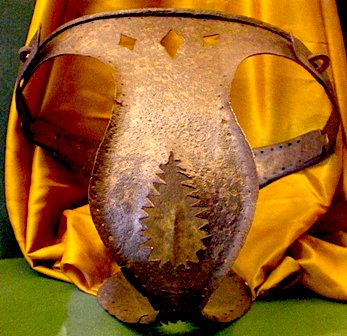 it’s
about birth control, and women’s lower caste in the church.
It’s about conservative bishops targeting Democratic candidates
who support contraception and abortion rights as a matter of public
policy. And it’s about a church that is obsessed with sex in
ways it shouldn’t be, and not obsessed with sex in ways it should
be. it’s
about birth control, and women’s lower caste in the church.
It’s about conservative bishops targeting Democratic candidates
who support contraception and abortion rights as a matter of public
policy. And it’s about a church that is obsessed with sex in
ways it shouldn’t be, and not obsessed with sex in ways it should
be.
The bishops and the Vatican care passionately
about putting women in chastity belts.
Yet they let unchaste priests run wild for decades, unconcerned about
the generations of children who were
violated and raped 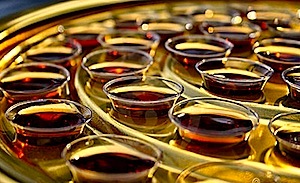 and
passed around like communion wine. and
passed around like communion wine.
Some
leading Catholic groups endorsed the compromise struck by the Obama
administration that put the responsibility for providing the contraceptives
on the insurance companies, not religious institutions. But others
wanted to salute the Vatican flag and keep fighting. On
“CBS This Morning” on Tuesday,
the pugnacious Cardinal Timothy Dolan of the
Archdiocese of New York rejected the compromise and charged
that the White House is “strangling” the church.
The church leaders headed to court hope to undermine the president,
but they may help him. Voters who think sex is only for procreation
were not going to vote for Obama anyway. And the
lawsuit reminds the rest that what the bishops
portray as an attack on religion by the president is really an attack
on women by the bishops.
Published Commentary
 The
reply to the Archdiocese of Washington’s “warning
of apocalyptic risk” is found, incredibly, in
Mother Teresa of Calcutta who
stated unequivocally and on record: The
reply to the Archdiocese of Washington’s “warning
of apocalyptic risk” is found, incredibly, in
Mother Teresa of Calcutta who
stated unequivocally and on record:
“I’m
not a social worker. I don’t do it for this reason.
I do it for Christ. I do it for the church.”
Good deeds be damned! The Church trumps all..
ROBERT
COANE, May 23, 2012
|
|

MAUREEN
DOWD
|
Here
Comes Nobody
By MAUREEN DOWD, OP-ED COLUMNIST
The New York Times: May 19, 2012
I
ALWAYS liked that the name of my religion was also an adjective meaning
all-embracing.
I was a Catholic
and I wanted to be catholic, someone engaged
in a wide variety of things. As
James Joyce wrote in Finnegans
Wake: “Catholic means ‘Here
comes everybody.’”
So it makes me sad to see the Catholic Church
grow so uncatholic, intent on
loyalty testing, mind control and heresy hunting. Rather than all-embracing,
the church hierarchy
has become all-constricting.
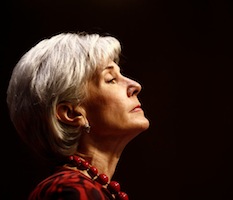 Speaking
to the graduates [at Georgetown University],
[Kathleen Sebelius, the health and human
services secretary], evoked J.F.K.’s speech asserting that religious
bodies should not seek to impose their will through politics. She
said that contentious debate is a strength of this country, adding
that in some other places, “a leader delivers an edict and it
goes into effect. There’s no debate, no criticism, no second-guessing.” Speaking
to the graduates [at Georgetown University],
[Kathleen Sebelius, the health and human
services secretary], evoked J.F.K.’s speech asserting that religious
bodies should not seek to impose their will through politics. She
said that contentious debate is a strength of this country, adding
that in some other places, “a leader delivers an edict and it
goes into effect. There’s no debate, no criticism, no second-guessing.”
Just like the Vatican.
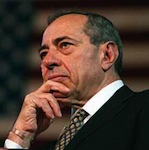 Twenty-eight
years ago, weighing a run for president, Mario
Cuomo gave a speech at Notre Dame
in which he deftly tried to explain how officials could remain good
Catholics while going against church dictums in shaping public policy. Twenty-eight
years ago, weighing a run for president, Mario
Cuomo gave a speech at Notre Dame
in which he deftly tried to explain how officials could remain good
Catholics while going against church dictums in shaping public policy.
“The American people need no course in
philosophy or political science or church history to know that God
should not be made into a celestial party chairman,” he said.
Absolute intolerance is always a sign of uncertainty
and panic. Why do you have to hunt down everyone unless you’re
weak? The church doesn’t seem to care if its members’
beliefs are based on faith or fear, conviction or coercion. But what
is the quality of a belief that exists simply because it’s enforced?
“To be narrowing the discussion and instilling
fear in people seems to be exactly the opposite of what’s called
for these days,” says the noted religion writer Kenneth
Briggs. “All this foot-stomping
just diminishes the church’s credibility even more.”
|
|
New
Fight on a Speaker at a Catholic University
By LAURIE GOODSTEIN
The New York Times: May 16, 2012
Among
politically conservative Roman Catholics, Kathleen Sebelius, the secretary
of health and human services, was already at the top of the list of
Catholic public officials considered to be traitors to the faith.
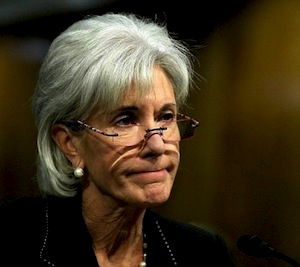 As a two-term governor of Kansas, Ms. Sebelius was told by her bishop
that she should be denied communion at Mass because of her support
for abortion rights. As health secretary, she has been vilified for
upholding the mandate in the health care overhaul that requires even
religiously affiliated institutions to provide birth control coverage
to their employees.
As a two-term governor of Kansas, Ms. Sebelius was told by her bishop
that she should be denied communion at Mass because of her support
for abortion rights. As health secretary, she has been vilified for
upholding the mandate in the health care overhaul that requires even
religiously affiliated institutions to provide birth control coverage
to their employees.
So there was an uproar when it 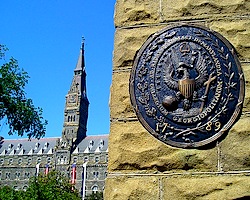 recently
became public that Georgetown University, a Jesuit institution, had
invited Ms. Sebelius to speak at an awards ceremony this Friday, its
commencement day. recently
became public that Georgetown University, a Jesuit institution, had
invited Ms. Sebelius to speak at an awards ceremony this Friday, its
commencement day.
The Archdiocese of Washington released a strong letter of rebuke to
Georgetown’s president on Tuesday afternoon, calling Ms. Sebelius
the architect of the birth control mandate — “the most
direct challenge to religious liberty in recent history.”
The conflict is only the latest example of friction between Catholic
universities and their local bishops, who are charged with ensuring
that the universities uphold Catholic doctrine and exhibit an explicitly
Catholic identity.
A conservative Catholic group in Virginia,
the Cardinal Newman  Society,
has played an influential role as a whistle-blower,
alerting bishops when they find a university stepping out of line.
This spring, the
group compiled a list of 12 Catholic universities with
commencement speakers they found objectionable
because of their support for abortion rights or gay rights. Society,
has played an influential role as a whistle-blower,
alerting bishops when they find a university stepping out of line.
This spring, the
group compiled a list of 12 Catholic universities with
commencement speakers they found objectionable
because of their support for abortion rights or gay rights.
“These conflicts are happening quite often,”
said Stephen S. Schneck, director of
the Institute for Policy Research and Catholic
Studies at the Catholic University of
America, in Washington. “We’re
very careful. I have to think when I
make my invitations what’s going to fall within the guidelines.
And to a certain extent, it makes it difficult for me to do my job
with my university program.”
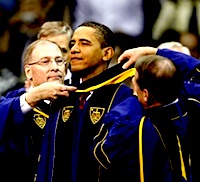 The
Georgetown controversy has generated the most outrage since the University
of Notre Dame gave an honorary degree and a commencement speaking
slot to President Obama three years ago.
Many bishops issued statements deploring the
university’s decision because of the president’s
support for abortion rights, but the
speech went ahead as planned. The
Georgetown controversy has generated the most outrage since the University
of Notre Dame gave an honorary degree and a commencement speaking
slot to President Obama three years ago.
Many bishops issued statements deploring the
university’s decision because of the president’s
support for abortion rights, but the
speech went ahead as planned.
The boundaries were drawn when the United
States Conference of Catholic Bishops issued
guidelines in 2004 that said: “The Catholic community
and Catholic institutions should not honor those who act in defiance
of our fundamental moral principles. They should not be given awards,
honors or platforms which would suggest support for their actions.”
The
bishops have made religious
liberty a rallying
cry.
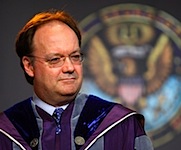 In
response to the controversy, Georgetown’s
president, John J. DeGioia, said
it was the decision of the students at the Georgetown
Public Policy Institute to invite Ms.
Sebelius in recognition of her long service as a public In
response to the controversy, Georgetown’s
president, John J. DeGioia, said
it was the decision of the students at the Georgetown
Public Policy Institute to invite Ms.
Sebelius in recognition of her long service as a public  official. official.
Patrick J. Reilly, president
of the Cardinal Newman Society, said,
“We do now have colleges that will confidentially
contact us and actually vet their speakers with us, because they want
to make sure that there won’t be concerns.”
|

LEGIONARIES
OF
CHRIST
|
Popular
Priest Fathered Child and Says He’ll Step Aside
By LAURIE GOODSTEIN
The New York Times:May 15, 2012
The priest,
the Rev. Thomas D. Williams, apologized
in a 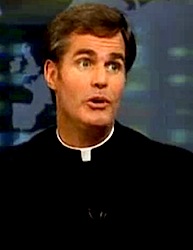 statement
on Tuesday “for this grave transgression” and “to
everyone who is hurt by this revelation.” He said he would take
a year off from public ministry to reflect on his transgressions and
his “commitments as a priest”
— a decision he said he made with his superiors. statement
on Tuesday “for this grave transgression” and “to
everyone who is hurt by this revelation.” He said he would take
a year off from public ministry to reflect on his transgressions and
his “commitments as a priest”
— a decision he said he made with his superiors.
Father Williams was the most visible American
member of the Legionaries, a powerful
and conservative Roman Catholic religious order
that has been in turmoil since 2006, when its charismatic founder
was banished by the Vatican to a life of prayer and penance.
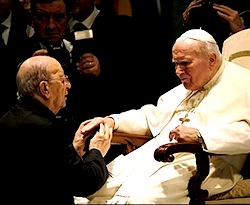 The
order’s founder, a Mexican priest named Marcial
Maciel Degollado (right with John
Paul II), died in 2008 amid revelations that he had
sexually abused young seminarians, misappropriated money and fathered
several children, some of whom say they were also victims of his sexual
abuse. Only last Friday, the Legion acknowledged
that seven of its priests are being investigated by the Vatican in
connection with the sexual abuse of minors. The
order’s founder, a Mexican priest named Marcial
Maciel Degollado (right with John
Paul II), died in 2008 amid revelations that he had
sexually abused young seminarians, misappropriated money and fathered
several children, some of whom say they were also victims of his sexual
abuse. Only last Friday, the Legion acknowledged
that seven of its priests are being investigated by the Vatican in
connection with the sexual abuse of minors.
Father Williams
said in the statement issued by the Legion that his relationship occurred
“a number of years ago.”
The Associated Press
and The National Catholic Reporter broke
the news on Tuesday after learning of allegations made by a Spanish
association of Legion victims about multiple
sexual improprieties by Father Williams.
Father Williams, who joined the Legion in 1985, was ordained a priest
in 1994, and rose to become superior of the Legion’s general
directorate in Rome. He is the author of many
books on spirituality, including “Knowing
Right From Wrong: A Christian Guide to Conscience,” and
“The World as It Could Be: Catholic Social
Thought for a New Generation.”
|
|
Nuns
on the Frontier
By ANNE M. BUTLER
The New york Times: May 15, 2012
THE
recent Vatican edict that reproached
American nuns for their liberal views on social
and political issues has put a spotlight on the practices of
these Roman Catholic sisters. While the current debate has
focused on the nuns’ progressive stances
on birth control, abortion, homosexuality, the all-male priesthood
and economic injustice, tension between American nuns and the
church’s male hierarchy reaches much further back.
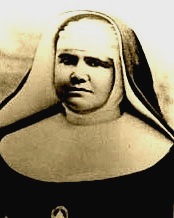 In
1886, four Texas priests demanded that
Bishop John C. Néraz replace a
superior, Mother St. Andrew Feltin (right),
saying that she had “spread gossip”
and warned her sisters “to beware of priests.” In
1886, four Texas priests demanded that
Bishop John C. Néraz replace a
superior, Mother St. Andrew Feltin (right),
saying that she had “spread gossip”
and warned her sisters “to beware of priests.”
Bishop Néraz threatened the sisterhood
with disbandment and removed Mother St. Andrew from office.
He hounded her for years, disciplined other
nuns she had befriended, suspended her right to the sacraments, warned
other bishops not to grant her sanctuary, undercut her efforts to
enter a California convent and even urged her deportation to Europe.
Finally, Mother St. Andrew laid aside her religious clothing, returned
to secular dress and cared for her widowed brother’s children.
Six years after Bishop Néraz died, Mother
St. Andrew petitioned her congregation for readmission. Donning her
habit, she renewed her vows amid a warm welcome from sisters who understood
too well what she had suffered.
Then as now, not all priests and bishops treated
sisters badly, though the priests who reached out to nuns in a spirit
of appreciation, friendship and equality could not alter the church’s
institutional commitment to gender discrimination. And, as now, some
bishops, dismissive of the laity, underestimated the loyalty secular
Catholics felt for their nuns.
In the case of Mother St. Andrew, tenacity and spirituality triumphed
over arrogance and misogyny. The Vatican would do well to bear this
history in mind as it thinks through the consequences of its unjust
attack on American sisters.
|
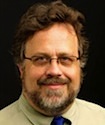
ANDREW ROSENTHAL
|
First
Nuns and Girl Scouts, Next Dora the Explorer
TAKING NOTE By ANDREW ROSENTHAL
The New York Times: :May 11, 2012
The
men who run the Catholic Church seem to have a lot of time on
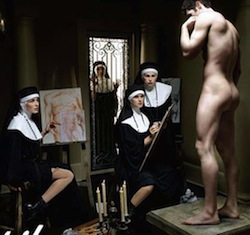 their
hands. their
hands.
In April, the Vatican criticized the leadership
conference that represents 80 percent of American Catholic nuns for
promoting “radical feminist themes.”
The Vatican felt the nuns
were focusing too much on economic injustice while keeping
“silent” on abortion and same-sex
marriage. Silly nuns, worrying about poverty instead of trying
to break up loving couples.
Meanwhile, the United States Conference of Catholic
Bishops has set its sights on an even
bigger offender  against
piety and morality – the
Girl against
piety and morality – the
Girl  Scouts
of America. Scouts
of America.
According to NPR,
the Bishop’s committee on Laity, Marriage,
Family Life and Youth is conducting an
inquiry into whether the Girl Scouts
have “problematic relationships with other
organizations.” NPR says that’s code for Planned
Parenthood.
The alleged Planned Parenthood-Girl Scouts
connection, call it the axis of feminism,
is actually something of a conservative talking point. In
February, an Indiana legislator conducted “a small amount of
Web-based research” and concluded that the
Girl Scouts are a front for Planned Parenthood. He said
the Scouts encourage the girls to have sex and
to respect unsavory role models who endorse communist and  homosexual
agendas. He noted disapprovingly that
the First Lady is the organization’s
honorary president (the
First Lady is always the honorary president), and
took exception to the fact that a Colorado troop
allowed a transgendered child to join up. homosexual
agendas. He noted disapprovingly that
the First Lady is the organization’s
honorary president (the
First Lady is always the honorary president), and
took exception to the fact that a Colorado troop
allowed a transgendered child to join up.
It’s true that the Girl Scouts welcomed
a transgendered member last year, in contrast with the Boy
Scouts, who have pursued a homophobic agenda with great zeal.
But, how do I put this? That’s a good thing. And maybe it would
be a good thing if the Girl Scouts associated with Planned Parenthood:
The health-care organization knows a thing or two about sex education—i.e.
how to avoid unwanted pregnancies that may lead to abortion.
That’s irrelevant,
though, since the Girl Scouts are not associated
with Planned Parenthood.
(Full
text)
|

NICHOLAS
KRISTOF
|
We
Are All Nuns
By NICHOLAS D. KRISTOF, OP-ED COLUMNIST
The New York Times: April 28, 2012
CATHOLIC
nuns are not the prissy traditionalists of caricature. No,
nuns rock!
They
were the first feminists, earning Ph.D.’s or working
as surgeons long before it was fashionable for women to hold jobs.
As managers of hospitals, schools and complex bureaucracies, they
were the first female C.E.O.’s.
They are also among the bravest, toughest and
most admirable people in the world. In my travels, I’ve
seen heroic nuns defy warlords, pimps and bandits. Even
as bishops have disgraced the church by covering up the rape of children,
nuns have redeemed it with their humble work on behalf of the neediest.
So,
Pope Benedict, all I can say is: You
are crazy to mess with nuns.
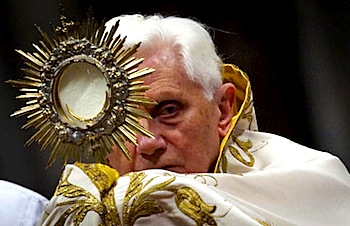
The Vatican issued a stinging reprimand of American
nuns this month and ordered a bishop to oversee a makeover of the
organization that represents 80 percent of them. In effect, the
Vatican accused the nuns of worrying too much about the poor and not
enough about abortion and gay marriage.
If you look at who has more closely emulated Jesus’s life, Pope
Benedict or your average nun, it’s the nun hands down.
“How dare they go after 57,000 dedicated
women whose median age is well over 70 and who work tirelessly for
a more just world?” Mary E. Hunt, a Catholic
theologian who is developing a proposal for Catholics to redirect
some contributions from local parishes to nuns, wrote. “How
dare the very men who preside over a church in utter disgrace due
to sexual misconduct and cover-ups by bishops try to distract from
their own problems by creating new ones for women religious?”
Nuns have triumphed over an errant hierarchy before. In
the 19th century, the Catholic Church excommunicated an Australian
nun named Mary MacKillop after her order
exposed a pedophile priest. Sister Mary was eventually invited
back to the church and became renowned for her work with the poor.
In 2010, Pope Benedict canonized her as Australia’s
first saint.
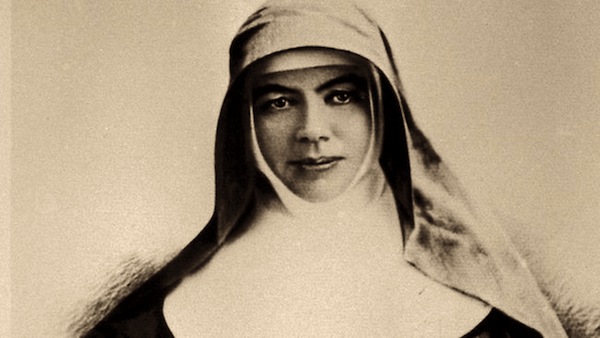
“Let us be guided” by Sister Mary’s
teachings, the pope declared then.
Amen to that.
|
|
American
Nuns, Conscience and the Vatican
EDITORIAL
The New York Times: April 19, 2012
THE
VATICAN is reining in the leadership
conference that  represents
80 percent of American Catholic nuns,
accusing the group of “serious doctrinal
problems” and promoting “radical
feminist themes.” That seems
a misreading of the very fine work in schools, charities, prisons
and impoverished neighborhoods being done by about 60,000 nuns across
the nation. represents
80 percent of American Catholic nuns,
accusing the group of “serious doctrinal
problems” and promoting “radical
feminist themes.” That seems
a misreading of the very fine work in schools, charities, prisons
and impoverished neighborhoods being done by about 60,000 nuns across
the nation.
These nuns and their leaders continued to bolster
the reputation of the Roman Catholic Church
even as it suffered one of its greatest scandals in the sexual
abuse of schoolchildren by rogue priests and the cover-ups by diocesan
authorities.
The Vatican has
now appointed a bishop to oversee the operations of the Leadership
Conference of Women Religious — the 1,500 superiors
who run the sisters’ communities — citing
individual nuns at conference gatherings challenging church teaching
on homosexuality and the
male-only priesthood. The announcement
also accused the group’s leaders of focusing
too much on poverty and economic injustice while allegedly
keeping “silent” on abortion and
same-sex marriage.
A crucial focus in the inquiry appears to be
the fact that dozens of American nuns involved in the conference and
in antipoverty and hospital work provided prominent support to President
Obama’s health care reform. Conference leaders
said Vatican investigators had pointedly raised the issue and the
fact that the conference had split with American bishops, who opposed
reform.
The sisters’ leaders said they reaffirmed their opposition to
abortion but also claimed the right to speak out on a “moral
imperative” like health care, just as the bishops had.
The nuns clearly are caught in a classic crossfire
of church doctrine, politics and hierarchical obedience. It
would be a tragedy, far beyond the church, if their fine work and
their courageous voices were constrained.
(Full
text)
|

CATHOLIC
LEAGUE
|
Church
Puts Legal Pressure on Abuse Victims’ Group
By LAURIE GOODSTEIN
The New York Times: March 12, 2012
Turning
the tables on an advocacy group that has long supported victims of
pedophile priests, lawyers for the Roman Catholic
Church and priests accused of sexual abuse in two Missouri cases have
gone to court to 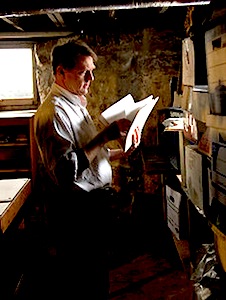 compel
the group to disclose more than two decades of e-mails that could
include correspondence with victims, lawyers, whistle-blowers, witnesses,
the police, prosecutors and journalists. compel
the group to disclose more than two decades of e-mails that could
include correspondence with victims, lawyers, whistle-blowers, witnesses,
the police, prosecutors and journalists.
The group, the Survivors Network of those Abused
by Priests, known as
SNAP, is neither a plaintiff nor a defendant in the litigation.
But the group has been subpoenaed five times in recent months in Kansas
City and St. Louis, and its national director,
David Clohessy (left), was questioned by a battery of lawyers
for more than six hours this year. A judge in
Kansas City ruled that the network must comply because it “almost
certainly” had information relevant to the case.
The network and its allies say the legal action is part of a campaign
by the church to cripple an organization that has been the most visible
defender of victims, and a relentless adversary, for more than two
decades. “If there is one group that the
higher-ups, the bishops, would like to see silenced,”
said Marci A. Hamilton,
a law professor at Yeshiva University
and an advocate for victims of clergy sex crimes, “it
definitely would be SNAP. And that’s what they’re going
after. They’re trying to find a way to silence SNAP.”
Lawyers for the church and priests say they cannot comment because
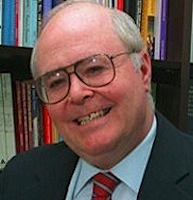 of
a judge’s order. But William Donohue (right),
president of the Catholic League for Religious and Civil Rights,
a church advocacy group in New York, said targeting the network was
justified because “SNAP is a menace
to the Catholic Church.” of
a judge’s order. But William Donohue (right),
president of the Catholic League for Religious and Civil Rights,
a church advocacy group in New York, said targeting the network was
justified because “SNAP is a menace
to the Catholic Church.”
Mr. Donohue said leading bishops he knew
had resolved to fight back more aggressively against the group: “The
bishops have come together collectively. I can’t give you the
names, but there’s a growing consensus on the part of the bishops
that they had better toughen up and go out and buy some good lawyers
to get tough. We don’t need altar
boys.”
He said bishops were also rethinking their approach of paying large
settlements to groups of victims. “The church has been too 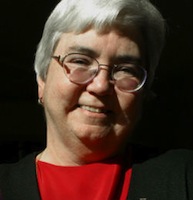 quick
to write a check, and I think they’ve realized it would be a
lot less expensive in the long run if we fought them one by one,”
Mr. Donohue said. quick
to write a check, and I think they’ve realized it would be a
lot less expensive in the long run if we fought them one by one,”
Mr. Donohue said.
However, a spokeswoman for the United States
Conference of Catholic Bishops, Sister Mary
Ann Walsh (left), said Mr. Donohue was incorrect.
“There is no national strategy,”
she said, and there was no meeting where legal counsel for the bishops
decided to get more aggressive.
Published
Commentary
 The
Catholic League for Religious and Civil Rights? That's
a new one! How many one-man "leagues" does Bill
Donohue preside over? The
Catholic League for Religious and Civil Rights? That's
a new one! How many one-man "leagues" does Bill
Donohue preside over?
"We don’t need altar
boys?” Hmmmmmmmmm.... Let's not go there, Mr.
Donohue.
ROBERT
COANE, March 13, 2012
|
EDITORIAL
Hurting
Victims’ Advocates
The New York Times: March 13, 2012
The
Survivors Network of those Abused by Priests, known as SNAP,
has played a critical role in making public the horrific crimes of
pedophile priests and holding the Roman Catholic Church accountable
for the crimes. Now the church is using a tactic that could cripple
SNAP by embroiling it in costly litigation in which it is not a party.
As Laurie Goodstein wrote in The Times on Tuesday, lawyers
for the church and priests accused of sex abuse in two Missouri cases
have gone to court to compel SNAP to hand over two decades’
worth of e-mails and a huge amount of private correspondence with
victims, lawyers, witnesses, reporters, prosecutors and the police.
The group has been subpoenaed five times in recent months and its
national director, David Clohessy, deposed
in the Kansas City, Mo., case. SNAP says it has incurred about $50,000
in legal fees and devoted hundreds of hours of staff time since the
subpoenas began. This is a strange level of interest since SNAP is
not involved in either case and Mr. Clohessy has sworn that he has
had no contact with the accuser in the Kansas City case. The church’s
lawyers want information on the network’s members and tactics,
going beyond the cases. “The real motive
is to harass and discredit and bankrupt SNAP, while discouraging victims,
witnesses, whistle-blowers, police, prosecutors and journalists from
seeking our help,” Mr. Clohessy said.
Given the aggressive legal tactics, it’s hard not to think that
he is right. The judges asked to rule on motions to compel information
must reject unfairly burdensome discovery requests. When the sex-abuse
scandal erupted a decade ago, church leaders spoke of reconciliation
with the victims. Now, in threatening to expose
private files compiled by advocates for abuse survivors, they are
giving victims new reason to retreat into fear and secrecy.
For
the church to target SNAP compounds the horror.
(Full
text)
EDITORIAL
Clerical
Abusers and the First Amendment
The New York Times: March 14, 2012
Religious
institutions have constitutional protections, but they are not above
the law. Unfortunately, that has not
stopped the Roman Catholic Church and other religious groups from
arguing that the First Amendment shields them from civil lawsuits
for negligent supervision and retention of employees who sexually
abuse children.
Most state courts that have considered the issue have rejected this
claim by churches, recognizing that holding
religious employers liable for failure to monitor employees in sex-abuse
cases does not interfere with constitutionally protected religious
freedoms.
However, courts in Missouri, Wisconsin and Utah
have twisted the First Amendment into a shield for organizational
liability for pedophile clergy. In an
outrageous case, a Missouri appellate court summarily dismissed a
negligence case brought against the Archdiocese of St. Louis by an
individual who said he had been abused by a priest. His suit charged
the archdiocese with negligent failure to supervise the priest, who
had a past record of child sexual abuse. The
court threw out the complaint, saying that Missouri law does not allow
it because judging the supervision of the priest would require inquiry
into religious doctrine, which it contends would violate the First
Amendment.
This bizarre conclusion would grant churches
a special exemption from neutral, generally applicable laws designed
to protect children. The United States Supreme Court now has
an opportunity to reverse this erroneous interpretation of the Constitution.
The justices should grant the plaintiff’s petition for review,
which they are scheduled to consider on Friday.
Since some 20 states have not ruled on this issue, the
Supreme Court can provide urgently needed clarity. It should firmly
declare that the First Amendment does not exempt religious entities
from accountability for exposing children to harm.
(Full
text)
|
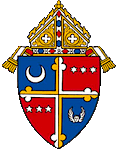 ARCHDIOCESE
ARCHDIOCESE
of
WASHINGTON
|
Lesbian
woman Barbara Johnson denied communion at her mother’s funeral:
Grieving woman says priest also refused to accompany
family to the cemetary to say last goodbyes
BY NINA MANDELL / NEW YORK DAILY NEWS
New York Daily News: Thursday, March 1, 2012
A
woman in Washington D.C. is asking for a priest to be removed from
the diocese after he refused to give her communion at her 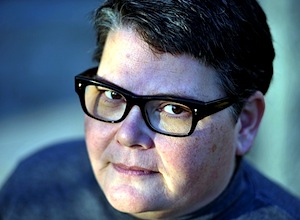 mother's
funeral — because she is a lesbian. mother's
funeral — because she is a lesbian.
The incident, which occurred on Saturday, came shortly after the Maryland
legislature sent a bill legalizing gay marriage to Gov. Martin O'Malley.
He is expected to sign it on Thursday.
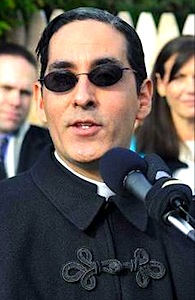
Barbara Johnson (left) told the Washington
Post that Father Marcel Guarnizo
(right) learned of her relationship with her partner of 19 years,
who was at the funeral on Saturday morning, shortly before the service.
But when the grieving art-studio owner went to take communion, he
covered the symbolic body of Christ.
"He
put his hand over the body of Christ and looked at me and said, 'I
can't give you Communion because you live with a woman and in the
eyes of the church, that is a sin," she
told the Post.
The
priest then refused to accompany Johnson and her mother's body to
the cemetery and instead she was told he was very ill.
|
| |
Pope
Presses U.S. Bishops on Message on Sex
By THE ASSOCIATED PRES: March 10, 2012
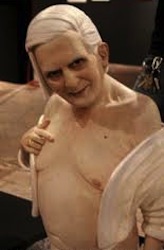 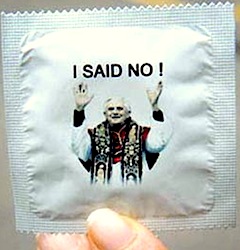 Vatican:
Pope Benedict XVI waded into the
American culture wars on Friday, urging visiting
American bishops to beef up their teaching about the evils of premarital
sex and cohabitation, and denouncing what he called the “powerful”
gay marriage lobby in America. Benedict said there was an urgent
need for American Catholics to discover the value of chastity, an
essential element of Christian teaching that he said had been subject
to unjust “ridicule.” The pope also told the bishops not
to back down in the face of “powerful
political and cultural currents seeking to alter the legal definition
of marriage.” Vatican:
Pope Benedict XVI waded into the
American culture wars on Friday, urging visiting
American bishops to beef up their teaching about the evils of premarital
sex and cohabitation, and denouncing what he called the “powerful”
gay marriage lobby in America. Benedict said there was an urgent
need for American Catholics to discover the value of chastity, an
essential element of Christian teaching that he said had been subject
to unjust “ridicule.” The pope also told the bishops not
to back down in the face of “powerful
political and cultural currents seeking to alter the legal definition
of marriage.”
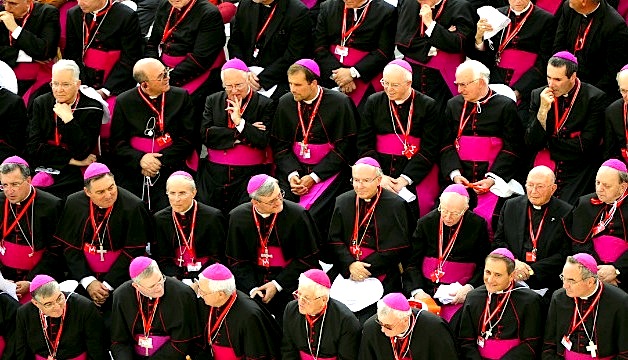
(Full
text)
|
| |
Back
to First Principles on Religious Freedom
By DOROTHY SAMUELS
The New York Times: February 25, 2012
Catholic
bishops, leading Republicans and other social conservatives persist
in portraying the Obama administration’s  new
rule requiring employer health plans to cover birth control without
a co-pay as an assault on religious freedom. new
rule requiring employer health plans to cover birth control without
a co-pay as an assault on religious freedom.
But the real departure from the Constitution
is their specious claim to a right to impose their religious views
on millions of Americans who do not share them. In essence,
the bishops and their allies are arguing that
they are above the law and their beliefs should be elevated over pressing
societal interests.
The rule does not interfere with church governance, prevent anyone
from voicing opposition, or force anyone to use contraceptives in
violation of religious beliefs.
|

MAUREEN
DOWD
|
Penn
State’s Culpability
EDITORIAL
The New York Times: November 8, 2011
The sex-abuse scandal that has threatened
the tenure of   Pennsylvania
State University’s legendary football coach, Joe
Paterno, and led to criminal charges against two high-level administrators
offers a tragic example of the willful blindness that sets in when
colleges worship
sports. Pennsylvania
State University’s legendary football coach, Joe
Paterno, and led to criminal charges against two high-level administrators
offers a tragic example of the willful blindness that sets in when
colleges worship
sports.
It is a mistake to think of this as malfeasance by a few people. The
scandal grows out of culture that seems to protect football at all costs.
|
Personal
Foul at Penn State
By MAUREEN DOWD: OP-ED COLUMNIST
The New York times: November 8, 2011
Like the Roman
Catholic Church, Penn State
is an arrogant institution hiding behind its mystique.
And sports, as my former fellow sports
columnist at The Washington Star, David Israel
says, is “an insular
world that protects its own, and operates outside of societal norms
as long as victories and cash continue to flow bountifully.”
Penn State rakes in $70 million a year from its football program. |
Paterno
Is Finished at Penn State, and President Is Out
By MARK VIERA
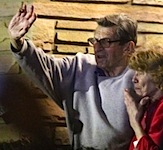 The New York Times: November 9, 2011
The New York Times: November 9, 2011
STATE
COLLEGE, Pa. — Joe Paterno, who
has the most victories of any coach in major college football history,
was fired by Penn State on Wednesday
night in the wake of a sexual abuse scandal involving
a prominent former assistant coach and the university’s failure
to act to halt further harm.
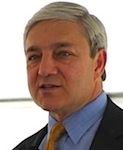 Graham
B. Spanier, one of the longest-serving and highest-paid university
presidents in the nation, who has helped raise the
academic profile of Penn State during his tenure,
was also removed by the Board of Trustees.
When the announcement was made at a news conference that the 84-year-old
Paterno would not coach another game, a gasp went up from the crowd
of several hundred reporters, students and Graham
B. Spanier, one of the longest-serving and highest-paid university
presidents in the nation, who has helped raise the
academic profile of Penn State during his tenure,
was also removed by the Board of Trustees.
When the announcement was made at a news conference that the 84-year-old
Paterno would not coach another game, a gasp went up from the crowd
of several hundred reporters, students and 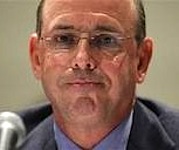 camera
people who were present. camera
people who were present.
“We thought that because of the
difficulties that engulfed our university, and they are grave, that
it is necessary to make a change in the leadership to set a course
for a new direction,” said John
Surma Jr., the vice chairman of the board.
The university’s most senior officials were clearly seeking
to halt the humiliating damage caused by the arrest last Saturday
of the former assistant coach, Jerry
Sandusky. Sandusky
had been a 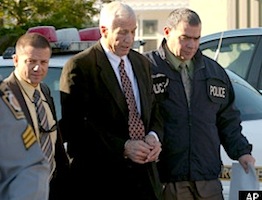 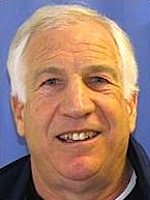 key
part of the football program, but prosecutors have said he was a serial
pedophile who was allowed to add victims over the years in part because
the university he had served was either unable or unwilling to stop
him. key
part of the football program, but prosecutors have said he was a serial
pedophile who was allowed to add victims over the years in part because
the university he had served was either unable or unwilling to stop
him.
Sandusky has been charged with sexually
abusing eight boys over a 15-year span, and two top university officials
— Tim Curley, the athletic director,
and Gary Schultz, the senior vice president
for finance and business — have been charged with perjury and
failing to report to authorities what they knew of the allegations.
Neither
Paterno nor Spanier was charged in the case.
Abuse
Inquiry Set Tricky Path for a Governor
By JO BECKER
The New York Times: November 10, 2011
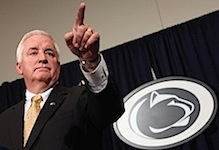 A
Roman Catholic, [Gov. Tom Corbett of Pennsylvania] was struck
early on in the Penn State investigation by the similarities between
the university’s failure to report allegations
of sexual abuse involving Mr. Sandusky and
the church’s failure to report pedophile priests, according
to several people who work with him. A
Roman Catholic, [Gov. Tom Corbett of Pennsylvania] was struck
early on in the Penn State investigation by the similarities between
the university’s failure to report allegations
of sexual abuse involving Mr. Sandusky and
the church’s failure to report pedophile priests, according
to several people who work with him.
|
|
Old
Main, Penn State |
St.
Peter's Basilica, Vatican |
|
The
Institutional Pass
By JOE NOCERA, OP-ED COLUMNIST
The New York Times: November 11, 2011
“Joe is a devout Catholic,”
a retired football coach named Vince
 McAneney
(below
right) told a reporter
the other day. He was referring, of course, to Joe
Paterno. McAneney
(below
right) told a reporter
the other day. He was referring, of course, to Joe
Paterno.
McAneney, 82, a
high school coaching legend in 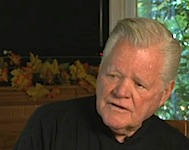 Pennsauken,
N.J., had known the 84-year-old Paterno for some 50 years, he told
Randy Miller of The Courier-Post in Cherry Hill, N.J., and was “heartbroken”
to see his friend fired as the Penn State football coach for his involvement
in the sexual abuse scandal that has so soiled the university. Describing
Paterno as a devout Catholic was McAneney’s
way of saying that his friend was still a good and decent man. Pennsauken,
N.J., had known the 84-year-old Paterno for some 50 years, he told
Randy Miller of The Courier-Post in Cherry Hill, N.J., and was “heartbroken”
to see his friend fired as the Penn State football coach for his involvement
in the sexual abuse scandal that has so soiled the university. Describing
Paterno as a devout Catholic was McAneney’s
way of saying that his friend was still a good and decent man.
But to someone like me, who grew up
in a Catholic household, the fact that Paterno was a regular churchgoer
is part of what makes his actions — or, more accurately, his
inaction — so inexplicable. By
March 1, 2002 — the date, according to a grand
jury report, that Jerry Sandusky, the former Paterno assistant, was
spotted in the locker-room shower raping a boy believed to be about
10 years old — every Catholic
was sadly familiar with the sex abuse scandal that had engulfed the
Roman Catholic Church. They knew that predatory
priests had taken advantage of their proximity and positions of trust
to sexually abuse young boys, just as Sandusky appears to have
done. They knew that church leaders had covered
it up. And they knew the devastating consequences of the abuse.
Two months before Sandusky’s alleged rape, The
Boston Globe had begun publishing its powerful series
on clergy sexual abuse. Dioceses were being sued by lawyers for the
victims, who, in turn, were coming forward to describe how the abuse
they suffered as children had shattered their lives. Alcoholism, drug
abuse, and depression were common themes.
More shocking yet, Catholics
in Paterno’s own diocese of Altoona-Johnstown, Pa., understood
these consequences long before the rest of the country. In
1987, Richard Serbin, an Altoona lawyer
representing abuse victims, had sued the diocese. The suit was widely
publicized in the local media — publicity that did not diminish
much even after he won in 1994 because the diocese kept appealing.
(It finally agreed to pay $3.7 million in 2004.)
One of the victims Serbin represented was a former altar boy in State
College — Penn State’s hometown.
Given that foreknowledge, how could Paterno, upon learning that one
of his graduate assistants allegedly had seen Sandusky having anal
sex with a preteen boy, content himself with mentioning it to his
superior and then looking the other way? How could
he have allowed Sandusky to maintain access to Penn State’s
football facilities? How could the university have let him continue
to run his youth camps on Penn State property — camps where
he no doubt scouted potential targets? Everyone
at Penn State who averted their eyes had to know they were doing something
abhorrent. They knew from the experience of their own community.
“College football and men’s
basketball has drifted so far away from the educational purpose of
the university,” James Duderstadt, a former
president of the University of Michigan, told me recently.
“They exploit young people and prevent them from getting a legitimate
college education. They place the athlete’s health at enormous
risk, which becomes apparent later in life. We are supposed to be
developing human potential, not making money on their backs. Football
strikes at the core values of a university.”
What
goes on in the typical big-time college football program constitutes
abuse of the athletes who play the game. It’s
not sexual abuse, to be sure, but it’s wrong just the same.
For 46 years, Joe Paterno averted his eyes to
the daily injustices, large and small, that his players suffered —
just like Nick Saban does at Alabama and Steve Spurrier at South Carolina,
and all the rest of them.
When
Paterno averted his eyes from Jerry Sandusky, he was just doing what
came naturally as a college football coach.
The
Devil and Joe Paterno
By ROSS DOUTHAT,
OP-ED COLUMNIST
The New York Times: November 12, 2011
WHEN
I think about the sins of Joe Paterno, and the ignominious  ending
of his long and famous career, I think about Darío
Castrillón Hoyos. ending
of his long and famous career, I think about Darío
Castrillón Hoyos.
Castrillón
is a Colombian, born in Medellín, who became
a Catholic priest and
then a bishop during the agony of  his
country’s drug-fueled civil wars. In Colombia, he was a remarkable
figure: a “rustic man with the profile of an eagle,” as
Gabriel García Márquez described him, who left his episcopal
residence at night to feed slum children, mediated between guerrillas
and death squads and reputedly made his way to Pablo Escobar’s
house disguised as a milkman to demand that the drug kingpin confess
his sins. his
country’s drug-fueled civil wars. In Colombia, he was a remarkable
figure: a “rustic man with the profile of an eagle,” as
Gabriel García Márquez described him, who left his episcopal
residence at night to feed slum children, mediated between guerrillas
and death squads and reputedly made his way to Pablo Escobar’s
house disguised as a milkman to demand that the drug kingpin confess
his sins.
But that isn’t how the world thinks
of him today. In the 1990s, Castrillón
was elevated to the College of Cardinals and placed in charge
of the Vatican’s Congregation for the
Clergy, where he came to embody the culture of denial that characterized
Rome’s initial response to the sex abuse crisis. Castrillón
dismissed the scandal as just “an American
problem,” he defended the church’s approach to
priestly pedophilia long after it had been revealed as pitifully inadequate,
and in 2001 he even praised a French bishop
for refusing to denounce an abusive priest to the civil authorities.
How did the man who displayed so much
moral courage in Colombia become the cardinal who was so morally culpable
in Rome? In the same way, perhaps, that
college football’s most admirable coach — a mentor
to generations of young men, a pillar of his Pennsylvania community
— could end up effectively washing his
hands of the rape of a young boy.
It was precisely because Castrillón
had served his church heroically, I suspect, that he was
so easily blinded to the reality of priestly sex abuse. It
was precisely because Joe Paterno had
done so much good for so long that he could
do the unthinkable, and let an alleged child rapist continue to walk
free in Penn State’s Happy Valley.
The best piece about
Darío Castrillón Hoyos was written by the Catholic
essayist John Zmirak, and his words apply to Joe Paterno
as well. Sins committed in the name
of a higher good, Zmirak
wrote, can “smell and look like lilies.
But they flank a coffin. Lying dead and stiff inside that box is natural
Justice ... what each of us owes the other in an unconditional debt.”
No higher
cause can trump that obligation — not
a church, and certainly not a football program. And not even a lifetime
of heroism can make up for leaving a single
child alone, abandoned to evil, weeping in the dark.
Bob
Schieffer on the fall of icons
By Bob Schieffer
CBS News: November 13, 2011
The fall of icons
are the stories that always hit us the hardest. 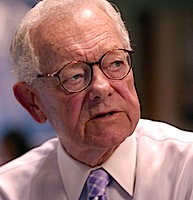 When
our heroes let us down, it forces us to question our own judgment
for elevating them in the first place. When
our heroes let us down, it forces us to question our own judgment
for elevating them in the first place.
So it was, when we learned that the legendary football coach Joe Paterno
and a lot of other people above and below him at Penn State either
looked the other way or, at worst, covered it up when they learned
that one of Paterno's top assistants was a child molestor.
We said what that kid said to Shoeless Joe Jackson, one of the players
accused of fixing the 1919 World Series: "Say it ain't so, Joe."
Shoeless Joe was a barely-literate man who claimed he was duped by
gamblers. But it is hard to believe
that anyone who had an inkling of what was going on at Penn State
didn't understand its significance.
But they had bigger fish to fly - protecting
a football program that brought millions of dollars and national attention
to their school.
Paterno was a great coach who now says his heart goes out to the young
victims, but it's a little too late for that.
As the Catholic Church learned,
when protecting the institution is put ahead of protecting those it
is intended to serve, it is eventually the institution that is put
at risk.
That is unfortunate, but let us remember those the institution forgot,
the victims - children who may have been scarred for life.
They deserve to know those who wronged them and those who knew about
it are being brought to justice.
And yes, that includes the icons.
(Full
text)
Sandusky
grand jury presentment
November 5, 2011
Re: VICTIM 1
“Sandusky took the boy to restaurants,
swimming at a hotel near Sandusky’s home
and to church.”
VATICAN,
take
heed!
This is how you do it right.
|
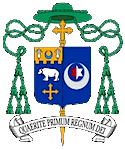
ARCHDIOCESE
of
KANSAS CITY
SAINT JOSEPH
|
In
Kansas City Churches, Tiptoeing Around the Latest Scandal
By A. G. SULZBERGER
The New York Times: October 16, 2011
KANSAS CITY, Mo. — The Rev. Justin
Hoye (left) was
struggling to figure 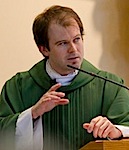 out
what, if anything, to say on Sunday to his parishioners at St.
Patrick’s Catholic Church about the new turmoil facing
the local Roman Catholic diocese. out
what, if anything, to say on Sunday to his parishioners at St.
Patrick’s Catholic Church about the new turmoil facing
the local Roman Catholic diocese.
Days before, news had broken that Bishop
Robert Finn and the diocese had
been indicted on criminal charges for failing to report a priest found
to have pornographic photos of children, including
children of his congregants. The priest is accused of having taken
more such photographs in the months before church leaders turned them
over to law enforcement.
Father Hoye, after reaching out to priests
in neighboring parishes 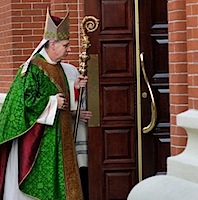 —
all of whom expressed the same uncertainty — decided not to
address the matter directly from the pulpit but to offer a homily
on man and God that emphasized forgiveness. —
all of whom expressed the same uncertainty — decided not to
address the matter directly from the pulpit but to offer a homily
on man and God that emphasized forgiveness.
The announcement on Friday that Bishop
Finn, of the Diocese of Kansas City-St. Joseph, had become
the highest ranking member of the clergy to be charged with a crime
stemming from the sex abuse scandals that have engulfed the church
has caused disappointment and anger in the Catholic
community here.
Nowhere is that more true than at St.
Patrick’s, where the former 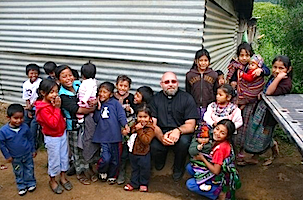 pastor,
the Rev. Shawn Ratigan, was once well-regarded
for his easy manner, fondness for children and the camera that he
always brought to events at the church and the parish
elementary school. pastor,
the Rev. Shawn Ratigan, was once well-regarded
for his easy manner, fondness for children and the camera that he
always brought to events at the church and the parish
elementary school.
Not long ago, Bishop Finn stood in this
church asking for forgiveness. Much of the anguish,
then and now, concerned the decision not to inform law enforcement
— or the parents here — about Father Ratigan even after
the school principal had written a letter detailing concerns that
the priest’s behavior fit the profile of a child predator, 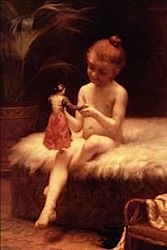 even
after church officials in December discovered
hundreds of photographs on his computer that included
nude pictures and “upskirt images” of even
after church officials in December discovered
hundreds of photographs on his computer that included
nude pictures and “upskirt images” of 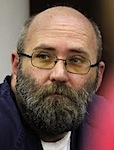 girls,
and even after he attempted suicide. girls,
and even after he attempted suicide.
Instead Father Ratigan was sent to live
in a convent and told to avoid contact with minors. But he continued
to attend children’s parties, spend weekends in the homes of
parish families and, with the bishop’s permission, presided
at a girl’s first communion, according to interviews
and court documents. Despite
a pledge by the diocese to immediately report anyone suspected of
being a pedophile to law enforcement, Father Ratigan was not reported
until May.
The
congregants here, who had been
told that Father Ratigan had left after an illness, were
shocked when he was arrested and charged with child pornography.
In an evening service at the gold-domed Cathedral
of the Immaculate Conception, Bishop
Finn urged worshipers to keep the diocese together and to avoid
discouragement. He made oblique reference to “the
events unfolding last Friday.”
“There
is not so much that I can say, I know you understand that,”
he said.
“But it is enough to be here with you, whom I love.”
Above
right: "Waiting for the Bath"
Paul Peel (1860 – 1892) Canadian painter
Kansas
City Bishop Makes Deal to Avoid More Criminal Charges
By A. G. SULZBERGER and LAURIE GOODSTEIN
The New York Times: November 15, 2011
KANSAS CITY, Mo. — In a deal to
avoid a second round of criminal charges, a Roman Catholic bishop
in Kansas City has agreed to meet monthly with a county prosecutor
to detail every suspicious episode involving abuse of a child in his
diocese for the next five years.
The agreement announced
on Tuesday between Bishop Robert W.
Finn  of
the Diocese of Kansas City-St. Joseph and the prosecuting
attorney of neighboring Clay County, Daniel
White, leaves the bishop open to prosecution
for misdemeanor charges for five years, if he does not continue to
meet with the prosecutor and report all episodes. But victims’
advocates criticized the deal as cozy and ineffectual, compared with
previous agreements between bishops and prosecutors. of
the Diocese of Kansas City-St. Joseph and the prosecuting
attorney of neighboring Clay County, Daniel
White, leaves the bishop open to prosecution
for misdemeanor charges for five years, if he does not continue to
meet with the prosecutor and report all episodes. But victims’
advocates criticized the deal as cozy and ineffectual, compared with
previous agreements between bishops and prosecutors.
|

DIOCESE
of
BROOKLYN
|
Teenage
Boy Levels Abuse Claim Against Longtime Brooklyn Monsignor
Thomas Brady, 77, Out On $1,000 Bail
Parishioners: No Way This Happened
CBS News: October 14, 2011
NEW YORK — A Brooklyn monsignor was arrested Friday and accused
 of
having sexual contact with a 13-year-old boy. of
having sexual contact with a 13-year-old boy.
Monsignor Thomas Brady’s
family tried to shield him from view on the way into court Friday
night, but there is no hiding from the reality of the criminal charges
he faces stemming from an alleged encounter with a teen boy.
There was disbelief at the news the longtime former pastor
of Good Shepherd Catholic Church had
been arrested.
“I’m shocked,” one Marine Park resident told CBS
2’s Lou Young. “Somewhere along the way I think
it’s erroneous.”
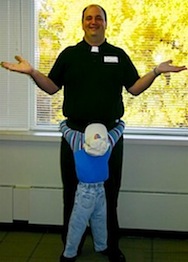 “This is ridiculous. It’s a crazy story.
Who started it?” parishioner John
Sweeney said,
“This is ridiculous. It’s a crazy story.
Who started it?” parishioner John
Sweeney said,  adding
when asked if Brady is a good man, “absolutely. There’s
no better. adding
when asked if Brady is a good man, “absolutely. There’s
no better.
"The kids hug him all the time."
...the Brooklyn diocese confirmed that two
minors have leveled abuse claims against him, though
he has been formally changed for his alleged involvement with just
one.
Brady’s nephew, Dave
Konig, told Young the old priest, who was released
Friday night on $1,000 bail, has succumbed
to dementia brought by his many illnesses.
The arraignment took place in Brooklyn
court, but District
Attorney Charles Hynes has asked for a special prosecutor because
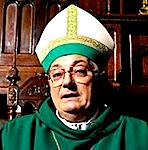 he
knows Brady personally and said his office cannot impartially handle
the case. he
knows Brady personally and said his office cannot impartially handle
the case.
The Brooklyn diocese has placed Brady on administrative
leave during the investigation. Bishop
Nicholas DiMarzo (left) offered
prayers Friday for the victims of misconduct as well as for
Monsignor Brady.
|
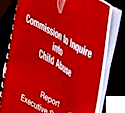
CLOYNE
REPORT
|
Vatican
Rebukes Ireland Over Claims on Sexual Abuse
By RACHEL DONADIO
The New York Times: September 3, 2011
VATICAN CITY — In a strong rebuke
to the Irish government, the Vatican
said Saturday that it had never discouraged Irish bishops from reporting
the sexual abuse of minors to the police and dismissed claims that
it had undermined efforts to investigate abuse as “unfounded.”
The statement was the latest salvo in a tense diplomatic standoff
since the Irish government released a report in July accusing the
Vatican of encouraging bishops to ignore guidelines requiring them
to report abuse cases to civil authorities.
Days later, Prime Minister Enda Kenny
(right) assailed
the Vatican as 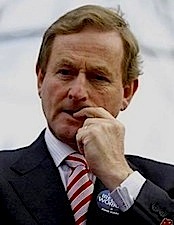 having
tried to block an inquiry into sexual abuse by priests and placing
its interests ahead of protecting children. The speech
led the Vatican to recall its ambassador. having
tried to block an inquiry into sexual abuse by priests and placing
its interests ahead of protecting children. The speech
led the Vatican to recall its ambassador.
In its first public statement on the
issue since then, the Vatican said Saturday that it
“understands and shares the depth of public anger and frustration
at the findings” of the July report, “which found expression
in the speech” by Mr. Kenny. But it said both the report
and the speech hinged on a “misinterpretation”
of an important letter.
The Vatican
also dismissed as “unfounded”
a statement by the Irish Parliament that the Vatican’s
intervention “contributed to the undermining of the child protection
framework and guidelines of the Irish state and Irish bishops.”
The July report, the
fourth in a series of scathing Irish government reports into
sexual abuse by priests and evidence of a widespread cover-up, found
that clergy members in the rural diocese of Cloyne
had not acted on complaints against 19 priests from 1996 to as recently
as 2009. The guidelines adopted by Irish bishops in 1996 required
that abuse cases be reported to the police.
The report pointed a finger at Rome
for encouraging bishops to ignore the reporting guidelines.
The report cited a confidential letter
to the bishops of Ireland from the Vatican ambassador in 1997, in
which he said that he had “serious reservations” about
the child-protection guidelines, and that they violated canon law.
The Vatican also dismissed as “unsubstantiated” Mr. Kenny’s
assertions that the Vatican had tried to “frustrate an inquiry”
into the sexual abuse scandal.
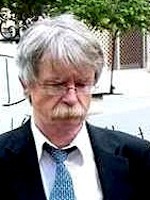 Terrance
McKiernan (right),
the president of Bishop Accountability,
which monitors sexual abuse cases in the Catholic Church, said that
the Vatican’s response “shows that
the Vatican is still in denial.” Terrance
McKiernan (right),
the president of Bishop Accountability,
which monitors sexual abuse cases in the Catholic Church, said that
the Vatican’s response “shows that
the Vatican is still in denial.”
The Irish Parliament is now debating a controversial law that would
make failure to report allegations of abuse to civil authorities punishable
with jail time.
Diplomatic
Tensions With Vatican Grow
By DOUGLAS DALBY
The New York Times: September 5, 2011
Ireland - The diplomatic rift between
the Irish government and 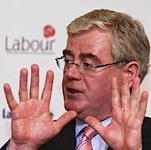 the
Vatican deepened Monday after Ireland accused the Holy See of “missing
the point” in a weekend statement defending its conduct in the
sexual abuse scandals involving priests. The
Irish foreign minister, Eamon Gilmore (right),
said the government was holding firm to its
claims that the Vatican had attempted to frustrate an inquiry
into abuse in the Diocese of Cloyne as
recently as three years ago. The Vatican, in a strongly
worded report on Saturday, said there was “no evidence”
to support such an accusation. the
Vatican deepened Monday after Ireland accused the Holy See of “missing
the point” in a weekend statement defending its conduct in the
sexual abuse scandals involving priests. The
Irish foreign minister, Eamon Gilmore (right),
said the government was holding firm to its
claims that the Vatican had attempted to frustrate an inquiry
into abuse in the Diocese of Cloyne as
recently as three years ago. The Vatican, in a strongly
worded report on Saturday, said there was “no evidence”
to support such an accusation.
|
 ARCHDIOCESE
ARCHDIOCESE
of
KANSAS CITY
SAINT JOSEPH |
Diocese’s
Lawyers Say It Broke Rules
THE ASSOCIATED PRESS: September 1, 2011
 Missouri
- A Kansas City law firm hired by the Roman
Catholic Diocese of Kansas City-St. Joseph said the diocese
failed to follow its own policies in responding to sexual abuse claims
against priests. The firm of Graves Bartle Marcus
& Garrett issued its findings Thursday
after investigating the diocese’s response to accusations
against two priests. The Rev. Michael
Tierney (left) Missouri
- A Kansas City law firm hired by the Roman
Catholic Diocese of Kansas City-St. Joseph said the diocese
failed to follow its own policies in responding to sexual abuse claims
against priests. The firm of Graves Bartle Marcus
& Garrett issued its findings Thursday
after investigating the diocese’s response to accusations
against two priests. The Rev. Michael
Tierney (left)  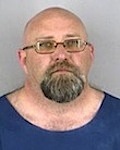 was
accused of sexually abusing minors in the early 1970s, and the Rev.
Shawn Ratigan (right)
is facing state and federal charges accusing him of taking pornographic
pictures of young girls. The law firm
recommends, among other things, that any employee or volunteer who
receives a report of abuse must report it immediately to law enforcement
or the state. was
accused of sexually abusing minors in the early 1970s, and the Rev.
Shawn Ratigan (right)
is facing state and federal charges accusing him of taking pornographic
pictures of young girls. The law firm
recommends, among other things, that any employee or volunteer who
receives a report of abuse must report it immediately to law enforcement
or the state.
(Full
text)
|
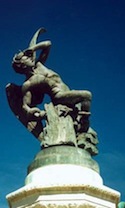
EL
ÁNGEL CAÍDO
The Fallen Angel
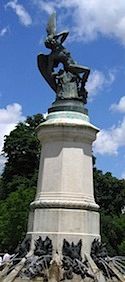
El
Parque del Buen Retirro,
where 200
portable confessional booths have been installed in the shadows of
what Madrileños boast is the only monument to
SATAN
in the world
15 East 10th Street
New York NY 10003
|
Catholic
Clergy Protest Pope’s Visit, and Its Price Tag
By SUZANNE DALEY
Published: August 15, 2011
MADRID — The Rev.
Eubilio Rodríguez’s church is a prefabricated
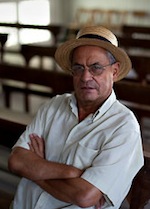 building
in an area of this city hard hit by Spain’s economic crisis.
In front of the altar are a few scraggly potted plants. Behind it,
some plastic chairs. building
in an area of this city hard hit by Spain’s economic crisis.
In front of the altar are a few scraggly potted plants. Behind it,
some plastic chairs.
How, he asks, can the Roman Catholic Church
be getting ready for a lavish $72 million celebration
in this city — some of it paid for with
tax dollars — when Spain is in the midst of an austerity
drive, the unemployment rate for young people
is 40 percent and his parishioners are losing their homes to
foreclosure every day?
“It is scandalous, the price,”
he said. “It is shameful. It discredits the church.”
Father Rodríguez, 67, is among the 120 clergymen working among
the poor here who have signed a lengthy
petition deploring the pope’s visit this week on many grounds
— from its cost to what they see as an
inappropriate melding of church and state.
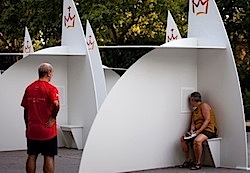 Madrid
is girding itself for the arrival of perhaps one and a half million
pilgrims. Its lampposts are gaily decorated with banners.
Retiro Park
has been decked out with 200 portable confessional
booths. But bitter
debates are raging over the festivities and the
role of the church in Spanish politics. Madrid
is girding itself for the arrival of perhaps one and a half million
pilgrims. Its lampposts are gaily decorated with banners.
Retiro Park
has been decked out with 200 portable confessional
booths. But bitter
debates are raging over the festivities and the
role of the church in Spanish politics.
Government and church officials insist the cost to taxpayers will
be minimal and the lift to local businesses substantial.
But critics are calling the claims ridiculous. Father
Rodríguez and others who signed the 10-page petition say the
costs are always fuzzy when the pope comes to town.
They suspect that the cost of extra security, of collecting trash
and of stress on health systems will add up to millions for taxpayers.
For one thing, the
pilgrims have been granted an 80 percent discount on public transportation,
which some find particularly galling because subway
fares just went up by 50 percent.
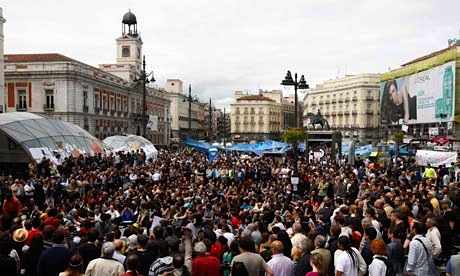
Recent
protest over economic conditions at Madrid's Puerta del Sol Square
|

ARCHDIOCESE
of
KANSAS CITY
SAINT JOSEPH
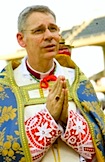
BISHOP
ROBERT FINN
|
Bishop
in Missouri Waited Months to Report Priest, Stirring Parishioners’
Rage
By LAURIE GOODSTEIN
The New York Times: August 15, 2011
In the annals of the sexual abuse scandals
in the Roman Catholic Church, most of the cases that have come
to light happened years before to children and teenagers who have long
since grown into adults.
 But
a painfully fresh case is devastating Catholics in Kansas City, Mo.,
where a priest, who was arrested in May, has been indicted by a federal
grand jury on charges of taking indecent photographs
of young girls, most recently during an Easter egg hunt just four months
ago. But
a painfully fresh case is devastating Catholics in Kansas City, Mo.,
where a priest, who was arrested in May, has been indicted by a federal
grand jury on charges of taking indecent photographs
of young girls, most recently during an Easter egg hunt just four months
ago.
Bishop Robert Finn of the Diocese of Kansas
City-St. Joseph has acknowledged
 that
he knew of the existence of photographs last December but did not turn
them over to the police until May. that
he knew of the existence of photographs last December but did not turn
them over to the police until May.
A civil lawsuit filed last week claims
that during those five months, the priest, the Rev. Shawn Ratigan, attended
children’s birthday parties, spent weekends in the homes of parish
families, hosted the Easter egg hunt and presided, with the bishop’s
permission, at a girl’s First Communion.
“All these parishioners just feel so betrayed, because we knew
nothing,” said Thu Meng, whose daughter attended the preschool
in Father Ratigan’s last parish. “And
we were welcoming this guy into our homes, asking him to come bless
this or that. They saw all these signs, and they didn’t do anything.”
The case has generated fury
at a bishop who was already a 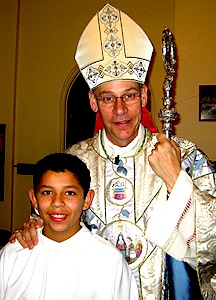 polarizing
figure in his diocese, and there are widespread calls for him to resign
or even to be prosecuted. Parishioners started a facebook
page called “Bishop
Finn Must Go” and are circulating a
petition. An editorial in The Kansas City
Star in June calling for the bishop to step down concluded that prosecutors
must “actively pursue all relevant criminal
charges” against everyone involved. polarizing
figure in his diocese, and there are widespread calls for him to resign
or even to be prosecuted. Parishioners started a facebook
page called “Bishop
Finn Must Go” and are circulating a
petition. An editorial in The Kansas City
Star in June calling for the bishop to step down concluded that prosecutors
must “actively pursue all relevant criminal
charges” against everyone involved.
Stoking much of the anger is the fact that only three years ago, Bishop
Finn settled lawsuits with 47 plaintiffs in sexual abuse cases for $10
million and agreed to a long list of preventive measures,
among them to immediately report anyone suspected of being a pedophile
to law enforcement authorities.
 Michael
Hunter, an abuse victim who was part of that settlement and is
now the president of the Kansas City chapter of the Survivors
Network of those Abused by Priests,
said: “There were 90 nonmonetary
agreements that the diocese signed on to, and they were things like
reporting immediately to the police. And they didn’t do it. That’s
really what sickens us as much as the abuse.” Michael
Hunter, an abuse victim who was part of that settlement and is
now the president of the Kansas City chapter of the Survivors
Network of those Abused by Priests,
said: “There were 90 nonmonetary
agreements that the diocese signed on to, and they were things like
reporting immediately to the police. And they didn’t do it. That’s
really what sickens us as much as the abuse.”
Bishop Finn, who was appointed
in 2005, alienated many of his priests and parishioners, and won praise
from others, when he remade the diocese
to conform with his traditionalist theological views.
He is one of few bishops affiliated with the conservative 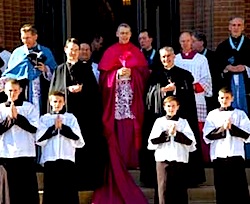  movement
Opus Dei. movement
Opus Dei.
He canceled a model program to train Catholic
laypeople to be leaders and hired more staff members to recruit candidates
for the priesthood. He cut the budget of the Office of Peace and Justice,
which focused on poverty and human rights, and created a new Respect
Life office to expand the church’s opposition to abortion and
stem cell research.
Father Ratigan, 45, was
also an outspoken conservative, according to a profile
in The Kansas City Star.
The diocese was first warned about Father
Ratigan’s inappropriate interest in young girls as far back as
2006, according to accusations in the civil lawsuit
filed Thursday. But there were also more
recent warnings.
In May 2010, the principal of a Catholic
elementary school where 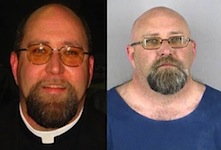 Father
Ratigan (right) worked hand-delivered a letter to the vicar general
reporting specific episodes that had raised alarms:
the priest put a girl on his lap during
a bus ride and allowed children to reach into his pants pockets for
candy. When a Brownie troop visited Father Ratigan’s house, a
parent reported finding a pair of girl’s panties in a planter,
the letter said. Father
Ratigan (right) worked hand-delivered a letter to the vicar general
reporting specific episodes that had raised alarms:
the priest put a girl on his lap during
a bus ride and allowed children to reach into his pants pockets for
candy. When a Brownie troop visited Father Ratigan’s house, a
parent reported finding a pair of girl’s panties in a planter,
the letter said.
|
|
New
York Archdiocese Criticizes Sex-Ed Mandate
By ANNA M. PHILLIPS
The New York Times: August 11, 2011
The Roman Catholic Archdiocese of New
York called a new city
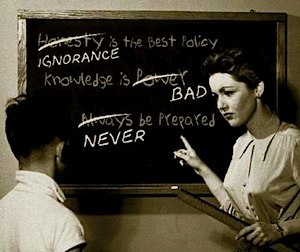 requirement
that sex education be taught at all public
middle and high schools “troubling”
on Wednesday, and some Catholic officials said
they would advise Catholic parents not to let their children participate. requirement
that sex education be taught at all public
middle and high schools “troubling”
on Wednesday, and some Catholic officials said
they would advise Catholic parents not to let their children participate.
In the first serious challenge to the city’s mandate, which was
announced on Tuesday, a spokesman for
the archdiocese said the church’s position was that parents,
not the schools, should educate children about sex.
 “Parents have the right and the
responsibility to be the first and primary educators of their children,”
Joseph
Zwilling, director of communications for the archdiocese,
wrote in a statement. “This mandate
by the city usurps that role, and allows the public
school system to substitute its beliefs and values for those
of the parents.”
“Parents have the right and the
responsibility to be the first and primary educators of their children,”
Joseph
Zwilling, director of communications for the archdiocese,
wrote in a statement. “This mandate
by the city usurps that role, and allows the public
school system to substitute its beliefs and values for those
of the parents.”
The sex-education
curriculum — packages of lesson plans titled 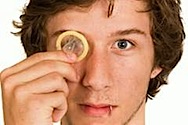 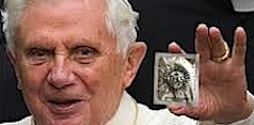 HealthSmart
and Reducing the Risk — describes
abstinence as the best method to avoid pregnancy and sexually transmitted
diseases. It includes
lessons on how to use a condom and discussions about the appropriate
age for sexual activity. HealthSmart
and Reducing the Risk — describes
abstinence as the best method to avoid pregnancy and sexually transmitted
diseases. It includes
lessons on how to use a condom and discussions about the appropriate
age for sexual activity.
Edward Mechmann,
a lawyer for the archdiocese, said he objected 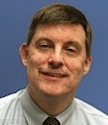 to
the “overall lesson” of the
city’s program, “that abstinence is
a nice ideal.” to
the “overall lesson” of the
city’s program, “that abstinence is
a nice ideal.”
Mr. Mechmann said he would encourage parents
to exercise an opt-out clause and exclude their children from lessons
about contraception. “I’d
also insist that parents inspect the materials to make sure there’s
nothing really offensive or inaccurate being put in there,”
he said. “We don’t say that about cigarettes,” he
added. “We don’t say, here’s a filtered cigarette
— it’s better than Camel.”
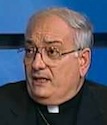
Nicholas A. DiMarzio,
the bishop of Brooklyn, said he planned to work
with Catholic parents across the city to “assert their parent
rights on this issue.” Some public schools
that rent space from the church could have to find new locations in
which to teach the required courses.
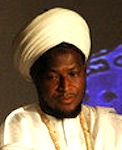 Souleimane
Konaté, an imam who is the head
of the Masjid Aqsa mosque in Harlem, said
he was in favor of the requirement. Souleimane
Konaté, an imam who is the head
of the Masjid Aqsa mosque in Harlem, said
he was in favor of the requirement.
“I think it’s a good idea,”
he said. “I do talk about it sometimes,
but people look at me like I’m crazy because the imams
aren’t supposed to talk about it. It’s taboo in my
community. But if somebody is doing it for me,
I would support them 100 percent.”
“I don’t agree with it, because
I think parents should teach their children at their own discretion,”
said Lucy Accardo, the mother
of four children and a
member of the Community Education Council for District 24. |
|
Order
Dismisses a Priest Trying to Ordain Women
By LAURIE GOODSTEIN
The New York Times: August 8, 2011
The Rev. Roy Bourgeois,
who refused to renounce his increasingly 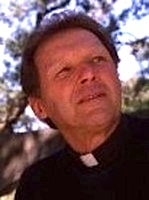 public
campaign to see women ordained as priests
in the Roman Catholic Church, has been
notified of his dismissal by his religious order, the Maryknoll
Fathers and Brothers. public
campaign to see women ordained as priests
in the Roman Catholic Church, has been
notified of his dismissal by his religious order, the Maryknoll
Fathers and Brothers.
A letter to Father Bourgeois, signed
by the superior general and the general secretary of the Maryknoll
order in the United States, said the dismissal was necessary because
of his “defiant stance” in
opposition to church teaching.
“Your numerous public statements
and appearances 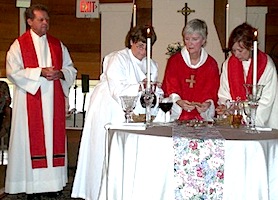 in
support of the women’s priests movement continues to create
in the minds of many faithful the view that your position is acceptable
to our Church,” the letter said, adding that Father
Bourgeois had caused the church “grave scandal.” in
support of the women’s priests movement continues to create
in the minds of many faithful the view that your position is acceptable
to our Church,” the letter said, adding that Father
Bourgeois had caused the church “grave scandal.”
“They
want two words: I recant,” Father
Bourgeois said. “And they can’t
get that out of me. For me, the real
scandal is the message we are sending to women: you’re not equal,
you cannot be priests, you’re not worthy.”
Priest
for Women’s Ordination Fights His Dismissal
By LAURIE GOODSTEIN
The New York Times: August 11, 2011
A
Roman Catholic priest who is campaigning to open the priesthood 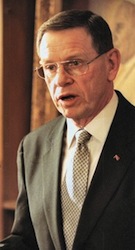 to
women says he will contest a move by his religious order to dismiss
him for his dissent. The priest, the
Rev. Roy Bourgeois, said he had retained
the Rev. Thomas Doyle (right), a canon
lawyer best known as a whistleblower in the priest sexual abuse scandal,
to press the case with the to
women says he will contest a move by his religious order to dismiss
him for his dissent. The priest, the
Rev. Roy Bourgeois, said he had retained
the Rev. Thomas Doyle (right), a canon
lawyer best known as a whistleblower in the priest sexual abuse scandal,
to press the case with the 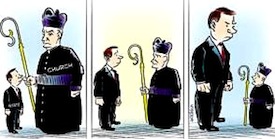 Maryknoll
Fathers and Brothers. Father
Doyle said he would argue that Father Bourgeois had
a right to follow his conscience, and that the prohibition on women’s
ordination was not an infallible church teaching, despite Vatican
declarations. A Maryknoll spokesman said its
general council would decide the next step. Maryknoll
Fathers and Brothers. Father
Doyle said he would argue that Father Bourgeois had
a right to follow his conscience, and that the prohibition on women’s
ordination was not an infallible church teaching, despite Vatican
declarations. A Maryknoll spokesman said its
general council would decide the next step.
(Full
text)
|
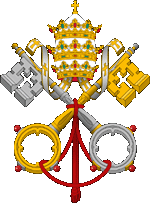
PAPAL
SEAL
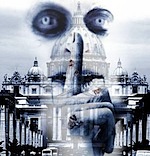
PAPAL SILENCE

DIOCESE
of
CLOYNE
|
Vatican
Recalls Ambassador to Ireland
Over Abuse Report
By RACHEL DONADIO
The New York Times: July 26, 2011
ROME —
The Vatican recalled its ambassador
to Ireland on Monday, 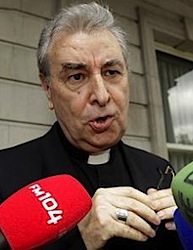 citing
reaction to a recent Irish government report that said the Vatican
had discouraged efforts by bishops to report cases of sexual abuse
to the police. citing
reaction to a recent Irish government report that said the Vatican
had discouraged efforts by bishops to report cases of sexual abuse
to the police.
A spokesman for the Vatican said the
recall of the nuncio, Archbishop Giuseppe Leanza
(left),
was a rare move that “denoted the seriousness
of the situation,” as well the
Holy See’s “will to deal with it
with objectivity and determination.”
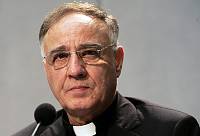 The
spokesman, the Rev. Ciro Benedettini (right),
told reporters that the archbishop would return to Rome to consult
with Vatican officials who are preparing the Holy See’s official
response to the Irish government on the report,
but added that the decision “does
not exclude some degree of surprise and disappointment at certain
excessive reactions.” The
spokesman, the Rev. Ciro Benedettini (right),
told reporters that the archbishop would return to Rome to consult
with Vatican officials who are preparing the Holy See’s official
response to the Irish government on the report,
but added that the decision “does
not exclude some degree of surprise and disappointment at certain
excessive reactions.”
T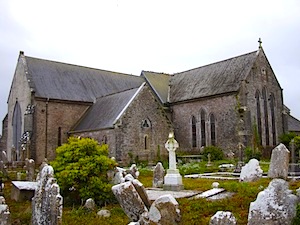 he
government report, conducted by an independent investigative committee
and released July 13, found that clergy
members in the rural Irish diocese of Cloyne
(Cathedral left)did
not act on complaints against 19 priests from 1996 to as recently
as 2009. More damningly, it said that the
Vatican had encouraged bishops to ignore child-protection guidelines
adopted by Irish bishops in 1996 that included “mandatory reporting”
of abuse to the civil authorities. he
government report, conducted by an independent investigative committee
and released July 13, found that clergy
members in the rural Irish diocese of Cloyne
(Cathedral left)did
not act on complaints against 19 priests from 1996 to as recently
as 2009. More damningly, it said that the
Vatican had encouraged bishops to ignore child-protection guidelines
adopted by Irish bishops in 1996 that included “mandatory reporting”
of abuse to the civil authorities.
The report caused a firestorm in Ireland,
a country long dominated by the church. For
the first time Irish lawmakers aimed their ire at the Vatican
directly, and not at local church leaders.
Last week, the Irish prime minister,
Enda Kenny, denounced “the
dysfunction, disconnection, elitism and the narcissism that dominate
the culture of the Vatican to this day,” in a speech
that 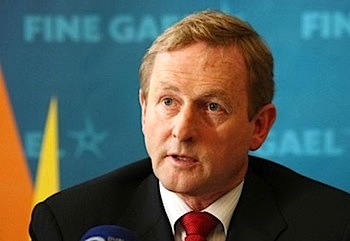 represented
the government’s sharpest-ever direct
attack on the Roman Catholic leadership. represented
the government’s sharpest-ever direct
attack on the Roman Catholic leadership.
The prime minister told Parliament
last week, “The
rape and torture of children were downplayed or ‘managed’
to uphold instead, the primacy of the institution, its power, standing
and ‘reputation.’ ” Mr. Kenny added that
the Vatican had not listened “to evidence
of humiliation and betrayal” with compassion, but
had instead chosen “to parse and analyze it with the gimlet
eye of a canon lawyer.” The Irish
Parliament also passed a motion denouncing
the Vatican’s role in “undermining child-protection frameworks.”
|

MAUREEN
DOWD
|
The
End of Awe
By MAUREEN DOWD, OP-ED
COLUMNIST
The New York Times: July 24, 2011
 
WEDNESDAY
found both the British prime minister
and the Irish taoiseach passionately
addressing their parliaments about the demystified
lords of their universes.
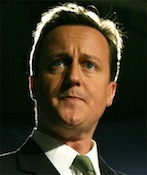 Frantically
distancing himself from the pope of Fleet Street,
David Cameron
conceded that he should not have ignored
warnings from the palace and elsewhere against bringing a capo from
the sulfurous Murdoch gang into his inner circle. Frantically
distancing himself from the pope of Fleet Street,
David Cameron
conceded that he should not have ignored
warnings from the palace and elsewhere against bringing a capo from
the sulfurous Murdoch gang into his inner circle.
Across the Irish Sea
in Dublin, Enda Kenny took on the actual
pope, making a blazing speech about the Vatican’s
unconscionable behavior in the pedophilia scandal.
After 17 years of revolting revelations, Kenny
said the latest report on the Cloyne
diocese in County Cork exposed
“an attempt by the Holy See to frustrate
an inquiry in a sovereign, democratic republic as little as three
years ago, not three decades ago.”
The report, he said, “excavates
the dysfunction, disconnection, elitism, the narcissism that dominate
the culture of the Vatican to this day. The rape and torture of children
were downplayed or ‘managed’ to uphold, instead, the primacy
of  the
institution, its power, standing and ‘reputation.’ the
institution, its power, standing and ‘reputation.’
“Far from listening to evidence of humiliation
and betrayal with St. Benedict’s ‘ear of the heart,’
the Vatican’s reaction was to parse and analyze it with the
gimlet eye of a canon lawyer. This calculated, withering position
being the polar opposite of the radicalism, humility and compassion
upon which the Roman church was founded.”
Pulling back the curtain to expose the
profane amid the sacred would have been remarkable coming from
any leader in one of the many countries scarred by
pedophile priests, but from the devoutly Catholic prime minister
of a nation whose constitution once enshrined the special position
of the church, it was breathtaking.
The Irish were taken aback by the ire
of the ordinarily amiable, soft-spoken Kenny, the
longest-serving parliamentarian in the land. In
his first few months as Taoiseach, the
60-year-old had not given any sign that he could throw such Zeus-style
thunderbolts.
But bankrupt and battered Eire, which needed a shot of muscular national
pride, was thrilled with his emphatic articulation of their revulsion
at the tragedy, and his assertion of Ireland
as a sovereign republic not under the thumb of Rome.
“If you look at some of his predecessors,
going right back 50 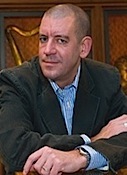 years,
they would have been very much of the view that they were Catholics
first and politicians second,” said Diarmaid
Ferriter, a professor of modern Irish history at University
College Dublin. years,
they would have been very much of the view that they were Catholics
first and politicians second,” said Diarmaid
Ferriter, a professor of modern Irish history at University
College Dublin.
Ferriter observed:
“There has been this very obvious and planned and hugely arrogant
policy of obfuscation and deliberate delaying tactics and complete
avoidance of responsibility on the part of the Vatican. They
were actually treating the sovereign government of Ireland with complete
contempt.”
He
added:
“We’re
fed up with hearing about canon law. This is a Republic, it’s
about civil law.”

Garry O’Sullivan,
the editor of The Irish Catholic, compared
the resonance of the speech to the French revolution, without the
violence. “The French Republic didn’t
kick out the Catholic Church, but they set up a French Catholic Church
and kicked out Rome,” he said. “Kenny has tapped
into a vein in the Irish psyche, people saying, ‘Well
done for standing up to those bloody bishops and the pope.’
It was lancing a boil.”
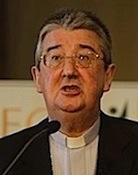 Diarmuid
Martin, the archbishop of Dublin, who
has been frozen out by the Vatican and his fellow Irish bishops for
his tender solicitude toward abuse victims, teared up on Irish
TV talking about Kenny’s cri de coeur. Diarmuid
Martin, the archbishop of Dublin, who
has been frozen out by the Vatican and his fellow Irish bishops for
his tender solicitude toward abuse victims, teared up on Irish
TV talking about Kenny’s cri de coeur.
What church “cabal”
is this in the Vatican or Ireland, he asked, “who
try to undermine what is being done, or simply refuse to understand
what is being done?”
It
is stirring to watch people who have long been cowed finally speaking
up, shedding their fear of the authoritarian men at the top who owed
their power to the awe of the people.
|

ARCHDIOCESE
of
PHIDELPHIA
|
Philadelphia’s
Cardinal Retires Amid Scandal
By ERIK ECKHOLM and KATHARINE Q. SEELYE
The New York Times: July 19, 2011
Pope Benedict XVI
accepted the resignation of Cardinal Justin 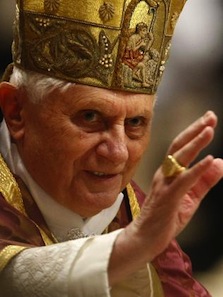 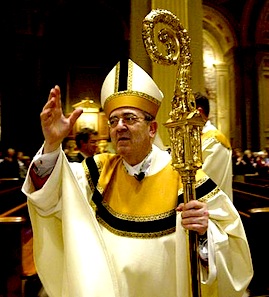 Rigali,
the Roman Catholic leader of Philadelphia, on the grounds that he had
reached the retirement age of 75, the Vatican said in
a statement on Tuesday, some five months after the
city’s 1.5 million-member archdiocese was convulsed by evidence
that officials had ignored sexual-abuse charges
against dozens of active priests. Rigali,
the Roman Catholic leader of Philadelphia, on the grounds that he had
reached the retirement age of 75, the Vatican said in
a statement on Tuesday, some five months after the
city’s 1.5 million-member archdiocese was convulsed by evidence
that officials had ignored sexual-abuse charges
against dozens of active priests.
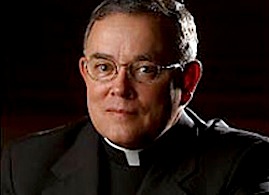 The
Vatican confirmed that Cardinal Rigali would be succeeded by Archbishop
Charles Chaput of Denver, 66, a Native American who
is known for his aggressive public opposition to abortion and same-sex
marriage, according to people familiar with the plans. The
Vatican confirmed that Cardinal Rigali would be succeeded by Archbishop
Charles Chaput of Denver, 66, a Native American who
is known for his aggressive public opposition to abortion and same-sex
marriage, according to people familiar with the plans.
Although perhaps seen as inevitable after the grand jury investigation
in Philadelphia, the resignation of Cardinal Rigali, who is now 76,
is significant, Vatican experts said, because he
had been seen as a consummate church insider and one of the most powerful
Americans to serve in the Roman Curia.
Last year, Cardinal Rigali submitted the
standard letter of resignation when he turned 75, the
customary retirement age for 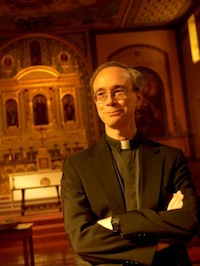 bishops,
although some have served beyond the age of 75. His
resignation is being accepted only now. bishops,
although some have served beyond the age of 75. His
resignation is being accepted only now.
“Because he’s over 75, you can’t make the case that
he resigning because of the scandals,” said the
Rev. Thomas J. Reese,
a senior fellow at the Woodstock Theological Center at Georgetown University
and a Jesuit priest. “Certainly,
the Vatican never wants to give the appearance of having someone resign
under pressure.”
But
Cardinal Rigali’s tenure in Philadelphia
will inevitably be linked to the mishandling of sexual-abuse cases,
which had gone on for decades but erupted this year into what Father
Reese called “a disaster for the church.” |

DIOCESE
of
CLOYNE
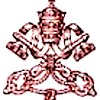
CONGREGATION
for the
CLERGY
|
Irish
Report Finds Abuse Persisting in Catholic Church
By DOUGLAS DALBY and RACHEL DONADIO
The New York Times: July 13, 2011
DUBLIN
— The Roman Catholic Church in Ireland was covering up the sexual
abuse of children by priests as recently as 2009, long after it issued
guidelines meant to protect children, and the Vatican tacitly encouraged
the cover-up by ignoring the guidelines, according to a scathing report
issued Wednesday by the 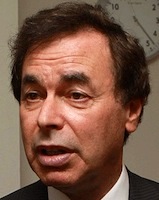 Irish
government. Irish
government.
Alan Shatter, the Irish justice minister,
called the findings “truly scandalous,”
adding that the church’s earlier promises to report all abuse
cases since 1995 to civil authorities were “built on sand.”
Abuse victims called the report more evidence that
the church sought to protect priests rather than children.
In Germany
on Wednesday, the country’s Roman Catholic bishops took new
steps to bring previously unreported abuse to light.
The German bishops said they would allow outside investigators to
look for abuse cases in diocesan personnel records dating back at
least 10 years, and in some cases all the way to 1945, though there
were indications that some crucial records may have already been destroyed.
In both Germany and Ireland, the abuse scandal has touched the highest
echelons of the church. The Irish report in particular revealed a
complex tug of war between the Irish church and the Vatican over how
to handle abuse, with a fine line between confusion and obstruction.
The Cloyne Report, as
it is known, drafted by an independent
investigative committee headed by Judge Yvonne
Murphy, found that the clergy in the Diocese of Cloyne, a rural
area of County Cork, did not act on complaints against 19 priests
from 1996 to 2009. The report also found that two
allegations against one priest were reported to the police, but that
there was no evidence of any subsequent inquiry.
John Magee, the
bishop of Cloyne since 1987, who had previously 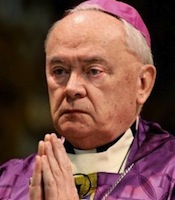 served
as private secretary to three popes, resigned last year.
In a statement on Wednesday, Bishop Magee offered a “sincere
apology,” but he did not accept direct responsibility for covering
up the abuse. served
as private secretary to three popes, resigned last year.
In a statement on Wednesday, Bishop Magee offered a “sincere
apology,” but he did not accept direct responsibility for covering
up the abuse.
“While I was fully supportive
of the procedures, I now realize that I should have taken a much firmer
role in ensuring their implementation,” Bishop
Magee said. “I accept in its entirety
the commission’s view that the primary responsibility for the
failure to fully implement the church procedures in the diocese lay
with me.”
The Cloyne Report
is the Irish government’s fourth in recent years on aspects
of the scandal. It shows
that abuses were still occurring and being covered up 13 years after
the church in Ireland issued child protection guidelines in 1996,
and that civil 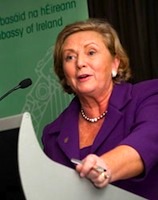 officials
were failing to investigate allegations. The report warned that other
dioceses might have similar failings. officials
were failing to investigate allegations. The report warned that other
dioceses might have similar failings.
“That’s the most horrifying
aspect of this document,” Frances Fitzgerald,
Ireland’s minister for children, told
a news conference on Wednesday. “This
is not a catalogue of failure from a different era — this is
about Ireland now.”
Most damaging,
the report said that the Congregation for the
Clergy, an arm of the Vatican that oversees the priesthood,
had not recognized the 1996 guidelines.
That “effectively gave individual Irish bishops the freedom
to ignore the procedures” and “gave
comfort and support” to priests who “dissented from the
stated Irish church policy,” the report said.
The report gave details of a confidential
letter sent in 1997 by the Vatican’s nuncio, or ambassador,
in Ireland to Irish bishops, warning them that their child-protection
policies violated canon law, which states that priests accused of
abuse should be able to appeal their cases to the Vatican. The nuncio
also dismissed the Irish guidelines as “a study document."
|
|
Ireland
Confronts the Vatican
EDITORIAL
The New York Times: July 14, 2011
Throughout
the long scandal of sexual abuse by rogue priests, the 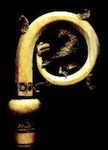  Vatican
has blatantly resisted the idea that civil law must trump church rules
in confronting criminal acts. This was evident again in the revelation
that the Roman Catholic Church in Ireland continued to cover up abuse
cases long after it had issued rules to protect children in 1996. Vatican
has blatantly resisted the idea that civil law must trump church rules
in confronting criminal acts. This was evident again in the revelation
that the Roman Catholic Church in Ireland continued to cover up abuse
cases long after it had issued rules to protect children in 1996.
“The
law of the land should not be stopped by crosier or by collar,”
Prime Minister Enda Kenny (below right) declared after receiving
a 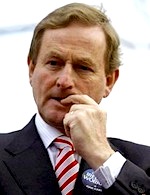 detailed
report on Wednesday showing that abuses were occurring as
recently as 2009. detailed
report on Wednesday showing that abuses were occurring as
recently as 2009.
A principal factor in the cover-up, the government
study found, was a Vatican letter in 1997 warning Irish church leaders
against full cooperation with law enforcement authorities. The papal
representative wrote that the anti-abuse policies 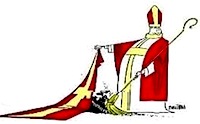 conflicted
with church law and should be considered “merely a study document.” conflicted
with church law and should be considered “merely a study document.”
This turned criminal law on its head and, as the study noted, gave
bishops “freedom to ignore” the tougher rules and protect
abusers in the church. In the diocese
of Cloyne, investigated in detail by the Dublin government, church
officials did not act on complaints against 19 priests in the 13 years
after the rules were put in place.
The new findings showed that the abuse was not confined to previous
generations. “This is about Ireland now,”
said Frances Fitzgerald, Ireland’s minister for children.
As usual, apologies were offered, this time by John Magee, the longtime
bishop of Cloyne, who resigned last year. Bishop Magee had been accused
of improperly embracing a seminarian, but that allegation was dismissed.
With the pedophilia scandal under investigation worldwide, 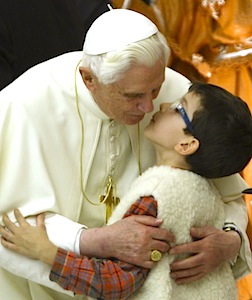 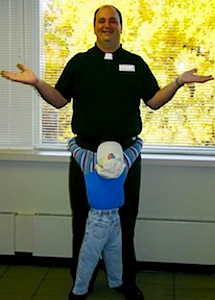 Vatican
officials point to new, tougher rules. But the rules, which do not
require dioceses to report allegations of crimes to the police, are
considered only advisory guidelines to bishops. The Dublin government
has enacted a new law making it a crime for anyone, church officials
included, to fail to report child abuse to civil authorities. The
Vatican has a valuable lesson to learn in Ireland. Vatican
officials point to new, tougher rules. But the rules, which do not
require dioceses to report allegations of crimes to the police, are
considered only advisory guidelines to bishops. The Dublin government
has enacted a new law making it a crime for anyone, church officials
included, to fail to report child abuse to civil authorities. The
Vatican has a valuable lesson to learn in Ireland.
(Full
text)
|

DIOCESE
of
BROOKLYN

|
Brooklyn
Bishop Issues Ban On All Politicians Who Voted In Favor Of Gay Marriage
Diocese To Come Down Hard On State
Lawmakers For The
Foreseeable Future
CBSNewYork: July 6, 2011
NEW YORK— In the wake of the passage
of same-sex marriage, state lawmakers shouldn’t expect an invitation
to a Catholic church or school in the Diocese of Brooklyn. Lawmakers
who voted for gay marriage should also expect any gift or proclamation
to be refused.
Last month’s gay marriage vote in New York has opened up a war
between Brooklyn’s bishop and state lawmakers.
Diocesan spokesman, Monsignor Kieran Harrington,
said lawmakers 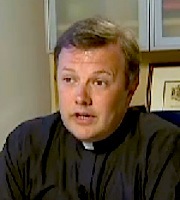 didn’t
even read the bill or debate the issue before quickly voting during
the session’s final night — redefining
a centuries’ old institution. didn’t
even read the bill or debate the issue before quickly voting during
the session’s final night — redefining
a centuries’ old institution.
“Our legislators did not do their job,”
Harrington said. Harrington asserted the process
leading to the vote “seemed to be very flawed.”
“Because the process was flawed,
we believe the legislation passed. If the process had been different,
we don’t know if the legislation would have passed,”
Harrington said.
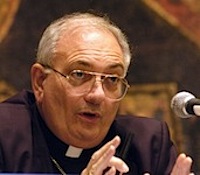
Bishop Nicholas DiMarzio sent a letter
to diocesan schools and churches, ripping Albany’s corrupt political
culture while asking they refuse any distinction of honors bestowed
upon them by lawmakers who voted for gay marriage.
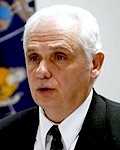
Assemblyman Joe Lentol
(D-Williamsburg, Green Point, Fort Green) said he voted his “conscious”
and “for equality.” He then
received a letter returning his annual gift to a school’s graduating
class.
“I actually feel sorry for the congregation,” Lentol said.
“I know the church is not in the greatest financial position.”
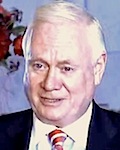 Senator
Marty Golden voted against gay marriage
and said he’s still unwelcome. Senator
Marty Golden voted against gay marriage
and said he’s still unwelcome.
“Even though I’m being punished for it, I understand where
he’s coming from,” said Golden, a Republican representing
Bay Ridge. “It is a little bit aggravating, but I’m going
to have to get over it.”
Even if they disagree with the bishop’s position, area lawmakers
said they respect the leadership he’s taking on this issue and
will obey the ban for as long as it’s in effect.
(Full
text)
|
|
Archbishop
Timothy Dolan continues to express DISDAIN
for gay marriage law
BY SARAH DARVILLE, LORE CROGHAN, LILLIAN RIZZO AND
KATIE NELSON
DAILY NEWS: Monday, June 27, 2011
The swell of emotions over legalizing same-sex marriage leaked 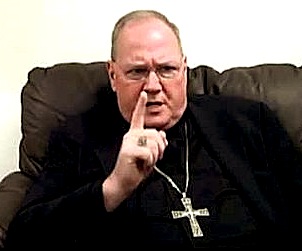 into
Gotham's churches Sunday. into
Gotham's churches Sunday.
Archbishop Timothy
Dolan - one of the most outspoken religious leader on the issue
- said his spirits were low.
"I sort of needed a good dose of the Lord's grace and mercy because
I've been down a little recently, as you might imagine," the
Catholic leader said after Mass Sunday.
Steadfast in his opposition, Dolan continued
to express disdain for
the evolution of same-sex nups.
(Full
article)
|
|
Passage
of gay nuptials in New York State is another 'nail in the coffin'
of marriage
BY NICHOLAS DIMARZIO, PH.D., D.D., BISHOP OF
BROOKLYN
DAILY NEWS: Sunday, June 26, 2011
The children of our state deserve the best. We put in place
public 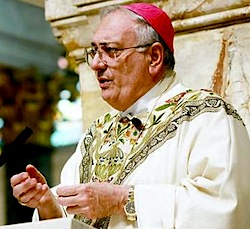 policies
to ensure that children have the proper nutrition, the best education
available and are safe from harms way. policies
to ensure that children have the proper nutrition, the best education
available and are safe from harms way.
There is no question that our society genuinely values the young.
Yet, despite these efforts, the number of young
people suffering from emotional disorders is disconcerting
and our teen suicide rate is alarming.
Sociologists and psychologists agree that stable families where a
mother and father live together in a loving
union are a key predicator of a child's future health, well-being
and success.*
*
The available evidence is not exclussive
of "loving" same sex couples
|
 DIOCESE
DIOCESE
of
BROOKLYN |
Religious
leaders bash gay marriage law, vow to ban pols who supported measure
BY JOSE BAYONA AND CHRISTINA BOYLE
DAILY NEWS:Sunday, June 26, 2011
Religious leaders slammed the state's
new gay marriage law on 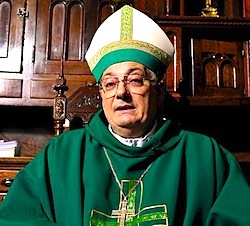 Saturday,
vowing to ban politicians
who supported the measure from any Catholic church and parochial school
events. Saturday,
vowing to ban politicians
who supported the measure from any Catholic church and parochial school
events.
The city's top Catholic clergy released strongly worded statements in
the hours after the state Senate voted 33-29 to legalize gay unions.
Bishop Nicholas DiMarzio,
of the diocese of Brooklyn, called on all Catholic schools to
reject any honor bestowed upon them by Gov. Cuomo, who played a pivotal
role in getting the bill passed. |
|
At
Mass, Archbishop Is Silent on Same-Sex Marriage
By MICK MEENAN
The New York Times:June 26, 2011
Archbishop Timothy M. Dolan did
not exactly hide his opposition to efforts to legalize same-sex marriage
in New York. Yet on Sunday, 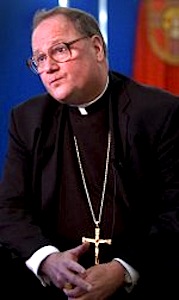 Archbishop
Dolan made no mention of gay marriage during the 10:15 a.m. Mass at
St. Patrick’s Cathedral. He did not criticize
state lawmakers, or offer an impassioned defense of the church’s
view of marriage. Archbishop
Dolan made no mention of gay marriage during the 10:15 a.m. Mass at
St. Patrick’s Cathedral. He did not criticize
state lawmakers, or offer an impassioned defense of the church’s
view of marriage.
It was not until after services when the archbishop tackled the issue,
and explained to reporters why he chose not to do so during his homily.
“This is about prayer,” he
said inside the cathedral. “I sort of needed a good dose of the
Lord’s grace and mercy because I’ve been down a little lately
as you can imagine.”
Archbishop Dolan said he was disheartened that the same-sex marriage
bill was passed by the Legislature and signed into law by Gov. Andrew
M. Cuomo.
“I would have to say I was sad because
it’s not good for the common good,” the archbishop said.
“I think society and culture is at its peril.”
Archbishop Dolan acknowledged sensing that his efforts to prevent the
bill’s passage were not going to be fruitful: “We knew it
was an uphill battle.”
He said his opposition was based on a pro-marriage position, not an
anti-gay bias. “I tell the gay community
I love you very much, and every single morning when I say my morning
prayers, I pray for the health of all New Yorkers and they are part
of that,” he said.
“I am very grateful for the presence of so many gay Catholics
who are heroically trying to live their faith.” |

MAUREEN
DOWD
|
The
Archbishop vs. the Governor: Gay Sera, Sera
By MAUREEN DOWD -- OP-ED COLUMNIST
The New York Times: June 18, 2011
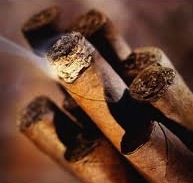  With his cigars, blogs, Jameson’s and Irish affability, New
York Archbishop Timothy Dolan prides
himself on his gumption.
With his cigars, blogs, Jameson’s and Irish affability, New
York Archbishop Timothy Dolan prides
himself on his gumption.
Certainly his effort to kill the gay
marriage bill, just one vote away from passing in Albany, shows a
lot of gall.
The archbishop has been ferocious in
fighting against marriage 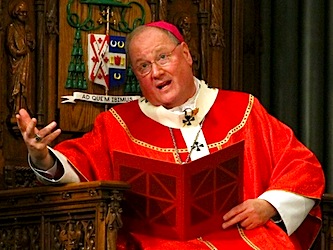 between
same-sex couples, painting it as a perversity against nature. between
same-sex couples, painting it as a perversity against nature.
If only his church had been as ferocious in fighting against the true
perversity against nature: the unending horror of pedophile priests
and the children who trusted them.
Archbishop Dolan is pitted against Andrew
Cuomo, the  Catholic
governor who is fiercely pushing for New York to become the sixth
and most populous state to approve gay marriage. Catholic
governor who is fiercely pushing for New York to become the sixth
and most populous state to approve gay marriage.
Governor Cuomo was already on the wrong
side of the church for his support of abortion rights, his divorce
and his living in “sin” with the Food Network star Sandra
Lee. He was accused
by the Vatican adviser
Edward Peters (below right) of “public
concubinage,” as it’s known in canon law,
and Peters recommended that Cuomo be
denied communion until he resolved “the scandal” by ceasing
this “cohabiting.”

And therein lies the casuistry. On one hand, as Peters told The Times
about Cuomo and Lee, “men and women are not supposed to live
together without benefit of matrimony.” But then the church
denies the benefit of marriage to same-sex couples living together.
Dolan insists that marriage between
a man and a woman is “hard-wired” by God and nature. But
the church refuses to acknowledge that homosexuality may be hard-wired
by God and nature as well, and is not a lifestyle choice.
In yet another attempt at rationalization, the nation’s Catholic
bishops — a group Dolan is now in charge of — put out
a ridiculous five-year-study last month going with the “blame
Woodstock” explanation for the sex-abuse scandal. The
report suggested that the problem was caused
by permissive secular society rather than cloistered church culture,
because priests were trained in the turbulent free-love era.
It concluded, absurdly, that neither the all-male
celibate priesthood nor homosexuality were causes.
In
his blog, “The Gospel in the Digital
Age,” the Starchbishop noted with asperity that
“Last time I consulted an atlas,
it is clear we are living in New York, in the United States of America
— not in China or North Korea,” where “communiqués
from the  government
can dictate the size of families, who lives and who dies, and what
the very definition of ‘family’ and ‘marriage’
means.” government
can dictate the size of families, who lives and who dies, and what
the very definition of ‘family’ and ‘marriage’
means.”
Yeah. Not like the Vatican.
In the same blog, Dolan
snidely dismissed the notion that gay marriage is a civil right.
“We acknowledge that not every
desire, urge, want, or chic cause is automatically a ‘right,’
” he wrote. “And,
what about other rights, like that of a child to be raised in a family
with a mom and a dad?”
And how about the right of a child
not to be molested by the parish priest?
|
|
Archbishop Calls
Gay Marriage Bill an ‘Ominous Threat’
By MICHAEL PAULSON
The New York Times: June 17, 2011
ALBANY — Timothy
M. Dolan, the Roman Catholic archbishop of New York,
who 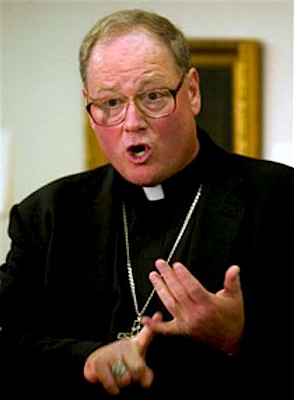 has
been a low-key presence during the debate over same-sex marriage in
the state, called in to a capital radio
talk show Friday morning to warn that the proposed legislation posed
an “ominous threat” to society. has
been a low-key presence during the debate over same-sex marriage in
the state, called in to a capital radio
talk show Friday morning to warn that the proposed legislation posed
an “ominous threat” to society.
Archbishop Dolan, who was in Seattle to preside over a meeting of the
United States Conference of Catholic Bishops, said that Bishop Nicholas
A. DiMarzio of Brooklyn had been dispatched from Seattle to Albany in
a last-ditch effort to influence the Senate Republican majority, which
will determine the fate of the proposed same-sex marriage bill.
Archbishop Dolan, speaking on Fredric
U. Dicker’s radio program on WGDJ-AM (1300), repeatedly made it
clear that he strongly opposed gay marriage, which he called “unjust
and immoral,” “detrimental for the common good” and
“a violation of what we consider the natural law that’s
embedded in every man and woman.”
Acknowledging that supporters of same-sex marriage need just one more
vote to prevail in the Senate, Archbishop Dolan said that “we
are still working for the defeat of this bill,” but
that “we’re realistic to know the forces pushing
this are very strong, they’re well oiled, they’re well financed.”
Archbishop Dolan was dismissive of efforts
to protect religious organizations from being affected by the legislation,
which he called “a couple bones
to the dog.” He argued that the rights of churches
are already guaranteed by the Constitution, and that as for any additional
protections drafted in Albany, “we
worry that, what the government gives, the government can take away.”
“We just don’t want this definitive
religious freedom to be at the mercy of some government whim,”
he said.
Archbishop Dolan argued that the passage of same-sex marriage in other
states and countries had at times led to problems for clergy and religious
organizations who remained in opposition. “You’ve
got couples now in England who are now told they can’t adopt children
because they’re not open to same-sex marriage,” he said.
Archbishop Dolan also rued what he called
“the presumptive omnipotence of the state” in considering
allowing gays to marry, and decried a “new religion of secularism
that feels it’s going to come to a theocracy and impose its values
on society.”
Asked about polls showing growing public support for same-sex marriage,
Archbishop Dolan said he didn’t entirely trust the research methods,
because, he said, “our opponents have been very glib in redefining
the question.”
As the concerns of religious leaders seemed to play an increasing role
in the Senate debate over same-sex marriage, gay
rights advocates released a statement from clergy who say the bill would
not harm religious organizations.
“We recognize and respect that not
all faiths support marriage equality, and agree that it is appropriate
that the proposed marriage equality legislation provides broad protection
for religious freedom,” said the statement, which
was signed by a number of prominent rabbis and mainline Protestant leaders.
“Sadly, however, there are some
among us who are using religion as a smokescreen to hide their intolerance,
choosing to misstate the plain language of the bill and falsely claiming
that it fails to protect religious practice. Nothing could be further
from the truth: the governor’s bill specifically provides that
no clergy, house of worship or denomination would be forced to perform
same-sex marriages or make their facilities available to same-sex couples
for marriage ceremonies, receptions or other functions.”
Mayor Michael R. Bloomberg of New York,
addressing concerns of religious leaders, said: “I
happen to think very strongly that this is not a religious thing. Religious
organizations should have every right to decide who they want to marry,
whether they want to permit alcohol. Religions do a lot of different
things. This is the government, and the
government should be separate from religion.” |
|
Catholic
Bishops Uphold 2002 Sex Abuse Policy
By LAURIE GOODSTEIN
T^he New York Times: June 16, 2011
The nation’s Roman Catholic bishops voted overwhelmingly on Thursday
to retain their policies on sexual abuse by clergy members with only
minor revisions, disregarding victims’ advocates
who had called for a more substantial overhaul.
The bishops promised to reconsider the policies again two years from
now, after they receive recommendations from their national sexual advisory
board, which is composed primarily of lay people with expertise in the
field.
The bishops first adopted the policies under intense public scrutiny
in 2002, as the scandal over abuse by priests reached a fever pitch.
The policy’s cornerstone, which
stirred great debate among the bishops at the time, was a commitment
to remove from ministry every priest credibly accused of abuse even
once, a tenet referred to as “zero
tolerance.”
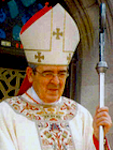 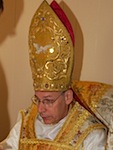 That commitment has been called into question in recent months with
revelations that accused priests were allowed to continue in ministry
in the Archdiocese of Philadelphia
(left: Archbishop Justin Francis Rigali)
and the Diocese of Kansas City-St. Joseph
(right: Bishop Robert W. Finn).
Those bishops did not forward details
about all the cases to their sexual abuse advisory boards or the police.
That commitment has been called into question in recent months with
revelations that accused priests were allowed to continue in ministry
in the Archdiocese of Philadelphia
(left: Archbishop Justin Francis Rigali)
and the Diocese of Kansas City-St. Joseph
(right: Bishop Robert W. Finn).
Those bishops did not forward details
about all the cases to their sexual abuse advisory boards or the police.
In recent weeks, church critics have called for the bishops to close
the loopholes they see in the policy, known as “The
Charter for the Protection of Children and Young People.”
One such group, BishopAccountability.org,
called for strengthening the review boards and the provisions that require
reporting to civil authorities.
But the bishops’ leaders went into
their meeting in Bellevue, Wash., near Seattle, on Wednesday saying
that they would stand by 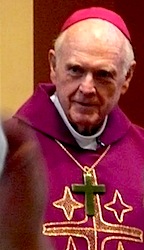 the
current charter because it is effective. The
charter was approved on a vote of 187 to 5, with 4 abstentions. the
current charter because it is effective. The
charter was approved on a vote of 187 to 5, with 4 abstentions.
At the meeting this year,
only one prelate, Francis
Hurley, the retired archbishop of Anchorage (right), rose to
speak in favor of removing the “zero tolerance”
provision. Saying that it has caused anger among
priests and contradicted the church’s teachings on reconciliation
and forgiveness, he proposed allowing some priests who had abused to
return to limited ministry.
On other matters, the bishops also adopted
a strongly worded statement against physician-assisted
suicide, and heard updates about their multimedia campaign against
same-sex marriage.
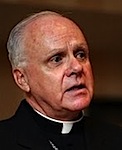 During
discussion in the open conference session, Archbishop
Edwin O’Brien of Baltimore (left)
expressed concern about polls showing a shift in public attitudes in
the last few years toward approval of same-sex
marriage. During
discussion in the open conference session, Archbishop
Edwin O’Brien of Baltimore (left)
expressed concern about polls showing a shift in public attitudes in
the last few years toward approval of same-sex
marriage.
“It seems like almost overnight we’ve lost the young adult
community on this, including Catholics,” said Archbishop O’Brien,
adding that young people had been misled
to believe that gay marriage is a civil rights issue.
 Bishop
Salvatore Cordileone of Oakland (right), chairman of the bishops’
committee on the defense of marriage, responded, “My
reflection on this is to ask, whose rights do we really need to respect?” Bishop
Salvatore Cordileone of Oakland (right), chairman of the bishops’
committee on the defense of marriage, responded, “My
reflection on this is to ask, whose rights do we really need to respect?”
“Children are the most vulnerable
in society,” he concluded, “and children
need a mother and a father.”
|

MAUREEN
DOWD
|
An Archbishop
Burns While Rome Fiddles
By MAUREEN DOWD
OP-ED COLUMNIST
The New York Times: June 4, 2011
He could not get through a story about “a really nasty man”
— an 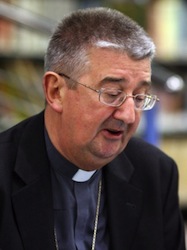 Irish
priest who sexually abused, physically tortured and emotionally threatened
vulnerable boys — without pulling out his handkerchief and wiping
his nose. Irish
priest who sexually abused, physically tortured and emotionally threatened
vulnerable boys — without pulling out his handkerchief and wiping
his nose.
“He built a swimming pool in his own garden, to which only boys
of a certain age, of a certain appearance were allowed into it,”
Archbishop Diarmuid Martin (left) told
me recently. “There were eight other priests in that parish, and
not one of them seemed to think there was something strange about it.”
Two years after learning the extent of the depraved and Dickensian treatment
of children in the care of the Irish Catholic Church — a fifth
circle of hell hidden for decades by church and police officials —
the Irish are still angry and appalled.
The only church leader who escapes their disgust is the no-nonsense,
multilingual Martin. He was sent home to Dublin in 2003 after 27 years
in the Vatican bureaucracy and diplomatic corps and found the Irish
church in crisis, reeling from a cover-up that spanned the tenures of
four past Dublin archbishops.
I went to see him at his office in Drumcondra in north Dublin because
he is that rarest of things in the church’s tragedy: a moral voice.
In February, Martin held an unprecedented “Liturgy
of Lament and Repentance” at a Dublin cathedral,
where he asked forgiveness from God and victims of abuse and praised
the courage of those who had come forward.
Wearing a simple black cassock, he helped wash the feet of eight victims
and conceded that the church “will
always bear this wound within it.”
The frustrated Martin has criticized the
Vatican’s glacial pace on reform and chided the church: “Denial
will not generate confidence.”
He has mourned the lack of faith among young people in Ireland, where
fewer than one in five Catholics go to Mass in Dublin on Sunday. (A
victims’ support group is called One in Four,
asserting that’s how many Irish have been affected by the sexual
abuse scandal.)
In return for doing the right thing, he
has been ostracized by fellow bishops in Ireland and snubbed by the
Holy See.
Showing again that it prefers denial to
remorse, the Vatican undermined Martin’s call for accountability.
In 2009, after the Irish government’s 700-page Murphy report on
sexual abuse came out, Pope Benedict XVI
refused to accept the resignations of two Irish bishops who presided
over dioceses where abuse cases were mishandled.
The following year, when Martin expected
to be named cardinal, the pope passed him over.

Yet Martin,
famous protector of victims, is an outlier of 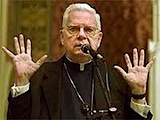 the
club, while Cardinal Bernard Law (left), notorious
protector of pedophiles, has a cushy Vatican sanctuary.
And Cardinal Angelo Sodano (right, top), the
club, while Cardinal Bernard Law (left), notorious
protector of pedophiles, has a cushy Vatican sanctuary.
And Cardinal Angelo Sodano (right, top),
 who
was in league with the notorious abuser
of seminarians and inseminator of women, Father
Marcial Maciel Degollado (right, bottom), is
the dean of the College of Cardinals in Rome. who
was in league with the notorious abuser
of seminarians and inseminator of women, Father
Marcial Maciel Degollado (right, bottom), is
the dean of the College of Cardinals in Rome.
|
|
The
Vatican Comes Up Short
EDITORIAL
The New York Times: May 19, 2011
The Vatican’s
long overdue guidelines for fighting sexual abuse of
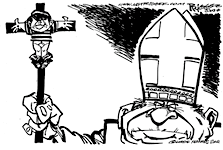 children
are, unfortunately, just that — flimsy
guidelines for a global problem that requires an unequivocal mandate
for church officials to work with secular authorities
in prosecuting rogue priests. children
are, unfortunately, just that — flimsy
guidelines for a global problem that requires an unequivocal mandate
for church officials to work with secular authorities
in prosecuting rogue priests.
Instead, the Vatican has issued nonbinding
guidance that punts the scandal back to the authority of local bishops,
who still will not face firm oversight or punishment for cover-ups that
recycled hundreds of abusive priests.
The directive came two days before a new study of the abuse problem
that cites the sexual and social turmoil of the 1960s as a possible
factor in priests’ crimes. This
is a rather bizarre stab at sociological rationalization and, in any
case, beside the point that church officials went into denial and protected
abusers.
The Vatican directive is also seriously defective for playing down the
role of civilian boards in investigating abuses. The lay boards
helped force the American bishops to proclaim
a zero-tolerance policy that was finally more concerned about raped
children than the image of the Roman Catholic Church.
The Vatican guidelines note that abusing
children is a matter for secular law and call for dioceses to create
“clear and coordinated” policies by next year. But the continuing
stress on church priority in what essentially are criminal offenses
is disheartening.
Vatican officials say Rome should not interfere with the 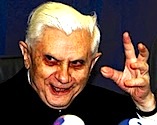 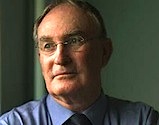 traditional
supremacy of local bishops. That was not the case earlier this month,
when Pope Benedict XVI removed
Bishop William Morris (right) of Toowoomba, Australia,
from office. The bishop, concerned with
the shortage of priests, asked five years ago whether the Vatican “may
well” have to reconsider the bar to ordaining women or married
men. traditional
supremacy of local bishops. That was not the case earlier this month,
when Pope Benedict XVI removed
Bishop William Morris (right) of Toowoomba, Australia,
from office. The bishop, concerned with
the shortage of priests, asked five years ago whether the Vatican “may
well” have to reconsider the bar to ordaining women or married
men.
 No
dramatic dismissal was ordered for bishops well documented to have overseen
hush payments to victims and relocation of abusive priests.
Splendid Vatican sanctuary was extended to Cardinal
Bernard Law (right) after he had to resign amid reports
he covered up the scandal in Boston. No
dramatic dismissal was ordered for bishops well documented to have overseen
hush payments to victims and relocation of abusive priests.
Splendid Vatican sanctuary was extended to Cardinal
Bernard Law (right) after he had to resign amid reports
he covered up the scandal in Boston.
Most recently, ranking churchmen in Philadelphia
rejected a grand jury finding that as many as 37 priests suspected of
abuse should not still be serving. The diocese later
suspended 26 amid public alarm. This should have been a red flag to
the Vatican that diocesan prelates need a no-nonsense fiat in repairing
the damage to children and the church from decades of shielding abusive
priests.
(Full
editorial) |
 JUAN
PABLO BULNES
JUAN
PABLO BULNES |
Chile:
Evidence on Priest Seized
By ALEXEI BARRIONUEVO
The New York Times: April 20, 2011
The
police in Santiago have raided the home
and offices of a lawyer representing a Roman
Catholic priest found guilty by the Vatican of sexually molesting
boys. The authorities seized 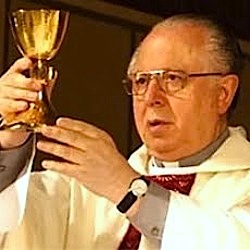 documents
related to the church case for a criminal investigation, a police
spokeswoman, Lorena Quiroz, confirmed Tuesday. A judge ordered the
raid after Juan
Pablo Bulnes, the lawyer for the priest, the
Rev. Fernando Karadima
(right), refused to turn over documents. Mr. Bulnes on Tuesday called
the action an “abuse” of his right to lawyer-client confidentiality.
He said Chile’s bar association has asked the Supreme Court
to overturn the seizure. documents
related to the church case for a criminal investigation, a police
spokeswoman, Lorena Quiroz, confirmed Tuesday. A judge ordered the
raid after Juan
Pablo Bulnes, the lawyer for the priest, the
Rev. Fernando Karadima
(right), refused to turn over documents. Mr. Bulnes on Tuesday called
the action an “abuse” of his right to lawyer-client confidentiality.
He said Chile’s bar association has asked the Supreme Court
to overturn the seizure.
An appeals court voted last month to reopen a criminal case into charges
of sexual abuse after the Vatican found Father Karadima guilty of
abusing minors.
The Vatican ordered the priest to retire
to a “life of prayer and penitence.”
He has appealed the Vatican’s decision.
(Full
article)
|

ROGER
VANGHELUWE
former bishop
of Bruges
|
Outrage
in Belgium Over Interview of Ex-Bishop
By STEPHEN CASTLEand RACHEL DONADIO
The New York Times: April 16, 2011
LONDON — A year after his
resignation plunged Belgium’s Roman 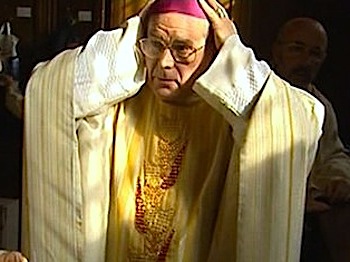 Catholic
Church into a crisis, the former bishop of Bruges provoked
almost universal condemnation on Friday, this time by
admitting that he had abused a second nephew and insisting
that he was not a pedophile. Catholic
Church into a crisis, the former bishop of Bruges provoked
almost universal condemnation on Friday, this time by
admitting that he had abused a second nephew and insisting
that he was not a pedophile.
In a television interview late Thursday that reopened deep wounds, the
bishop, Roger Vangheluwe,
74, recounted with apparent lack of contrition events leading up to
his resignation as bishop of Bruges last year, when it emerged that
nearly 25 years ago he had abused a boy who was later revealed to be
one of his nephews.
In a broadcast from a location in France, Bishop
Vangheluwe ... suggested that the 13-year relationship
revealed last year had not been opposed by his nephew, and, in
an unexpected new twist, he admitted having abused
a second nephew for a much shorter period.
The interview with Bishop Vangheluwe, which was conducted on the Flemish
channel VT4 and, at his insistence, broadcast live,
prompted a storm of criticism from an array of public figures. Although
he began by expressing his guilt, he conveyed little if any contrition
for his actions, and he said he would not abandon
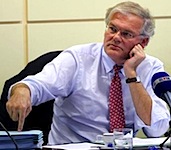 the
priesthood unless he was forced to do so. the
priesthood unless he was forced to do so.
Bishop Vangheluwe is not facing criminal charges because of Belgium’s
10-year statute of limitations, and the
Vatican says he is receiving “spiritual
and psychological treatment” outside Belgium.
But Belgium’s justice minister,
Stefaan De Clerck (right), called on the
Vatican to impose a tough punishment.
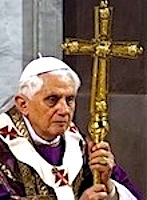 This
week, the Vatican said that its Congregation
for the Doctrine of the Faith was evaluating the bishop’s
case and that Pope Benedict
XVI himself would eventually rule on the bishop’s fate.
Among possible punishments, the pope could remove him from the priesthood. This
week, the Vatican said that its Congregation
for the Doctrine of the Faith was evaluating the bishop’s
case and that Pope Benedict
XVI himself would eventually rule on the bishop’s fate.
Among possible punishments, the pope could remove him from the priesthood.
During the interview, to which Bishop Vangheluwe had agreed only on
the condition that it would be broadcast live, he denied that he had
been driven by sexual motives. “I
have often been involved with children and I never felt the slightest
attraction,” he said. “It was
a certain intimacy that took place.”
“I don’t have the impression
at all that I am a pedophile,” he continued. “It
was really just a small relationship. I did not have the feeling that
my nephew was against it — quite the contrary.”
“How did it begin?” he
said. “As with all families. When they came
to visit, the nephews slept with me. It began as a game with the boys.
It was never a question of rape, there was never physical violence used.
He never saw me naked and there was no penetration.”
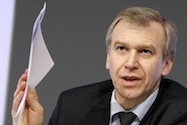 Bishop
Vangheluwe (right) said that the same had applied to
the boy abused for a shorter period of time and that
the abuse had been restricted to the touching of genitals. Bishop
Vangheluwe (right) said that the same had applied to
the boy abused for a shorter period of time and that
the abuse had been restricted to the touching of genitals.
“What he has said I find terrible,”
said Yves Leterme, Belgium’s prime minister.
“It goes beyond what is acceptable.”
 That sentiment was echoed by Karine
Lalieux (left), the Belgian deputy who led a parliamentary committee
on sexual abuse.
That sentiment was echoed by Karine
Lalieux (left), the Belgian deputy who led a parliamentary committee
on sexual abuse.
“I say it’s sickening, disgusting,”
she said. “Mr. Vangheluwe has not
understood that he has committed crimes, he has minimized and relativized
his crimes. I think of the victims and of their suffering.”
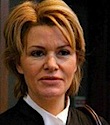 Lawyers representing victims were equally shocked. “I
think it is astonishing how this man does not feel any guilt, does not
show any guilt,” said Christine Mussche
(right), a lawyer for dozens of people who claim they were abused
by a clergy member. “He’s saying that the
Lawyers representing victims were equally shocked. “I
think it is astonishing how this man does not feel any guilt, does not
show any guilt,” said Christine Mussche
(right), a lawyer for dozens of people who claim they were abused
by a clergy member. “He’s saying that the 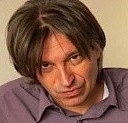 victims
also enjoyed this, and there is no feeling of regret at all.” victims
also enjoyed this, and there is no feeling of regret at all.”
Walter Van Steenbrugge (left),
another lawyer representing the victims, said that neither
nephew wished to comment. |

THE
VATICAN
|
Vatican
warns China bishops over illegal ordination
By Philip Pullella
Reuters: APR 15, 2011
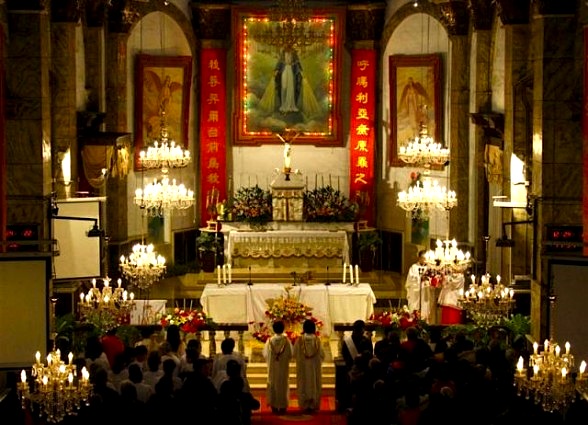
Bishops in China
who are ordained without papal authorisation inflict a “grave
wound” on the entire Catholic Church and should not let themselves
be manipulated by the government, the Vatican has said.
The Vatican issued the warning on Thursday after
a meeting of a special commission that studies the situation of Catholics
in China, who are not allowed to recognise the pope’s authority
but forced to be members of a state-backed Church.
Last November, the Vatican condemned the ordination without papal
permission of Reverend Joseph Guo Jincai,
a member of the state-backed Church in
Chengde. For a period before that, China and the Vatican
had reached an agreement that the Vatican would give tacit but not
explicit approval to some of the appointments of bishops by the government-backed
Church after discreet consultations.
It said at the time various bishops loyal to the pope had come under
pressure to attend Guo’s ordination ceremony.
Catholics in China are divided between one Church that recognises
the pope and his authority to name bishops and a state-backed
“patriotic association” which ordains
its own.
Priests anywhere in the world who allow
themselves to be made bishops without papal approval are usually subjected
to automatic excommunication, or a total cutoff from the Church.
But in its statement, the Vatican said “external pressures and
constrictions” in China might exempt the new bishops from such
drastic punishment.
Photo
credit: David Gray
|
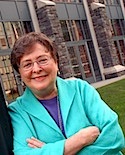
SISTER
ELIZABETH A. JOHNSON
|
After
Bishops Attack Book, Gauging Bounds of Debate
By PAUL VITELLO
The New York Times: April 12, 2011
Is
God male?
The
Old Testament uses the masculine pronoun to 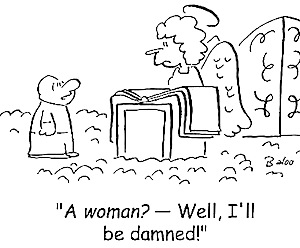 describe
him. Jesus refers to the divinity as Father. So does that make the
creator a masculine force — and mean that men are more godlike
than women? describe
him. Jesus refers to the divinity as Father. So does that make the
creator a masculine force — and mean that men are more godlike
than women?
These are questions that theologians like Sister
Elizabeth A. Johnson, a Fordham University professor,
have been mulling for years. At 69, Sister Johnson is among the pioneers
of a generation of feminist scholars who examine how cultural biases
among biblical scribes may have led to women’s diminished roles
in Western religious traditions, especially the Roman
Catholic Church.
Until a few weeks ago, when a committee of American bishops accused
her of violating church doctrine in a 2007 book, many theologians
considered such questions standard academic fare — a natural
line of inquiry into the cultural context and history of ancient texts.
Now, those scholars are sifting through the committee’s 21-page
critique to understand what it may mean for them, and for the future
of theological study in the United States. Many
on the left and the right agree on one point: The bishops, who have
already shut off discussion about ordaining women, are signaling that
other long-debated questions about gender in the church — the
choice of pronouns in prayers, the study of the male and female aspects
of God — are substantially off-limits as well.
Several Catholic thinkers say that in confronting Sister Johnson,
a highly respected theologian whose books are widely used in theology
classes, the bishops have tried to make an example.
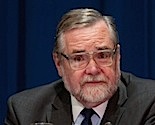 “What
the bishops have done is to reject 50 years of contemporary theology,”
said Terrence W. Tilley, chairman of
the theology department at Fordham, where many faculty
members have rallied to the sister’s defense. “Sister
Johnson has been attempting to push Catholic thinking along new paths.
And the bishops have now made it clear — this is something they
stand against.” “What
the bishops have done is to reject 50 years of contemporary theology,”
said Terrence W. Tilley, chairman of
the theology department at Fordham, where many faculty
members have rallied to the sister’s defense. “Sister
Johnson has been attempting to push Catholic thinking along new paths.
And the bishops have now made it clear — this is something they
stand against.”
The Cardinal Newman Society,
which monitors Catholic colleges for  what
it considers “inauthentic” teaching.... “This
is a what
it considers “inauthentic” teaching.... “This
is a  person
who has described the male-only priesthood as a sign of ‘patriarchal
resistance to women’s equality,’ ” said Patrick
J. Reilly, the society’s president. “So I think
she has officially challenged church teaching in ways that are beyond
the pale.” person
who has described the male-only priesthood as a sign of ‘patriarchal
resistance to women’s equality,’ ” said Patrick
J. Reilly, the society’s president. “So I think
she has officially challenged church teaching in ways that are beyond
the pale.”
The critique was limited to her most recent book, “Quest
for the Living God: Mapping Frontiers in the Theology of God,”
which  examined
different understandings of the divine through the experiences of
women, Latinos, Holocaust victims, the poor and people of other religions.
Saying the book should not be used in Catholic schools and colleges,
the bishops singled out passages they said contained “misrepresentations,
ambiguities and errors.” Those included sections describing
other religious traditions as having roots in divine revelation as
deep as Christianity’s. examined
different understandings of the divine through the experiences of
women, Latinos, Holocaust victims, the poor and people of other religions.
Saying the book should not be used in Catholic schools and colleges,
the bishops singled out passages they said contained “misrepresentations,
ambiguities and errors.” Those included sections describing
other religious traditions as having roots in divine revelation as
deep as Christianity’s.
The passages drawing the harshest admonishment,
however, concerned Sister Johnson’s proposal that feminine as
well as masculine imagery be used in prayers referring to God,
a recommendation that 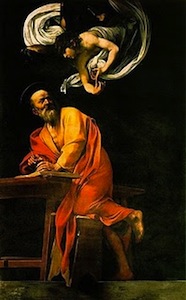 has
been debated and rejected by the bishops before. Still,
the book persisted, “all-male images of God are hierarchical
images rooted in the unequal relation between women and men, and they
function to maintain this arrangement.” has
been debated and rejected by the bishops before. Still,
the book persisted, “all-male images of God are hierarchical
images rooted in the unequal relation between women and men, and they
function to maintain this arrangement.”
Wrong, the bishops said:
If the Gospels use masculine imagery,
it is because divine revelation would have it that way.
“The names of God found in the
Scriptures are not mere human creations that can be replaced by others
that we may find more suitable,” the bishops wrote. “The
standard by which all theological assertions must be judged is that
provided by divine revelation, not by unaided human understanding.
God does use human, and thus limited, means in revealing himself to
the world.”
Dr. Tilley, the Fordham theology chairman,
described that argument as “approaching
the incoherent.”
“All revelation is received through
language, and all language is culturally conditioned,” he said.
“All they are saying here is that  they
have the truth and Sister Johnson doesn’t.” they
have the truth and Sister Johnson doesn’t.”
The Rev. Thomas G. Weinandy, executive
director for the bishops’ Committee on Doctrine,
said the committee’s concern was less about “feminism
or nonfeminism” than about the author’s “understanding
of God.”
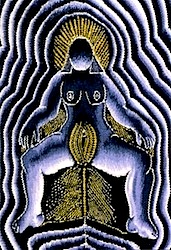 But
Teresa Berger, a theology professor
at Yale Divinity But
Teresa Berger, a theology professor
at Yale Divinity  School
whom the Vatican barred from teaching in Catholic universities in
the early 1990s because of her feminist theological writings, said
the church’s attitude toward women was diminishing its understanding
of God. School
whom the Vatican barred from teaching in Catholic universities in
the early 1990s because of her feminist theological writings, said
the church’s attitude toward women was diminishing its understanding
of God.
“Gender has become such a contentious
issue in the church,” Professor Berger said, “that any
exploration of it, in terms of language or in the larger question
of the nature of God, is viewed as a threat to the basic givens of
the faith.”
IMAGES
Top left: Caravaggio, St. Matthew Writing the Gospels
Above left: Judy Chicago, Would God Be Female
|
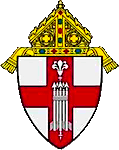
ARCHDIOCESE
of
MANCHESTER

State Representative
D. J. BETTENCOURT
(R-NH)
|
Lawmaker
Calls Bishop ‘Pedophile Pimp’
By KATHARINE Q. SEELYE
The New York Times: April 2, 2011
A
top Republican in New Hampshire
on Friday called Bishop John B. 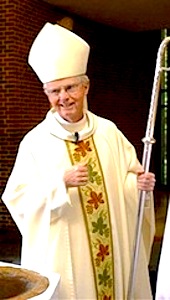 McCormack
of Manchester a “pedophile
pimp” on his Facebook
page. McCormack
of Manchester a “pedophile
pimp” on his Facebook
page.
The Republican, State
Representative D. J. Bettencourt, the House majority leader,
was responding to criticism from Bishop McCormack that state budget
cuts would hurt the most vulnerable members of society.
“Would the bishop like to discuss
his history of protecting the ‘vulnerable?’”
Mr. Bettencourt, a practicing Roman
Catholic, wrote. “This
man is a pedophile pimp who should have been led away from the State
House in handcuffs with a raincoat over his head in disgrace. He has
absolutely no moral credibility to lecture anyone.”
Mr. Bettencourt said in a statement that his criticism stemmed from
Bishop McCormack’s time as an
administrator for Cardinal Bernard F. Law in Boston, where he was
a top aide assigned to investigate complaints that priests had sexually
abused minors. He was named bishop of Manchester in
1998.
In 2002, he was part of a settlement with state prosecutors in which
the diocese acknowledged it had protected abusive priests and submitted
itself to audits. The agreement halted a criminal nvestigation.
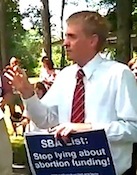
The
diocese said Mr. Bettencourt’s comments were false
and defamatory.
James Salt, acting
director of Catholics United (right), a group in Washington,
called Mr. Bettencourt “an embarrassment” and said his
group was urging Mr. Bettencourt to retract his statements.
So far, Mr. Bettencourt has stood by them, saying that the
bishop had “brought shame and dishonor on my church here in
New Hampshire.”
(Full article)
|
|
Bishops
Urge Catholic Schools to Ban a Nun’s Book
By LAURIE GOODSTEIN
The New York Times: April 1, 2011
A
committee of American Roman Catholic bishops
announced Wednesday  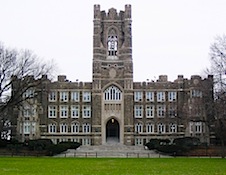 that
a popular book about God by Sister
Elizabeth A. Johnson, a theologian at Fordham
University in New York, should not be used
in Catholic schools and universities because it does not uphold church
doctrine. that
a popular book about God by Sister
Elizabeth A. Johnson, a theologian at Fordham
University in New York, should not be used
in Catholic schools and universities because it does not uphold church
doctrine.
The book, “Quest for the Living
God: Mapping Frontiers in the Theology of God,”
examines different understandings of God through experiences of the
poor and oppressed, Holocaust victims, Hispanics, women and people
of religions other than Catholicism.
Among
the chapter titles are “God Acting Womanish”
and “Accompanying God of Fiesta.”
The bishops’ committee on doctrine
said in a statement: “The book
does not take the faith of the Church as its starting point. Instead,
the author employs standards from outside the faith to criticize and
to revise in a radical fashion the conception of God revealed in Scripture
and taught by the Magisterium,” the church’s
teaching authority according to the popes and bishops.
Sister Johnson declined an interview, but said in a statement that
the bishops never invited her to discuss
the book and that she was unaware that the bishops were assessing
it until they had already decided to issue a condemnatory statement.
“One result of this absence of
dialogue is that in several key instances this statement radically
misinterprets what I think, and what I in fact wrote,”
she said. “The conclusions thus drawn paint an incorrect picture
of the fundamental line of thought the book develops. A conversation,
which I still hope to have, would have very likely avoided these misrepresentations.”
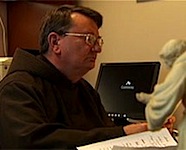 The
Rev. Thomas Weinandy, executive director of the bishops’ Secretariat
for Doctrine
(left), said several American bishops
who did not serve on the doctrine committee had raised concerns about
the book. The
Rev. Thomas Weinandy, executive director of the bishops’ Secretariat
for Doctrine
(left), said several American bishops
who did not serve on the doctrine committee had raised concerns about
the book.
Theology professors at Catholic universities said they did not see
a theological cause for the bishops to condemn Sister Johnson’s
work.
 Stephen
J. Pope, a theologian at Boston College (right), said:
“The reason is political. Certain
bishops decide that they want to punish some theologians, and this
is one way they do that. There’s nothing particularly unusual
in her book as far as theology goes. It’s making an example
of someone who’s prominent.” Stephen
J. Pope, a theologian at Boston College (right), said:
“The reason is political. Certain
bishops decide that they want to punish some theologians, and this
is one way they do that. There’s nothing particularly unusual
in her book as far as theology goes. It’s making an example
of someone who’s prominent.”
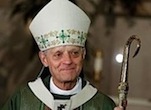 Cardinal
Donald Wuerl of Washington, the committee chairman
(left), said in a statement that Sister Johnson might have avoided
problems if she had sought a bishop’s approval, known as an
“imprimatur,”
and made revisions before publishing her book. Cardinal
Donald Wuerl of Washington, the committee chairman
(left), said in a statement that Sister Johnson might have avoided
problems if she had sought a bishop’s approval, known as an
“imprimatur,”
and made revisions before publishing her book.
Father
Weinandy said that while imprimaturs are recommended
under canon law, they are not required,
and that while they were once common, few theologians now request
them.
|
ARCHDIOCESE
of
PHILADELPHIA


CARDINAL JUSTIN RIGALI

SETH WILLIAMS
Philadelphia
District Attorney
|
Philadelphia
Archdiocese Suspends 21 Priests
By KATHARINE Q. SEELYE
The New York Times: March 8, 2011
The Archdiocese
of Philadelphia announced Tuesday that it had placed
21 priests on administrative leave from active ministry in connection
with credible charges that they had sexually abused minors.
The mass suspension was one of the single most sweeping in the history
of the sexual abuse scandal in the Roman
Catholic Church in the United States. It follows a
damning grand jury report issued Feb. 10 that accused the archdiocese
of a widespread cover-up of predatory priests stretching over decades
and that said as many as 37 priests remained active in the ministry
despite credible allegations of sexual abuse against them.
The church apparently found no credible charges against eight of the
priests. As for the rest, three were already placed on administrative
leave, and five others would have been subject to leave but were no
longer active. Two of those five no longer serve in the archdiocese
but are members of a religious order; the archdiocese said it had
notified the superiors of the religious order as well as the bishops
of the diocese in which they live.
Church officials, including Cardinal
Justin Rigali, the archbishop of Philadelphia, have
spent the last few days informing the priests of their status after
an initial review of their cases by Gina Smith, an outside lawyer
hired by the church to re-examine their cases in light of the grand
jury report.
The cardinal said the suspensions were interim measures, pending fuller
investigations of their cases.
He also apologized for the behavior of abusive priests.
“As we strive to move forward today,” Cardinal Rigali
added, “I wish to express again my sorrow for the sexual abuse
of minors committed by any members of the church, especially clergy.”
“I am truly sorry for the harm done to the victims of sexual
abuse, as well as to the members of our community who suffer as a
result of this great evil and crime,” he said.
The announcement Tuesday was a major
embarrassment for Cardinal Rigali, who, in response to the grand jury
report, had initially said that there were no priests in active ministry
“who have an admitted or established allegation of sexual abuse
of a minor against them.”
The district attorney
immediately indicted five people — two
priests, a former priest, a parochial school teacher and a high-ranking
church official. Within 10 days of the grand jury
report, Cardinal Rigali placed three other priests whose activities
had been detailed by the grand jury on administrative leave.
The archdiocese said that the cases against the priests on administrative
leave involved a range of charges, “from allegations of sexual
abuse of a minor to boundary issues with minors.” It did not
elaborate.
(Full
article)
|
ARCHDIOCESE
of
PHILADELPHIA


DAVID
J. O'BRIEN
"Boston Reborn"

CARDINAL JUSTIN RIGALI
|
In
Philadelphia, New Cases Loom in Priest Scandal
By KATHARINE Q. SEELYE
The New York Times: March 5, 2011
PHILADELPHIA — Three
weeks after a scathing grand jury report said the Archdiocese
of Philadelphia had provided safe haven
to as many as 37 priests who were credibly accused of sexual abuse
or inappropriate behavior toward minors, most of those priests remain
active in the ministry.
The possibility that even one predatory priest, not to mention three
dozen, might still be serving in parishes — “on duty in
the archdiocese today, with open access to new young prey,”
as the grand jury put it — has unnerved many Roman Catholics
here and sent the church reeling in the latest and one of the most
damning episodes in the American church since it became engulfed in
the sexual abuse scandal nearly a decade ago.
The situation in Philadelphia is “Boston
reborn,” said David
J. O’Brien, who teaches Catholic history at
the University of Dayton.
The Boston Archdiocese was engulfed in a scandal starting in 2002
involving widespread sexual abuse by priests and an extensive cover-up
that reached as high as the cardinal.
The church has not explained directly why these priests, most of whom
were not publicly identified, are still active, though it is under
intense pressure to do so. Cardinal
Justin Rigali initially said there were no active
priests with substantiated allegations against them, but six days
later, he placed three of the priests, whose activities had been described
in detail by the grand jury, on administrative leave.
He
also hired an outside lawyer, Gina Maisto
Smith, a former assistant district attorney who prosecuted
child sexual assault cases for 15 years, to re-examine all cases involving
priests in active ministry and review the procedures employed by the
archdiocese.
|
|
Priest
Is Sentenced to Prison
By GAIA PIANIGIANI
The New York Times: March 5, 2011
Italy
— A
Rome court has sentenced a Catholic priest to 15 years and four months
in prison for sexually abusing minors, in one of the rare cases in
Italy in which a bishop was called to testify in civil court. The
Rev. Ruggero Conti,
from a parish in Rome, was found guilty on Thursday of abusing seven
minors between 1998 and 2008, a lawyer for the priest said. The court
also ordered Father Conti to pay 50,000 euros ($70,000) in damages
to each victim.
Father Conti was suspended from his duties as a parish priest in the
outskirts of Rome soon after his arrest in 2008, but not from his
clerical duties, said his lawyer, Patrizio Spinelli.
He said his client would appeal the ruling.
(Full
article)
|

DR.
EDWARD PETERS
Canon lawyer to the
Apostolic Signature
|
Deny
Gov. Cuomo Communion, Says Vatican Advisor In NYC
CBS New York: February 23, 2011
NEW YORK — According to church canon, is New
York Gov. Andrew Cuomo eligible to receive communion?
Dr. Edward Peters,
American lay canon lawyer and advisor for the Apostolic
Signatura, the Vatican’s highest court, says no.
In an email interview with CNSNews.com
Monday, Dr. Peters argued the Roman Catholic governor should refrain
from receiving communion, and he should be denied the sacrament, given
that he 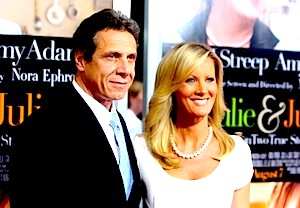 lives
with his girlfriend, Food Network hostess
Sandra Lee. lives
with his girlfriend, Food Network hostess
Sandra Lee.
Dr. Peters cites canon 915 from the Church’s Code
of Canon Law, which says people “who obstinately
persist in manifest grave sin, are not to be admitted to holy communion,”
and contends that Cuomo’s living with Lee despite not being
married, meets the requirements of this law.
“The governor, with complete freedom,
is publicly acting in violation of a fundamental moral expectation
of the Church. On these facts alone, his taking holy communion is
objectively sacrilegious and produces grave scandal within the faith
community,” Dr. Peters wrote.
Aside from cohabitation with his girlfriend,
Dr. Peters argued that another of Cuomo’s actions should disqualify
him from eligibility: support of abortion.
“Does Gov. Andrew Cuomo’s public policy of supporting
abortion and passage of the Reproductive Rights Act constitute —
in the objective order – ‘persevering in manifest grave
sin’ and should Cuomo therefore not ‘not be admitted to
holy communion’?” CNSNews.com asked Dr. Peters.
His answer: “I would want experts
on New York law and politics to verify a few facts here, but based
on what is widely reported about the governor’s consistent support
for abortionism in New York, I see no other way to interpret his abortion-related
conduct except as sufficient to warrant withholding of holy communion
from him under Canon 915.”
There was no response from the governor as of Wednesday morning.
(Full
article)
|
 JEFFREY
ANDERSON
JEFFREY
ANDERSON
Attorney |
Lawyer
In Wisc. Church Abuse Fund Suit Hopes To Question Dolan
CBS NewYork February 12, 2011
NEW YORK — New York Archbishop
Timothy Dolan might get dragged back to his days in
the Milwaukee diocese,
where he was in charge 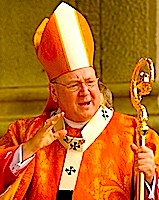 from
2002 to 2009. from
2002 to 2009.
A lawyer representing people who claim priest sex abuse said he wants
to question Dolan about missing assets in the sex scandal, charging
that the diocese could be hiding as much as $130  million
in assets to protect against lawsuits. million
in assets to protect against lawsuits.
Joe Zwilling (right)
with the New York Archdiocese told WCBS 880 said he
believes it’s just something the lawyer said to a reporter.
A spokesman for the archdiocese issued the following statement to
CBS 2: “Archbishop
Dolan would welcome the opportunity to cooperate with any law enforcement
people who are investigating the matter. Any allegation that there
was an attempt to shield money is preposterous. It is simply not true.”
The Milwaukee Journal-Sentinel
reported that the lawyer, Jeffrey Anderson,
claimed the church in Milwaukee moved $75
million off its books in 2004, and moved $55 million
more to a cemetery trust, just after a court gave victims the right
to sue.
(Full
article)
|

CONGREGATION
OF THE SACRED HEARTS OF JESUS AND MARY

REV. MARTIN P. O'LOGHLEN

MSGR. MICHAEL MEYERS

ROMAN
CATHOLIC ARCHDIOCESE OF LOS ANGELES
|
Los
Angeles Archdiocese to Dismiss Priest Over Admission of Molesting
Girl
By JENNIFER MEDINA
The New York Times: February 12, 2011
LOS
ANGELES — A priest accused of having a long-term sexual
relationship with a teenage girl, writing her decades later to ask
for forgiveness and declare that he was a sex addict, is being 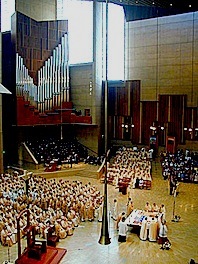 removed
from ministry in a parish, and the diocese’s vicar of clergy
has also resigned, officials of the Roman
Catholic Archdiocese of Los Angeles said Friday. removed
from ministry in a parish, and the diocese’s vicar of clergy
has also resigned, officials of the Roman
Catholic Archdiocese of Los Angeles said Friday.
The
priest, the Rev. Martin P. O’Loghlen,
was once a leader in his religious order
[the Congregation of the Sacred Hearts of Jesus and Mary]
and was appointed to an archdiocesan
sexual abuse advisory board, although officials at both the order
and the archdiocese knew at the time about his admission of sexual
abuse and addiction. He served on the board, which
was meant to review accusations of abuse by priests, for at least
two years in the late 1990s, according to church and legal documents.
Tod Tamberg, a spokesman for the archdiocese,
said church officials planned to announce the removal of Father O’Loghlen
from his current parish in San Dimas
on Sunday. Church officials decided to act after being contacted by
a reporter about the priest’s history of sexual abuse.
Mr. Tamberg said in a statement that officials of the priest’s
religious order assured the archdiocese in 2009 that Father O’Loghlen
was fit for the ministry. He said that the
archdiocese’s vicar for clergy, Msgr. Michael Meyers,
resigned on Friday. Monsignor Meyers had been in the position since
July 2009 and it 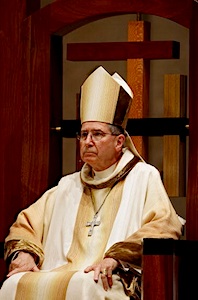 was
his job to grant clergymen what are known as faculties to serve as
priests. was
his job to grant clergymen what are known as faculties to serve as
priests.
The Los Angeles Archdiocese,
led by Cardinal Roger M. Mahony
(right), has been rocked by sexual abuse accusations for years. In
2007, it agreed to a $660 million settlement with 508 people who said
that priests had sexually abused them as children.
“The failure to fully check records
before granting priestly faculties is a violation of archdiocesan
policy,” Cardinal Mahony said in a statement.
“We owe it to victims and to all our faithful to make absolutely
certain that all of our child protection policies and procedures are
scrupulously followed.”
Pictured
top right: Cathedral of Our Lady of the Angels
|
ARCHDIOCESE
of
PHILADELPHIA


REV.
EDWARD AVERY

REV. CHARLES ENGLEHARDT

BERNARD SHERO

REV. JAMES BRENNAN

MSGR. WILLIAM LYNN
|
Philadelphia
Priests Accused by Grand Jury of Sexual Abuse and Cover-Up
By JON HURDLE
The New York Times: February 11, 2011
PHILADELPHIA — A grand
jury on Thursday accused the Archdiocese
of Philadelphia of failing to stop the sexual abuse
of children more than five years after a grand jury report documented
abuse by more than 50 priests.
The new report said a senior church official
charged with investigating allegations of sexual abuse by priests had
in fact allowed some of those accused to remain in posts that gave them
continued access to children. It charged him with endangering the welfare
of minors and accused three priests and a teacher of raping two boys
between 1996 and 1999.
“By no means do we believe that these were the only two parishioners
who were abused during this period,” the report said.
At least 37 priests who are subject to “substantial evidence of
abuse” are still in roles that bring them into contact with children,
the new report said, and 10 of those have been in place since before
2005, when the last grand jury made its allegations.
The Rev. Edward Avery,
68, and the Rev. Charles Engelhardt,
64, were charged with the rape and indecent assault of a 10-year-old
boy in St. Jerome Parish in Northeast
Philadelphia in 1998 and 1999. The teacher,
Bernard Shero, 48, was accused of assaulting the
same boy in 2000.
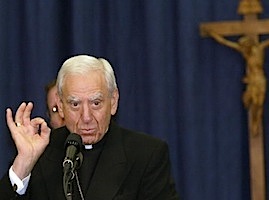 The
Rev. James Brennan, 47, was accused of assaulting a
14-year-old boy in 1996. All three priests were under arrest on Thursday. The
Rev. James Brennan, 47, was accused of assaulting a
14-year-old boy in 1996. All three priests were under arrest on Thursday.
The report also charged Msgr. William
Lynn, secretary of clergy in the archdiocese under former
Cardinal Anthony J. Bevilacqua (right), with endangering
the welfare of children by allowing “dangerous” priests
to remain in place. Monsignor Lynn was responsible for investigating
abuse allegations from 1992 to 2004.
“The rapist priests we accuse were
well known to the Secretary of Clergy,
but he cloaked their conduct and put them in place to do it again,”
the grand jury said.
Monsignor Lynn faces a maximum of 14 years in prison
if convicted on all charges. The 124-page report, which contains graphic
descriptions of abuse of the 9- and 10-year-old boys, said the grand
jury decided “reluctantly” not to press charges against
Cardinal Bevilacqua, who stepped down in 2003 after 15 years as archbishop,
even though he worked closely with Monsignor Lynn, because it did not
have enough evidence.
 In a statement issued late on Thursday, Cardinal
Justin Rigali, the archbishop of Philadelphia (right),
rejected the report’s assertion that there were active priests
who had been credibly accused of abuse.
In a statement issued late on Thursday, Cardinal
Justin Rigali, the archbishop of Philadelphia (right),
rejected the report’s assertion that there were active priests
who had been credibly accused of abuse.
“I assure all the faithful that
there are no archdiocesan priests in ministry today who have an admitted
or established allegation of sexual abuse of a minor against them,”
he said.
The report accused the archdiocese of lacking urgency in its efforts
to eradicate sexual abuse by its priests.
It said a panel looking into the allegations dismissed charges against
a priest by two independent victims, saying their evidence lacked credibility.
“These are simply not the actions of an institution that is serious
about ending sexual abuse of children,” the report said. |

CARDINAL
ADRIANUS SIMONIS

MARTIN DE WITTE
Advocaat
|
News
Reports Say Cardinal Protected an Abuser
By STEPHEN CASTLE
The New York Times: February 10, 2011
BRUSSELS
— The sexual abuse crisis in the Roman Catholic Church
in the Netherlands deepened Thursday when news reports said one of
its senior figures had shielded a pedophile priest.
Reports in three news media outlets increased the pressure on the
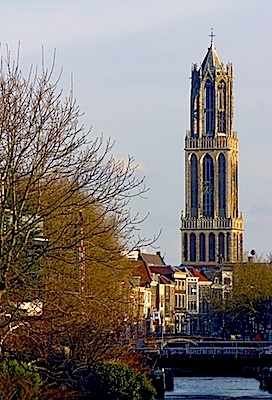 cardinal,
Adrianus Simonis, the retired archbishop
of Utrecht, who testified last month as a witness
in a legal action taken by one of almost 2,000 people who have said
they were victims of abuse. cardinal,
Adrianus Simonis, the retired archbishop
of Utrecht, who testified last month as a witness
in a legal action taken by one of almost 2,000 people who have said
they were victims of abuse.
The crisis in the Netherlands
is another setback for the Roman Catholic Church, which has been struggling
with sexual abuse allegations from Ireland and Belgium to the United
States.
Cardinal Simonis caused some distress in the Netherlands last March,
when he was asked on television about the hundreds of complaints surfacing
against the church and replied in German
rather than Dutch, saying “Wir
haben es nicht gewusst” — or “We
knew nothing about it.”
The phrase, which is associated with
Nazi excuses after World War II, drew uncomfortable
parallels for the church, which has been accused of covering up the
issue of sexual abuse.
The reports on Thursday, by Radio Netherlands
Worldwide, the newspaper
NRC Handelsblad and the Dutch television program “Nieuwsuur,”
said the cardinal was told by the bishop of Rotterdam at the time,
Philippe Bar, that during the 1980s a priest had sexually abused boys
in a parish in Zoetermeer.
Archbishop Simonis later arranged for the man to be moved to a parish
in Amersfoort.
The news reports did not name the priest
suspected of abuse.
In a statement issued Thursday, Cardinal Simonis said the priest had
been allowed to continue working in a parish only after undergoing
lengthy therapy and on the basis of a psychological report. If new
evidence about the case emerged that cast doubt on his decision, he
said, that would be regrettable.
On Thursday, Martin de Witte, a lawyer
acting for several of those who said they had been abused, said the
news reports proved that pedophiles had been systematically protected.
“He didn’t do anything,” Mr. de Witte said of the
cardinal, adding, “He was not protecting the children; he was
protecting the people who did the abuse.”
Figures released in December showed that almost 2,000 people had made
complaints of sexual or physical abuse against the church.
(Full
article)
|
 MARRIAGE
MARRIAGE
Is Not an Absolute Right |
Pope:
Marriage Is Not an Absolute Right
Benedict Tells Priests to Do a Better
Job Counseling Would-Be Spouses to Ensure Their Marriages Last
The Associated Press: Jan. 22, 2011
VATICAN CITY - Pope Benedict
XVI told priests Saturday to do a better job counseling would-be
spouses to ensure their marriages last and said no one has an absolute
right to a wedding.
Benedict made the comments in his annual speech to the Roman Rota, the
Vatican tribunal that decides marriage annulments. An annulment is the
process by which the church effectively declares that a marriage never
took place.
|
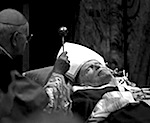
JOHJN
PAUL II
|
John
Paul II's Blood to Be Holy Relic in Poland
Vial
of Late Pope's Blood Will Be Installed in Krakow Church; Pope Benedict
Announced Predecessor's
CBS/AP: Jan.
17, 2011
WARSAW,
Poland - An official says a vial
containing the blood of Pope
John Paul II will be installed as a relic in a Polish
church soon after his beatification.
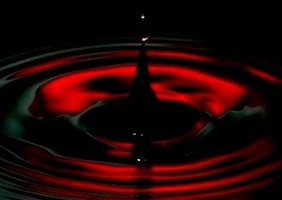
Piotr Sionko, the spokesman for
the John Paul II Center, says the vial will be built into the
altar of a church in Krakow that is opening in May.
Sionko said Monday the idea came from Cardinal
Stanislaw Dziwisz, the archbishop of Krakow
and the longtime friend and secretary of the late Polish pontiff.
Sionko said the blood was drawn for medical tests at Rome's Gemelli
 Polyclinic
shortly before John Paul's death on April 2, 2005, and has been in Dziwisz's
care. Polyclinic
shortly before John Paul's death on April 2, 2005, and has been in Dziwisz's
care.
Benedict, in the fastest process on record, set May 1 as the date for
John Paul's beatification - a key step toward Catholicism's highest
honor and a major morale boost for a church reeling from the clerical
sex abuse scandal. |
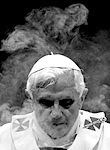 BENEDICT
XVI
BENEDICT
XVI |
Italy:
Pope Favors Design, Not Accident
By ELISABETTA POVOLEDO
January 6, 2011
Pope
Benedict XVI said Thursday that God’s knowledge,
love and  “inexhaustible
creativity” — not chance — lay
at “inexhaustible
creativity” — not chance — lay
at 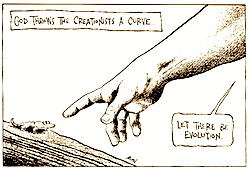 the
origins of the universe. Scientific concepts suggesting
the formation of the universe was accidental, like the Big Bang theory,
“only arrive at a certain point,” the pope told worshipers
in St. Peter’s Basilica on Thursday. The church no longer says
that the process of evolution violates its teachings, but for the church,
God remains the ultimate creator. the
origins of the universe. Scientific concepts suggesting
the formation of the universe was accidental, like the Big Bang theory,
“only arrive at a certain point,” the pope told worshipers
in St. Peter’s Basilica on Thursday. The church no longer says
that the process of evolution violates its teachings, but for the church,
God remains the ultimate creator. |
 MSGR.
CHARLES M. KAVANGH
MSGR.
CHARLES M. KAVANGH |
A
Monsignor Is Defrocked for Abusing a Student
By PAUL VITELLO
The New York Times: December 17, 2010
A once-influential Roman Catholic monsignor who
oversaw fund-raising for the Archdiocese of New York, running the annual
Alfred E. Smith political dinner during the tenure of Cardinal John
J. O’Connor, has been removed from the priesthood after an eight-year
church review of sexual abuse accusations against him, the archdiocese
announced on Friday.
Msgr. Charles M. Kavanagh, in a 2003 photo,
was defrocked by a Roman Catholic church tribunal
that reviewed allegations that he sexually abused a seminarian in the
1980s. He was one of the highest-ranking priests in New York to face
accusations of sexual misconduct.
The monsignor, Charles M. Kavanagh, 73,
has denied the charges, which were brought against him by a former student
at the former Cathedral Preparatory Seminary
in Manhattan. The monsignor contested an archdiocesan review board’s
finding of guilt in 2003, then asked the Vatican to authorize a formal
trial by a tribunal of priests from another diocese. When that body
also found him guilty, he sought an appeal from a second tribunal.
On Wednesday, the second tribunal concluded its review, ruling that
Monsignor Kavanagh should be defrocked, said Joseph Zwilling, the spokesman
for the New York archdiocese. The announcement was made after two days,
late on a Friday afternoon, because “we have not dealt with this
kind of situation before,” Mr. Zwilling said.
Nineteen priests in the archdiocese have been discharged from the priesthood
since 2002, when a sexual abuse scandal shook the church nationwide.
He is also one of the highest-ranking local priests to have been caught
up in the accusations.
Daniel Donohue, 46, the former seminarian
who accused Monsignor Kavanagh of making unwanted advances and touching
him inappropriately in the 1980s, said, “I’m glad for the
validation of my credibility.” But he criticized the slowness
and opacity of the church’s judicial process. “For eight
years, I never knew where the process was,” he said by phone from
Portland, Ore., where he lives with his wife and four children. “I
have classmates who are going through similar processes. I just hope
it doesn’t take eight years for them, too.” |

TONY
WALSH

ARCHBISHOP
DIARMUID MARTIN
|
Vatican
Shielded Dublin Priest Until He Raped Boy in Pub, Inquiry Says
THE ASSOCIATED PRESS: December 17, 2010
DUBLIN — The Vatican tried to stop church
leaders here from defrocking a particularly dangerous pedophile priest
and relented only after he raped a boy in a restroom at a pub, according
to an investigation released Friday.
Archbishop Diarmuid Martin of Dublin said
he fully accepted the findings of the latest chapter in Ireland’s
investigation into child abuse by priests in Dublin who were shielded
from the law by Catholic leaders.
Archbishop Martin called the priest, Tony Walsh,
an “extremely devious man” who should never have been ordained.
A state-ordered investigation into cover-ups by
the Dublin Archdiocese reported last year that church officials
had shielded scores of priests from criminal investigation over several
decades and did not report any crimes to the police until the mid-1990s. |
 REV
MARCIAL
REV
MARCIAL
MACIEL DEGOLLADO |
Mexico:
Order Shelves Founder’s Photos
THE ASSOCIATED PRESS: December 13, 2010
The Legionaries of Christ
is ordering images of its disgraced founder removed from its buildings
worldwide as part of Vatican-mandated reforms. The conservative order
says photographs showing the Rev. Marcial Maciel
Degollado alone or with the pope must be removed from its installations.
Father Maciel, who died in 2008, was found to have molested seminarians
for decades and fathered three children.
(Full
article)
|

CARDINAL
ANGELO SODANO

AMBASSADOR
JAMES NICHOLSON

REV. THOMAS G. BOHLIN

ROBERT P. HANSSEN
|
Leaked
Cables Show Vatican Tensions and Diplomacy With U.S.
By RACHEL DONADIO
The New York Times: December 10, 2010
ROME — Recently released diplomatic cables
show the Vatican fighting to shore up  its
eroding control over sexual abuse scandals in the United States and
Ireland, highlighting complex tensions between the Vatican hierarchy,
local bishops and civil authorities. its
eroding control over sexual abuse scandals in the United States and
Ireland, highlighting complex tensions between the Vatican hierarchy,
local bishops and civil authorities.
The cables were obtained by WikiLeaks
and made available to The New York Times
and other news organizations.
Some
cables read in part like thrillers, like when Opus
Dei, the powerful religious order, took pains to distance itself
from one of its members: Robert P. Hanssen,
an F.B.I. agent who in a dramatic case in 2001 pleaded guilty to being
a longtime Russian spy.
A
cable sent that year by the United States Embassy
to the Holy See said that Cardinal Angelo
Sodano, Pope John Paul II’s last secretary of state,
“took the bulk of his initial meeting” with Ambassador
James Nicholson “to register his displeasure with the
several lawsuits filed in U.S. courts that have been served at the
Vatican.”
It added that Cardinal Sodano “complained about the ‘aggressive
attorneys’ who had started in on the Vatican with the sexual
abuse scandal and had also filed suits about Nazi-era gold allegedly
acquired by the Holy See.”
“It’s one thing for them to sue bishops,” the cable
quoted him as saying, “but another thing entirely to sue the
Holy See.”
Cardinal Sodano urged Ambassador Nicholson to help defend the Holy
See’s sovereignty.
In 2005, the State Department argued that Pope Benedict XVI should
be immune from a lawsuit accusing him of conspiracy to hide abuse
because he was a head of state. A federal judge later dismissed the
case.
The sovereignty issue emerged again more recently in Ireland, where
two government-appointed commissions released reports in 2009 revealing
a widespread cover-up of abuse, shaking the Irish church to its core.
According to a cable sent in February from the American Embassy to
the Holy See, requests by Irish investigators “offended”
many in the Vatican “because they saw them as an affront to
Vatican sovereignty.”
Other
cables show the Catholic Church to be deeply involved in local politics
worldwide and a useful source of information for American diplomats,
especially in places like Cuba and Venezuela. One cable from 2006
said that a Venezuelan clergyman might be a good source on President
Hugo Chávez.
A
2002 cable said that “despite the real progress” under
John Paul in the Vatican’s relations with Judaism, some in the
hierarchy still “manifested remnants of
anti-Semitic sentiments.”
It cited “an older desk officer of French origin” who
complained that the United States government’s
“strong interest in modern European anti-Semitism stemmed from
the ‘excessive influence of Jews in your media and government,’
” while another curial official said some lawsuits
against the Holy See “were the result of ‘Jewish judges
having too much influence.’ ”
In
one of the most mysterious cables in the lot, in March 2001, the
chancellor of the Prelature of Opus Dei, the Rev.
Thomas G. Bohlin, “requested an urgent meeting”
with the chargé d’affaires at the American Embassy to
the Holy See. “Bohlin said that Opus Dei had conducted an accounting
of all financial contributions” made by Mr. Hanssen, then accused
and later convicted of spying for Russia.
Father Bohlin “claimed that Hanssen contributed $4,000 through
1992 and made no contributions after 1992” and added that when
arrested he was still “a member in good standing.”
“Request for urgent meeting struck post as unusual. This is
the first time Opus Dei has officially asked for a meeting,”
the cable continued. “It appears that
Opus Dei is attempting to preempt any charges that it profited financially
from alleged activities of Hanssen.”
|

PROFESSOR
PETER NISSEN

CARDINAL
ADRIANUS SIMONIS

REV. FEDERICO LOMBARDI
|
Dutch
Panel Found 2,000 Church Abuse Claims
By STEPHEN CASTLE
The New York Times: December 9, 2010
BRUSSELS — The Roman
Catholic Church, battered by sexual abuse scandals from the United
States to Belgium, is facing a new set of allegations now in the Netherlands.
Figures released Thursday by an investigative commission showed that
almost 2,000 people have made complaints of sexual
or physical abuse against the church, in a country with only
4 million Catholics.
“The Roman Catholic church has not faced a crisis like this since
the French Revolution,” said Peter Nissen,
professor of the history of religion at Radboud
University, of the growing abuse scandal.
With one legal case starting this week, and accusations against two
former bishops, the reaction of the church appears to have fueled the
crisis. Nearly all of the cases are decades old, with probably no more
than 10 from the last 20 years.
Asked in March on TV about the hundreds of complaints already surfacing
then, one of its most senior figures, Cardinal
Adrianus Simonis, shocked the nation by replying not in Dutch but in
German.
“Wir haben es nicht gewusst”
— we knew nothing — he said, using a
phrase associated with Nazis excuses after the Second World War
- a parallel that has reverberated around the Netherlands.
“A lot of people perceived it as an affirmation of the culture
of covering up cases,” said Professor Nissen, adding that, because
of its association with the Nazis, it meant to many “’we
should have known’ or ‘we knew but we didn’t want
to know.’”
The Rev. Federico Lombardi, the Vatican spokesman,
said he had no comment, saying that the matter was in the hands of Dutch
bishops. |
 REV.
GARY THOMAS
REV.
GARY THOMAS |
Scare
the hell out of 'em
Real-life exorcist the 'rite' guy for
job of casting out demons
By GINGER ADAMS OTIS
The New York Post: November 28, 2010
The Rev. Gary Thomas
knew the young lady was suffering the moment he met her.
"Lisa," a twenty-something married woman, was brought to
the Catholic priest's Sacred Heart Church in Saratoga, Calif., by
family members unable to explain her sudden spike in violent behavior.
"I felt a huge presence in the room," said Thomas, an ordained
priest who is the chief exorcist in Northern California.
The holy man immediately said a prayer of deliverance over the young
lady -- and even that small religious act got a frightening response.
"Her face started to distort, she started speaking a language
not known to me that she hadn't been competent in before. She was
hissing and spitting and exhibiting a  serpentine
look both in her body language and her face. She kept rolling her
eyes," he said. serpentine
look both in her body language and her face. She kept rolling her
eyes," he said.
To his trained eye, it pointed to one thing:
DEMONIC POSSESION!
>
"I laid my crucifix on her. She let out an incredible scream.
I took my stole, which represents my authority as a member of the
Catholic Church and as a priest, and I laid it on her. "She literally
slid out of the chair and onto the floor to get away from it. I said
'That's enough for today.' "
Thomas, 57, is one of the church's small but growing army of priests
trained to perform exorcisms -- a long-standing ritual that fell out
of practice in the United States several decades ago, in part because
of Hollywood movies like "The Exorcist" that sensationalized
the rite.
Thomas, who was sent to Rome by his bishop five years ago for exorcism
training, is unabashed about his belief that demonic possession is
real, even though there are many doubters even within the church.
"We need to start an exorcism school here. We need a system.
We don't have any training in place," Thomas said. There are
185 Catholic dioceses in the country, and only about two dozen have
a trained exorcist on staff, he estimates. The New York Archdiocese
has someone it can call if necessary but doesn't employ a full-time
exorcist.
But demand for the exorcism ritual is at an all-time high -- so much
so that priests can't keep pace with requests, the church admits.
This month, it held a conference for exorcism in Maryland to help
acquaint priests and bishops with the practice, which is far more
common in Europe and Africa than in the United States.
In the five years that he's been an exorcist, Thomas has performed
just five exorcisms. But his requests for the rite number in the thousands.
"Many
demonic victims have been sexually abused because such a trauma causes
a wound to the soul, and that allows a demon a way to get through,"
the priest said. He also discovered that the mother of Lisa's former
boyfriend was suspected of asking a Mexican witch doctor to put a
curse on her.
|

REV.
FERNANDO KARADIMA

JUAN PABLO HERMOSILLA
Plaintiffs'
attorney
|
Plaintiffs
in Chile Won’t Appeal Dismissal
of Sexual Abuse Case
By PASCALE BONNEFOY
The New York Times: November 25, 2010
SANTIAGO, Chile — The plaintiffs in a
sexual abuse case against a prominent Chilean priest will not appeal
a court ruling dismissing the case, their lawyer said Thursday.
A criminal judge investigating the accusations against the priest,
the Rev. Fernando Karadima, 80, closed
the case abruptly this week, ruling that there was not enough evidence
to charge him.
The four plaintiffs, who said they were abused by Father Karadima
as teenagers, have until Friday to appeal the decision, but plan not
to.
“They are disappointed, tired and angry, and feel they have
done all they can do,” their lawyer, Juan
Pablo Hermosilla, said in a telephone interview. “Their
main goal was to turn the light on and show what Karadima has done
all these years, and they believe that they have accomplished it,
that the abuses have been clearly proved, regardless of the court
decision.”
One of the plaintiffs, Dr. James Hamilton,
who said he had been abused by the priest for
20 years, starting when he was 17, criticized the proceedings
against Father Karadima as “extraordinarily irregular.”
“We would have liked to appeal, but with defense attorneys like
his, who have the Appeals and Supreme Court eating out of their hands,
and a number of powerful people who continue to protect Karadima,
we knew it would be an uphill battle that we were likely to lose,”
he said.
Father Karadima still faces the possibility of church sanction. The
archbishop of Santiago, Cardinal Francisco Javier
Errázuriz, sent an investigation report prepared by
the Roman Catholic Church in Chile to the Vatican in June, asking
it to rule in the case.
Father Karadima, who could not be reached for comment, has insisted
that he is innocent.
A criminal complaint filed in April accused him of molesting the four
plaintiffs, three when they were minors, over the last two decades
in El Bosque Parish in Santiago. Since
hearings in the case began, four other men have come forward with
similar accusations.
Mr. Hermosilla said the state prosecutor had gathered testimony from
dozens of witnesses that “established a pattern of decades of
abusive behavior.”
The
judge, Leonardo Valdivieso, never gave
the parties access to the investigation report until the day he closed
the case and withheld testimony and other evidence that could have
advanced it.
Judge
Valdivieso dismissed the case without having Father Karadima face
his accusers, as they had requested. Defense lawyers presented the
court with a number of medical certificates asserting that the priest
could have a heart attack if forced to do so.
|
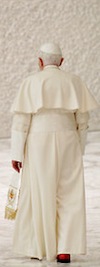 POPE
BENEDICT XVI
POPE
BENEDICT XVI |
Pope’s
Comments on Condoms Sow Confusion
By RACHEL DONADIO
Published: November 22, 2010
ROME — In a papacy troubled by communications
missteps, Pope Benedict XVI’s unprecedented
new book of interviews with a German journalist sought to clarify
matters by going straight to the source.
But ever since the Vatican’s official newspaper published highlights
on Saturday, the book has created the opposite effect: widespread
confusion, most notably over the pope’s comments that in select
cases, such as those involving male prostitutes,
condom use might be a step toward acting responsibly to reduce “the
risk of 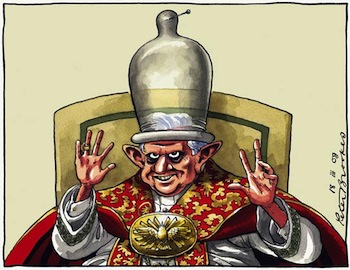 infection.” infection.”
AIDS activists are calling the pope’s comments a breakthrough,
while members of the church hierarchy and some Catholic commentators
say the comments have been misconstrued. The Vatican itself has furiously
played down Benedict’s words, or rather contextualized them,
noting that the pope was not changing church doctrine banning contraception,
or justifying condom use — even though the Vatican newspaper
clearly used the phrase “justified in some cases.”
As
is often the case with the Vatican, the clarification yielded more
ambiguity. Was Benedict, in his book of interviews with the German
journalist, Peter Seewald, opening up a conversation on condom use
— albeit in specific cases to prevent AIDS between male sex
partners — or wasn’t he? And how is the world supposed
to consider remarks by the pope that are not official church teaching?
In
the new book, “Light of the World,” to be published Tuesday,
Benedict said condoms were not “a real or moral solution”
to the AIDS epidemic, adding that that “can really lie only
in a humanization of sexuality.”
But he added that “there may be a basis in the case of some
individuals, as perhaps when a male prostitute uses a condom, where
this can be a first step in the direction of a moralization, a first
assumption of responsibility.”
|

JOHAN
VEYS

FRANCK PLOUM

Federico Lombardi

ARCHBISHOP
ANDRÉ-JOSEPH LÉONARD
|
Catholics
in Belgium Start Parishes of Their Own
By DOREEN CARVAJAL
The New York Times: November 17, 2010
BUIZINGEN, Belgium — Willy Delsaert
(below right) is a retired railroad employee 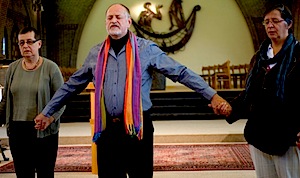 with
dyslexia who practiced intensively before facing the suburban Don
Bosco Catholic parish to perform the Sunday Mass rituals he
grew up with. with
dyslexia who practiced intensively before facing the suburban Don
Bosco Catholic parish to perform the Sunday Mass rituals he
grew up with.
“Who takes this bread and eats,” he murmured, cracking
a communion wafer with his wife at his side, “declares a desire
for a new world.”
With those words, Mr. Delsaert, 60, and his fellow parishioners are
discreetly pioneering a grass-roots movement that defies centuries
of Roman Catholic Church doctrine by worshiping and sharing communion
without a priest.
Don Bosco is one of about a dozen alternative Catholic churches that
have sprouted and grown in the last two years in Dutch-speaking regions
of Belgium and the Netherlands. They are an uneasy reaction to a combination
of forces: a shortage of priests, the closing of churches, dissatisfaction
with Vatican appointments of conservative bishops and, most recently,
dismay over cover-ups of sexual abuse by priests.
The churches are called ecclesias, the
word derived from the Greek verb for “calling
together.” Five were started last year in the Netherlands
by Catholics who broke away from their existing parishes, and more
are being planned, said Franck Ploum,
who helped start an ecclesia in January in Breda, the Netherlands,
and is organizing a network conference for the groups in the two countries.
“We
are resisting a little bit like Gandhi,” said Johan
Veys, a married former priest who performs baptisms and recruits
newcomers for other tasks at Don Bosco. “Our intention is not
to criticize, but to live correctly. We press onward quietly without
a lot of noise. It’s important to have a community where people
feel at home and can find peace and inspiration.”
In
the view of Rome, only ordained priests can celebrate Mass or preside
over most sacraments like baptisms and marriage. “If there are
persons or groups that do not observe these norms, the competent bishops
— who know what really happens — have to see how to intervene
and explain what is in order and out of order if someone belongs to
the Catholic Church,” the Rev. Federico
Lombardi, director of the Vatican press office, said.
The primate of Belgium, Archbishop André-Joseph
Léonard of Mechelen-Brussels, has already raised objections
to the alternative services, calling them “unacceptable practices.”
|

ARCHBISHOP
ANDRÉ-JOSEPH LÉONARD

CARDINAL
GODFRIED DANNEELS
|
New
Archbishop Represents a Shift for the Church
By DOREEN CARVAJAL
The New York Times: November 16, 2010
Archbishop André-Joseph Léonard
has taken a self-imposed vow of public silence until December, but his
conservative comments are still managing to rile the flock, from Roman
Catholics in the pews and bishops to Prime Minister Yves Leterme of
Belgium.
The archbishop was appointed primate of the Belgian church by Pope Benedict
XVI last January at age 70, part of a strategic pattern of placing fellow
conservatives in prominent leadership roles. Born in Namur, Archbishop
Léonard was raised by his widowed mother, whose four sons all
became priests.
The appointment of Archbishop Léonard marked a shift from the
more liberal, open style of Cardinal Godfried
Danneels. Archbishop Léonard took the position weeks before
a crisis over priestly sex abuse shook the Belgian church. His views
on subjects from AIDS to altar boys have since stirred anger; academics
at Catholic University of Louvain are circulating a petition demanding
his resignation as chancellor there.
As archbishop, his outspoken style provoked a furious backlash when
he described AIDS as a form of justice for promiscuous
homosexual sex and suggested that prosecution of retired priests was
vengeance that was not humane. |

CARDINAL
DANIEL DiNARDO

CARDINAL
TIMOTHY DOLAN
|
Catholic
bishops: More exorcists needed
RACHEL ZOLL
Associated Press, November 12, 2010
NEW
YORK — Citing a shortage of priests who can perform the rite,
the nation's Roman Catholic bishops are sponsoring a conference on
how to conduct exorcisms.
The two-day training, starting Friday in Baltimore, is to outline
the scriptural 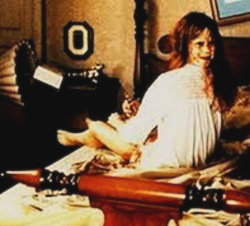 basis
of evil, instruct clergy on evaluating whether a person is truly possessed,
and review the prayers and rituals that comprise an exorcism. Among
the speakers will be Cardinal Daniel DiNardo,
archbishop of Galveston-Houston, Texas, and a priest-assistant to
New York Archbishop Timothy Dolan. basis
of evil, instruct clergy on evaluating whether a person is truly possessed,
and review the prayers and rituals that comprise an exorcism. Among
the speakers will be Cardinal Daniel DiNardo,
archbishop of Galveston-Houston, Texas, and a priest-assistant to
New York Archbishop Timothy Dolan.
"Learning the liturgical rite is not difficult," DiNardo
said in a phone interview. "The problem is the discernment that
the exorcist needs before he would ever attempt the rite."
More than 50 bishops and 60 priests signed up to attend, according
to Catholic News Service, which first reported the event. The conference
was scheduled for just ahead of the fall meeting of the U.S. Conference
of Catholic Bishops, which starts Monday in Baltimore.
Despite strong interest in the training, skepticism about the rite
persists within the American church. Organizers of the event are keenly
aware of the ridicule that can accompany discussion of the subject.
Of
Exorcisms and Certain Supplications
|

BENEDICT
XVI
Santiago de Compostela
Spain

JOSÉ LUIS
RODRÍQUEZ ZAPATERO
Spanish Prime Minister
|
Visiting
Spain, Pope Sees Rise of Antichurch Sentiment
THE ASSOCIATED PRESS: November 6, 2010
SANTIAGO DE COMPOSTELA, Spain (AP) — Pope
Benedict XVI on Saturday strongly criticized the “aggressive”
antichurch sentiment that he said was flourishing in 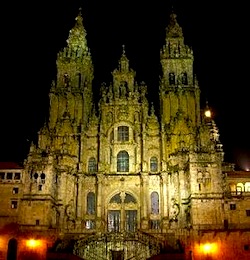 Spain
as he sought to rekindle the faith in a once staunchly Roman Catholic
nation that is now among Europe’s most liberal. Spain
as he sought to rekindle the faith in a once staunchly Roman Catholic
nation that is now among Europe’s most liberal.
The Roman Catholic Church is fighting laws supported by Prime
Minister José Luis Rodríguez Zapatero’s
Socialist government that have allowed same-sex marriage, expedited
divorce and eased restrictions on abortions.
The pope’s first stop on a two-day trip that began Saturday
was in the pilgrimage city of Santiago de Compostela, whose cathedral
(right) is said to hold the remains of St. James the Apostle.
On his way to Santiago, Benedict told reporters that the anticlericalism
seen now in Spain was reminiscent of the 1930s, when the church suffered
a wave of violence and persecution as the country lurched from an
unstable democracy to civil war. The reference was striking given
the scale of violence back then, when the Roman Catholic Church claims
that 4,184 clergy members were killed by the government, or Republican,
side, which accused it of
backing Franco’s fascist dictatorship.
|
|
|
Adolf
Hitler and clergy |
Hitler
Youth
Joseph Ratzinger |
Francisco
Franco and clergy |
|
 JURGEN
JURGEN
METTEPENNINGEN |
Belgium:
Archbishop’s Aide Resigns
By STEVEN ERLANGER
The New York Times: November 3, 2010
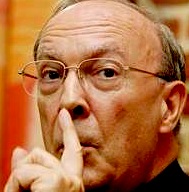
The spokesman for the head of the Roman Catholic
Church in Belgium, Archbishop André-Joseph
Léonard (right), quit Tuesday, saying he could no longer
speak for a man who had spoken harshly of AIDS and homosexuality and
sympathized with some pedophile priests. The resignation of the spokesman,
Jürgen Mettepenningen, 35, came
just days after the archbishop promised to keep silent on the sexual-abuse
scandal in the Belgian church until at least Christmas. Mr. Mettepenningen
said the archbishop was out of touch with Belgian Catholics, adding,
“At times, he behaved like a loose cannon who thinks everybody
else is wrong.”
(Full article)
|

WILLIAM
LYNCH

JEROLD LINDNER
Undated
photograph
|
Violent
Turn in Abuse Case More Than 3 Decades Old
THE ASSOCIATED PRESS: October 30, 2010
SAN JOSE, Calif. (AP) — William Lynch’s
life has spiraled out of control in the 35 years since he says he
and his brother were molested by a Jesuit priest. He struggled with
depression, had nightmares and tried to kill himself twice.
The authorities say they believe that the anger and pain erupted last
spring when the Rev. Jerold Lindner was lured to the lobby of his
Jesuit retirement home and then beat severely in front of shocked
witnesses.
Mr. Lynch, 43, was arrested Friday and booked on suspicion of assault
with a deadly weapon in the May 10 attack. He posted $25,000 bail
and will plead not guilty at an arraignment next month, said his lawyer,
Pat Harris.
During a confrontation at the Jesuits’ Sacred Heart retirement
home in Los Gatos, Calif., Mr. Lynch repeatedly punched Father Lindner
in the face and body after the priest said he did not recognize him,
said Sgt. Rick Sung, a spokesman for the Santa Clara County Sheriff’s
Department.
Mr. Lynch and his younger brother settled with the Jesuits of the
California Province, a Roman Catholic religious order, for $625,000
in 1998 after accusing Father Lindner of abusing them in 1975 during
weekend camping trips in the Santa Cruz Mountains.
Mr. Harris said the boys, who were 7 and 5 at the time, were raped
and forced to have oral sex with each other while Father Lindner watched.
Father Lindner, 65, has been accused of abuse by nearly a dozen people,
including his sister and nieces and nephews.
[Father Jerold Lindner's family severed contact
with him after discovering he had molested his nieces and nephews
when they were as young as 3.]
|
 JOSÉ
ALEJANDRO
JOSÉ
ALEJANDRO
CASTILLO |
Ontario
Priest Accused of Molesting 12-year-old Boy
Detectives believe Jose Alejandro Castillo
may have also sexually assaulted other victims.
KTLA: October 26, 2010
ONTARIO, Calif. -- A Roman Catholic priest pleaded
not guilty Tuesday to repeatedly molesting a 12-year-old boy.
Jose Alejandro Castillo, 57, the pastor of Our Lady of Guadalupe Church
in Ontario -- known as "Father Alex" -- was arrested Monday
at his home.
Prosecutors say Castillo molested a 12-year-old boy two years ago,
and Ontario police say they suspect he molested at least two other
teens.
Castillo entered pleas Tuesday to eight counts of lewd acts against
a child, according to the San Bernardino County district attorney's
office. His bail was raised to $7 million from $1 million and he remains
behind bars.
Castillo was removed from active ministry in June after he was accused
of molesting two adolescent boys by relatives of the victims. The
Diocese of San Bernardino took it to police, and the allegations were
made public three months later in a letter read during Mass at the
four churches where he had served.
Police determined there were three other victims -- a 16-year-old
boy at Our Lady of Guadalupe and two adults at other parishes -- but
declined to file charges because the statute of limitations for the
crimes had expired.
Detectives also are investigating another alleged incident between
Castillo and a 14-year-old boy while the priest was serving at Our
Lady of Guadalupe Church.
(Full article)
|

ARCHBISHOP
TIMOTHY DOLAN
|
Archbishop
Timothy Dolan gives New York Times hell
Holy thumbs-down to 'anti-Catholic'
reviews
By JEANE MacINTOSH
POST WIRE SERVICES: October 23, 2010
Archbishop Timothy Dolan has had it with the Catholic-bashing New
York Times.
The church leader -- known for his easygoing demeanor -- has taken
to his blog to blast the paper for "gushing" reviews it
gave to an art exhibit that criticizes the late John Joseph Cardinal
O'Connor and a play that makes fun of nuns.
"The common, casual way The New York Times offends Catholic sensitivity,"
Dolan noted, is "something they would never think of doing --
rightly so -- to the Jewish, Black, Islamic or gay communities."
Both reviews appeared in the paper on Oct. 15.
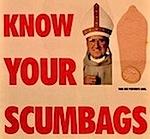 The Times recommended an art exhibit in the West Village by AIDS activist
group ACT UP that features a photo of O'Connor next to a condom.
The Times recommended an art exhibit in the West Village by AIDS activist
group ACT UP that features a photo of O'Connor next to a condom.
"One of the posters in this 'must see' exhibit is of Cardinal
O'Connor, in the form of a condom, referred to as a 'scumbag,' "
Dolan fumed. The art is particularly appalling, Dolan noted, because
O'Connor "spent many evenings caring quietly for AIDS patients"
and opened two AIDS units at New York City hospitals to care for them
"when everyone else ran from them."
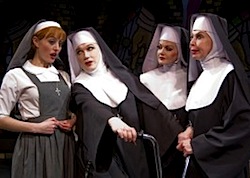 Dolan
slammed the Times' separate review of the "fresh and funny"
play "The Divine Sister," in the East Village. Dolan
slammed the Times' separate review of the "fresh and funny"
play "The Divine Sister," in the East Village.
He accused the paper of promoting "cheap laughs at the expense
of a bigoted view of the most noble women around. These are nuns,
mocked and held up for snickering," the archbishop wrote.
In a statement, the Times said it covers cultural events "even
if some may disagree with the content."
Dolan, however, wasn't buying it. "If they're going to say, 'Oh,
no, we do that all the time,' I'm going to say, 'Show me when you
do it to the Islamic community, to the Jewish community, to the African-American
community, to the gay community,' " he told CBS News yesterday.
"They don't do it because they know that's out of bounds."
(Full article)
|
 HOMER
SIMPSON
HOMER
SIMPSON |
Homer
Simpson: A True Catholic?
By: MEGAN FRIEDMAN
Time: October 18,2010
20th Century Fox / Everett CollectionIf the
Vatican says so, it must be true.
L'Osservatore Romano, the Vatican's official newspaper, recently published
an article arguing Homer's Catholicism. Entitled "Homer and Bart
are Catholics," the article praises the show for including Catholic
themes like prayer before meals. (And he is one of our Top 10 TV Dads,
after all.)
And yes, before you can counter-argue, the Vatican does acknowledge
that Homer fights with super-Christian neighbor Ned Flanders. But
one episode, "The Father, the Son and the Holy Guest" concerns
Homer's conversion to Catholicism, motivated by a priest voiced by
Liam Neeson. So it's official.
The Vatican must believe God to be forgiving. After all, it's not
like he looks forward to church on Sundays.
(Full article)
Click
√
on image for more
|

VATICAN
EURO
|
With
Bank Inquiry, Vatican Confronts Modern Life
By RACHEL DONADIO
The New York Times: September 29, 2010
ROME — When Rome magistrates opened an investigation
last week into the Vatican bank over transparency issues, it was not
only a bold assertion of state over church, it also pointed to one of
the Vatican’s greatest continuing challenges: facing modernity.
The Vatican’s famously opaque finances are being tested by tightened
European Union anti-money-laundering statutes.
As in the sexual abuse scandal, in which for years the Vatican appeared
to declare itself outside — or above — civil law, this time
the issue is the Vatican’s famously opaque finances, which for
the first time are being held to tightened European Union anti-money-laundering
statutes.
While Europe remade itself after the Second World War, balancing its
powers through treaties and linking itself together through banking
agreements, the Vatican remains an anomaly as the last absolute monarchy
in the West. But today, its ancient ways are running up against civil
institutions that increasingly view the church as they do any other
multinational.
“The Vatican has to understand that the world has changed,”
said Donato Masciandaro, the head of the economics department at Bocconi
University in Milan and an expert in regulations on money laundering.
“If it doesn’t understand that the world has changed, it
risks having violations every day against the anti-money-laundering
norms.”
The investigation is a test not only for the Vatican but also for Italy,
torn between its European Union commitments and the Catholic banking
networks that its ruling class has long dominated. |
 ETTORE
GOTTI TEDESCHI
ETTORE
GOTTI TEDESCHI |
Vatican
Defends Bank After Seizure of $30 Million
By RACHEL DONADIO
The New York Times: September 23, 2010
ROME — As an inquiry into its murky finances
looked poised to widen, the Vatican swiftly went on the defensive on
Thursday, saying that the seizure of $30 million from a Vatican bank
account and the judicial investigation of the bank’s two top officials
were the result of a “misunderstanding.”
On Tuesday, Italian officials announced an inquiry into the Vatican
bank’s top officials for having failed to explain adequately the
origins of $30 million transferred from one of its accounts in a Rome
bank. Magistrates opened the investigation based on an alert from the
Bank of Italy, the nation’s central bank. The authorities here
said they had seized the $30 million “preventatively” but
have not pressed charges against the Vatican bank’s chairman,
Ettore Gotti Tedeschi, or its director general, Paolo Cipriani.
Like the clerical sexual abuse crisis that has troubled the Roman Catholic
Church in recent months, the financial inquiry appeared to open another
front in a quiet war between church and state in Europe — or perhaps
signaled the further waning of an era in which the Vatican was seen
as untouchable.
The inquiry is the first in which the Bank of Italy has treated the
Vatican bank like any other foreign bank operating in Italy, in enforcing
2007 European Union anti-money-laundering laws that require banks to
provide detailed information about the origins of the money they transfer. |

ROBERTO CALVI
"God's Banker" |
Money-Laundering
Inquiry Touches Vatican Bank
By RACHEL DONADIO
The New York Times: September 21, 2010
ROME
— Italian monetary authorities said Tuesday that they had impounded
$30 million from the Vatican bank [Istituto per le Opere di Religione]
and placed its top two officers under investigation in connection with
a money-laundering inquiry. The announcement amounted to another potential
storm confronting the papacy of Benedict XVI, who is struggling with
the effects of a priestly abuse scandal.
Italian financial police officers in front of St. Peter's Square in
Rome. The Vatican bank's top two officials face a money-laundering investigation.
In a statement, the Vatican expressed “perplexity and surprise”
that the bank’s chairman, Ettore Gotti Tedeschi, and its director
general, Paolo Cipriani, had been placed under investigation. It added
that it had the “greatest trust” in the two men and that
it had been working for greater transparency in its finances.
The investigation is the first into the Vatican bank since the early
1980s, when it was implicated in the collapse of an Italian bank whose
chairman [Roberto Calvi], nicknamed “God’s banker,”
was mysteriously found dead, hanging from Blackfriars Bridge in London. |
 CARDINAL
CARDINAL
WALTER KASPER |
The
Vatican: Cardinal Cancels Trip
By RACHEL DONADIO
The New York Times: September 15, 2010
A cardinal long involved in the Vatican’s
relations with the Anglican Church will not travel with Pope Benedict
XVI on his trip to Britain on Thursday, the Vatican said Wednesday.
Cardinal Walter Kasper, who retired last summer as the head of the Pontifical
Council for Promoting Christian Unity, caused a stir this week when
he told the German magazine Focus that landing at Heathrow Airport was
like landing “in a third world country.” He also criticized
the “aggressive atheism” of Britain. The Vatican spokesman,
the Rev. Federico Lombardi, said that Cardinal Kasper had withdrawn
from the trip for health reasons. “The interview had nothing to
do with it,” he said. |
 ARCHBISHOP
ARCHBISHOP
ANDRÉ-JOSEPH
LÉONARD |
Victims
Angry as Belgium Responds to Church Abuse
By STEPHEN CASTLE
The New York Times: September 13, 2010
BRUSSELS — The leader of the Roman Catholic
Church in Belgium on Monday acknowledged the scale of the scandal that
had engulfed the country over sexual abuse by priests and promised to
do more for the victims, but he offered few short-term solutions and
said little of substance about further pursuing the abusers.
The church leader, Archbishop André-Joseph Léonard, said
at a news conference that suffering had caused a “shiver”
to run through the church, but that it was too soon for a detailed response
to the crisis. The extent of the abuse was revealed in a report published
Friday.
The lack of more comprehensive steps was greeted with anger by representatives
of victims, with one lawyer calling the church’s response “scandalous.” |
 PETER
ADRIAENSSENS
PETER
ADRIAENSSENS
Investigating Psychiatrist |
Pervasive
Abuse Found in Belgian Church
By STEPHEN CASTLE
The New York Times: September 11, 2010
BRUSSELS — Sexual abuse of children reached
all parts of Belgium’s Roman Catholic Church, and it drove at
least 13 victims to kill themselves, a report released Friday said.
The report, put forth by a commission established by the church itself,
sketched the harrowing dimensions of priestly abuse over five decades,
listing cases involving 327 male complainants and 161 women, and 19
cases in which the gender of the victim was unclear. In one case the
abuse began when a child was just 2 years old.
The report was the latest blow to a church reeling from a sexual scandal
that worsened after the bishop of Bruges, Roger Vangheluwe, resigned
in April after admitting that he had abused a boy who was later identified
as his nephew. The resignation prompted more than 200 victims to come
forward within a few days with complaints about abuses by priests,
in some cases dating back many decades. One complainant is more than
90 years old.
Those victims’ stories, compiled in the report, reveal in detail
their suffering. Many say they are still fighting illness and depression
many years after the abuses.
The
testimony illustrates the way victims struggled for years to try to
come to terms with the abuse, sometimes with results that devastated
families. Many complain of illness or mental health problems.
Friends or relatives reported that the suicides of 13 victims “were
related to sexual abuse by clergy,” the report said. Six other
victims said they had attempted suicide. And one victim mentioned
the suicide of a partner because of the impact of abuse and the way
it affected their relationship.
|
 ARCHBISHOP
ARCHBISHOP
DONALS WUERL |
Rome
Fiddles, We Burn
By MAUREEN DOWD
The New York Times: July 18, 2010
If
the Vatican is trying to restore the impression that its moral sense
is intact, issuing a document that equates pedophilia with the ordination
of women doesn’t really do that.
The casuistic document did not issue a zero-tolerance policy to defrock
priests after they are found guilty of pedophilia; it did not order
bishops to report every instance of abuse to the police; it did not
set up sanctions on bishops who sweep abuse under the rectory rug;
it did not eliminate the statute of limitations for abused children;
it did not tell bishops to stop lobbying legislatures to prevent child-abuse
laws from being toughened.
There is no moral awakening here. The cruelty and indecency of child
abuse once more inspires tactical contrition. All the penitence of
the church is grudging and reactive. Church leaders are merely as
penitent as they need to be to protect the institution.
Stupefyingly,
the new Vatican document also links raping children with ordaining
women as priests, deeming both “graviora delicta,” or
grave offenses. Clerics who attempt to ordain women can now be defrocked.
After
the Vatican launched two inquisitions of American nuns, it didn’t
seem possible that the archconservative Il Papa and his paternalistic
redoubt could get more unenlightened, but they have somehow managed
it.
Letting women be priests — which should be seen as a way to
help cleanse the church and move it beyond its infantilized and defensive
state — is now on the list of awful sins right next to pedophilia,
heresy, apostasy and schism.
Archbishop
Donald Wuerl of Washington, the chairman of the Committee on Doctrine
of the United States Conference of Catholic Bishops, asserted, “The
Catholic Church, through its long and constant teaching, holds that
ordination has been, from the beginning, reserved to men, a fact which
cannot be changed despite changing times.”
|

CAN
YOU HEAR ME?
|
Tone-Deaf
in Rome
EDITORIAL
The New York Times: July 17, 2010
There was not much to like in the Vatican’s
news conference this week about its pedophilia scandal, but among
all the defensive posturing and inept statements, there
was one real stunner: The citing of the movement for the ordination
of women as a “grave crime” that Rome deems as offensive
as the scandal of priests who sexually assault children.
Calls for ending the ban on women priests are only a blip on the ecclesiastical
radar screen. Yet Vatican officials gratuitously raised them at the
news conference, while they offered limited antidotes to the crimes
of sexual abuse and the long history of bishops dithering and covering
up these crimes.
They doubled the internal statute of limitations to 20 years for defrocking
abusers. Yet they failed to emphasize the problem as a state crime
as the American bishops did after being forced to dismiss more than
700 priests. “It’s not for canonical legislation to get
itself involved with civil law,” one prelate airily declared,
insisting Rome’s existing “guidelines” — not
mandates — are sufficient for prelates to obey civil laws.
American bishops finally signaled an end to recycling serial predators
through parishes by committing to zero tolerance and requiring secular
authorities to be alerted from the beginning. These two steps should
be embraced by the Vatican worldwide.
A third measure proposed by the Catholic laity panel that investigated
the Roman Catholic Church in the United States is no less important
— that there must be consequences for culpable bishops who protected
pedophile clergy and paid hush money to victims. Neither the American
bishops nor the Vatican have dared so far to bring offending prelates
to full accountability.
Catholic parents, their trust violated, deserve to hear clear and
firm countermeasures for enacting Pope Benedict XVI’s promises
for reform. Red herrings about female priests only display the tone-deafness
of the Vatican’s dominant male hierarchy.
(Full
Editorial)
|
 FEDERICO
LOMBARDI
FEDERICO
LOMBARDI
Vatican spokesman |
Vatican
Sets New Rules on Responding to Sex Abuse
By RACHEL DONADIO
The New York Times: July 15, 2010
VATICAN CITY — In its most significant revision
to church law since a sex abuse crisis hit the United States a decade
ago and roared back from remission in Europe this spring, the Vatican
on Thursday issued new internal rules making it easier to discipline
priests who have sexually abused minors.
But in a move that infuriated victims’ groups and put United States
bishops on the defensive, it also codified “the attempted ordination
of women” to the priesthood as one of the church’s most
grave crimes, along with heresy, schism and pedophilia.
In its revision, the Vatican doubled the statute of limitations in abuse
cases from 10 to 20 years from the victim’s 18th birthday and
added possession of child pornography and the sexual abuse of mentally
disabled adults to the list of crimes handled by the Vatican’s
doctrinal office, the Congregation for the Doctrine of the Faith.
In a statement, the Vatican spokesman, the Rev. Federico Lombardi, said
the changes were a sign of the church’s commitment to addressing
child sex abuse with “rigor and transparency.”
But the revision fell short of the hopes of many advocates for victims
of priestly abuse: It does not contain measures to hold bishops accountable
for abuse by priests on their watch, nor does it require mandatory reporting
of sex abuse to civil authorities even in countries where it is not
required by civil law. |
BENEDICT
XVI

GOD'S
TOOTHLESS
ROTTWEILER |
The
Pope’s Duty
EDITORIAL
The New York Times: July 9, 2010
When rolling scandal forced the American Catholic
bishops conference to take action against pedophile priests, the prelates
issued a tough policy requiring accused child molesters be reported
immediately to secular authorities. This mandate finally acknowledged
that crimes against children should take priority over bureaucratic
church policies that served to cloak rogue priests and bishops in a
fog of ecclesiastical evasion.
Eight years after the American church’s overdue order, it is shocking
that Pope Benedict XVI and the Vatican have not yet applied it to the
worldwide Roman Catholic Church. The pedophilia scandal has erupted
in other nations, leaving parents concerned about a repetition of the
harrowing experience in America, where more than 700 priests had to
be dismissed across a three-year period. Yet the Vatican is reportedly
working on new “guidelines” — not mandates. They are
likely to fall short of zero-tolerance and other requirements in the
American church that parishes and communities be alerted to abusers. |
|
Vatican
Approaches New Abuse Rules
By RACHEL DONADIO
The New York Times: July 6, 2010
ROME
— In an effort to rein in the sexual abuse crisis threatening
the church, the Vatican is inching toward introducing changes to canon
law to make it easier to discipline pedophile priests, Vatican officials
say.
The changes will codify into canon law exceptions that already allow
the Vatican’s doctrinal office, the Congregation for the Doctrine
of the Faith, to defrock priests using faster administrative procedures
rather than a full ecclesiastical trial.
Few other details have leaked out, but several reports and Vatican officials
suggest that there are limited technical changes. If true, critics and
victims are likely to find them inadequate for the scope of the crisis,
though they will mark the first doctrinal modification since the abuse
crisis hit Europe this spring and the United States a decade ago.
The changes are not expected to include adoption of the “zero
tolerance” policy used by bishops in the United States and elsewhere,
which remove a priest from ministry at the first credible accusation
of abuse, as some victims’ groups and critics had hoped.
But in the quiet battle raging deep inside Vatican City, they are likely
to appear as a defeat for the many traditionalist members of the hierarchy
who believe that anything short of a full canonical trial betrays the
church’s trust in a priest and deprives him of due process. |

The
future
POPE BENEDICT XVI,
CARDINAL
JOSEPH RATZINGER
in 1982
|
Church
Office Failed to Act on Abuse Scandal
By LAURIE GOODSTEIN and DAVID M. HALBFINGER
The New York Times: July 2, 2010
In its long struggle to grapple with sexual abuse,
the Vatican often cites as a major turning point the decision in 2001
to give the office led by Cardinal Joseph Ratzinger the authority to
cut through a morass of bureaucracy and handle abuse cases directly.
The decision, in an apostolic letter from Pope John Paul II, earned
Cardinal Ratzinger, now Pope Benedict XVI, a reputation as the Vatican
insider who most clearly recognized the threat the spreading sexual
abuse scandals posed to the Roman Catholic Church.
But church documents and interviews with canon lawyers and bishops cast
that 2001 decision and the future pope’s track record in a new
and less flattering light.
The Vatican took action only after bishops from English-speaking nations
became so concerned about resistance from top church officials that
the Vatican convened a secret meeting to hear their complaints —
an extraordinary example of prelates from across the globe collectively
pressing their superiors for reform, and one that had not previously
been revealed.
And the policy that resulted from that meeting, in contrast to the way
it has been described by the Vatican, was not a sharp break with past
practices. It was mainly a belated reaffirmation of longstanding church
procedures that at least one bishop attending the meeting argued had
been ignored for too long, according to church documents and interviews.
The office led by Cardinal Ratzinger, the Congregation for the Doctrine
of the Faith, had actually been given authority over sexual abuse cases
nearly 80 years earlier, in 1922, documents show and canon lawyers confirm.
But for the two decades he was in charge of that office, the future
pope never asserted that authority, failing to act even as the cases
undermined the church’s credibility in the United States, Australia,
Ireland and elsewhere. |
 JEFFREY
LENA
JEFFREY
LENA
Vatican
lawyer |
Vatican
Says Not Liable in U.S. Sexual Abuse Case
REUTERS: June 29, 2010
VATICAN CITY - The Vatican, struggling to control
the damage to its image from a sexual abuse scandal, said Tuesday it
would prove it cannot be held legally responsible for a predatory priest
in a pivotal U.S. lawsuit.
Monday, the U.S. Supreme Court refused to consider a case on whether
the Vatican has immunity over the sexual abuse of minors by priests,
allowing a lawsuit filed in 2002 to go forward.
In a statement, the Vatican's lawyer, Jeffrey Lena, said when the case
returns to a U.S. district court it would show it cannot be held responsible
for the actions of the priest as he was not a Vatican employee.
"The decision not to hear the case is not a comment on the merits
of our case," Lena said, adding that the case would now go back
to the district court in Oregon.
The lawsuit, filed against the Vatican by a plaintiff identified only
as John Doe, claimed he was sexually abused on several occasions in
the mid-1960s when he was 15 or 16 by a Roman Catholic priest named
Father Andrew Ronan.
According to court documents, Ronan molested boys in the mid-1950s as
a priest in Ireland and then in Chicago before his transfer to a church
in Portland, Oregon, where he allegedly abused the victim who filed
the lawsuit. Ronan died in 1992.
The Vatican claimed immunity under a U.S. law, the Foreign Sovereign
Immunities Act of 1976, that allows foreign states to avoid being sued
in court.
But the law contains exceptions. The appeals court cited one of those,
ruling the lawsuit has sufficiently alleged that Ronan was an employee
of the Vatican acting within the scope of his employment under Oregon
law. |

CARDINAL
CHRISTOPH SCHÖNBORN

CARDINAL
ANGELO SODANO
|
In
Rare Memo, Vatican Rebukes Cardinal
By RACHEL DONADIO
The New York Times: June 28, 2010
ROME — The Vatican drew aside, for a brief and puzzling moment,
the thick veil that covers its internal business. It issued an extraordinary
communiqué on Monday chastising a powerful cardinal who had
criticized another powerful cardinal — proof of a battle inside
the Vatican walls that mirrors the anger over sexual abuse raging
outside them.
In just 357 words, chosen precisely to obscure much meaning, the communiqué
still managed to lay bare disagreements over the Vatican’s handling
of the sexual abuse crisis; the deep generational divide inside the
church; the legacy of the last two popes; and to top it off, a tantalizing
whiff of who might just become the next pope and why.
On
its face, the communiqué is a public rebuke to Cardinal Christoph
Schönborn of Vienna. In April, he had implicitly criticized Cardinal
Angelo Sodano, 82, the current dean of the College of Cardinals and
Pope John Paul II’s last secretary of state, for blocking an
investigation into an Austrian archbishop accused in the mid-1990s
of abusing minors.
The communiqué circuitously took account of this, recounting
a meeting on Monday between Cardinal Schönborn and Pope Benedict
XVI, joined later by Cardinal Sodano. Cardinal Schönborn, 65,
was ruled to have overreached: “It must be reiterated that,
in the church, when accusations are made against a cardinal, competency
falls exclusively to the pope.”
In
April, Cardinal Schönborn said that in the 1990s, Benedict, then
the head of the Vatican’s powerful doctrinal office, had wanted
to open an investigation into Cardinal Hans Hermann Gröer of
Austria, who stepped down as archbishop of Vienna in 1995 after allegations
he had sexually abused seminarians, but that the “diplomatic”
branch of John Paul’s papacy had blocked it, a clear reference
to Cardinal Sodano.
|
 ROGER
VANGHELUWE
ROGER
VANGHELUWE |
Warning
About Church’s Abuse Documents Led Belgian Police to Raid Its
Offices
By DOREEN CARVAJAL
The New York Times: June 28, 2010
MECHELEN, Belgium — Four days after a series
of police raids of Catholic institutions in Belgium that drew sharp
criticism from the pope, the reason for the unusually aggressive operation
has emerged: a formal accusation that the church was hiding information
on sexual abuse lodged by the former president of an internal church
commission handling such cases.
The declaration to the police set off four raids in which the authorities
seized hundreds of case files from the commission’s current leader,
detained a group of bishops for more than nine hours and disturbed the
tomb of a cardinal where construction work had recently been done. Investigators
drilled into the tomb and lowered a camera, but found only the remains.
Investigators are now analyzing more than two truckloads of seized documents,
many related to 475 complaints lodged with the sex-abuse commission
after the resignation in April of a popular bishop [Roger Vangheluwe
of Bruges]who admitted that, early in his career, he had molested a
boy.
The former head of the commission, Godelieve Halsberghe, said in an
interview with a Flemish newspaper, Het Nieuwsblad, that she had gone
to the authorities after receiving a call from a man who did not identify
himself and warned her in French to “watch out” for herself
and to secure the documents she held on about 30 cases she had handled
during her tenure at the commission, from 2000 to 2008. Ms. Halsberghe,
now a retired magistrate, has long been critical of the church’s
efforts in Belgium to confront its past |

POPE
BENEDICT XVI

CARDINAL
TARCISIO GERTONE
Vatican
Secretary of State
|
Pope
Lashes Out at Belgium After Raid on Church
By RACHEL DONADIO
The New York Times: June 27, 2010
ROME — In a sign of sharply rising tensions
between the Vatican and Belgium, Pope Benedict XVI on Sunday criticized
as “surprising and deplorable” a raid on church property
last week by Belgian police officers investigating sexual abuse by
clerics.
In an exceedingly rare personal message and rebuke of a sovereign
country, the pontiff also stressed the church’s “autonomy”
to conduct its own investigations and criticized the “deplorable
methods” of the Belgian police, who detained bishops, confiscated
files and even drilled into the tombs of at least one cardinal in
the Cathedral of Mechelen, north of Brussels, in a search for documents.
“On several occasions I have personally reiterated that such
serious issues should be attended to by both civil and canon law,
with respect for their reciprocal specificity and autonomy,”
Benedict said in a statement circulated by the Vatican on Sunday.
He also expressed his “closeness and solidarity” with
the Belgian clergy and André-Joseph Léonard, the archbishop
of Belgium and the president of the Belgian Bishops’ Conference.
The raid on Thursday came months after the Belgian church, stung by
allegations of sexual abuse by clerics, created a committee to investigate
claims.
On
Saturday, the Vatican secretary of state, Cardinal Tarcisio Bertone,
called the detention of bishops “serious and unbelievable”
and compared the police tactics to those of Communist regimes. He
also said that the bishops had been deprived of food and water while
they were detained.
On Sunday, the Belgian justice minister denied that assertion, as
did the spokesman for the Belgian Bishops’ Conference, who in
a statement circulated by the Vatican on Friday said that the raid
had been conducted “correctly.”
|
 ARCHBISHOP
ARCHBISHOP
ANDRÉ-JOSEPH LEONARD |
Vatican
Criticizes Raid on Belgian Church Offices
By RACHEL DONADIO
The New York Times: June 25, 2010
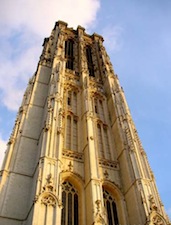 ROME
— The Vatican expressed “shock” on Friday at the
raid on Thursday by the Belgian police of church offices in their
search for hidden evidence of child sex abuse by priests. It also
voiced its “indignation” at what it called the “violation”
of two cardinals’ tombs in the search. ROME
— The Vatican expressed “shock” on Friday at the
raid on Thursday by the Belgian police of church offices in their
search for hidden evidence of child sex abuse by priests. It also
voiced its “indignation” at what it called the “violation”
of two cardinals’ tombs in the search.
In a bold and provocative assertion of state over church as anger
rises in Europe over abuse by priests, the police not only detained
the members of the Belgian Bishops’ Conference for nine hours
on Thursday while searching for documents related to sex abuse cases,
they also drilled into the tombs of two cardinals in the Mechelen
Cathedral (St. Rombout, right).
“It was worthy of ‘The Da Vinci Code,’ ” the
archbishop of Belgium, Andre-Joseph Leonard, said at a news conference
Friday in Brussels.
|

ARCHBISHOP
ANDRÉ-JOSEPH LEONARD

ROGER
VANGHELUWE
|
Belgian
Police Raid Offices of Church in Abuse Case
By STEPHEN CASTLE and NICHOLAS KULISH
The New York Times: June 24, 2010
BRUSSELS — Belgian authorities on Thursday
heightened pressure on the Roman Catholic Church in a sexual abuse scandal,
raiding the Belgian church headquarters, the home of a cardinal and
the offices of a commission established by the church to handle abuse
complaints.
Police officers arrived at the church headquarters, the palace of the
archbishop of Mechelen-Brussels, on Thursday morning while the monthly
bishops meeting was in progress, a church spokesman said. The police
questioned all of those present, from bishops to staff members like
cooks and drivers.
“It was half-past 10,” said Eric de Beukelaer, a spokesman
for the Belgian archbishop, André-Joseph Léonard. “The
police came in and said the house would be searched because there were
complaints about sexual abuse on the territory of the archdiocese.”
Mr. de Beukelaer said that he was present during the raid and that the
police had temporarily confiscated his cellphone.
The authorities are investigating accusations that Belgian clerics sexually
abused children, according to officials. Hundreds of such claims have
been raised since April, when the bishop of Bruges, Roger Vangheluwe,
admitted to molesting a boy and resigned.
The authorities’ decision to search church property, question
bishops and seize documents and other potential evidence was a major
departure in such investigations and a sign that in criminal matters
the church will not be afforded special treatment
here. |
|
Cardinal
denies corruption allegations
By NICOLE WINFIELD
The Associated Press: Jun 21, 1010
VATICAN CITY (AP) -- A cardinal under investigation
in a sprawling corruption scandal denied wrongdoing and insisted Monday
he acted for the good of the church while handling real estate transactions
for the Vatican office that funds missionary work abroad.
Naples Cardinal Crecenzio Sepe told a press conference he forgave his
accusers and was going ahead serenely while accepting the "cross"
that the investigation had brought on him.
Prosecutors are trying to untangle an alleged web of kickbacks involving
billions of euros (dollars) worth of contracts for such mega-projects
as preparing 2000 Holy Year events in Rome, the 2009 Group of Eight
summit and rebuilding the quake-shattered town of L'Aquila.
Sepe's real estate transactions at the Congregation for the Evangelization
of Peoples are under scrutiny since they involved some of the key figures
implicated in the probe, including Premier Silvio Berlusconi's disaster
chief Guido Bertolaso.
The scandal marks the second major crisis implicating top church officials
this year following the clerical abuse crisis.
Sepe said Monday he was sure of the Vatican's staunch support as he
confronted the accusations. |

CARDINAL
FRANCISCO JAVIER
ERRÁZURIZ

FERNANDO
KARADIMA
|
Chilean
Archbishop Refers Child Abuse Case Against Priest
to Vatican
By PASCALE BONNEFOY and ALEXEI BARRIONUEVO
The New York Times: June 20, 2010
SANTIAGO, Chile — The archbishop of Santiago,
Cardinal Francisco Javier Errázuriz, has asked the Vatican
to decide the fate of a prominent Chilean priest who has been accused
by several former parishioners of sexually abusing them when they
were teenagers.
On Friday the cardinal sent a report prepared by the Roman Catholic
Church in Chile regarding the priest, the Rev. Fernando Karadima,
to the Congregation for the Doctrine of the Faith in Rome. In a statement
on the Web site of the archbishop of Santiago, Cardinal Errázuriz
said he asked the Vatican to lift the 10-year statute of limitations
for accusations of sexual abuse of a minor by a priest. That would
permit the opening of a three-judge canon law trial to determine whether
Father Karadima abused at least four boys who were parishioners at
El Bosque parish, where he is based.
In a statement released Friday by his lawyer, Father Karadima, 79,
said he was innocent of the accusations and was “grateful”
that the church investigation was being referred to the Vatican.
Dr.
James Hamilton, 44, a gastroenterologist, said that soon after Father
Karadima chose him at 17 to be part of his Catholic Action youth movement,
the priest began kissing him on the mouth and touching his genitals.
On a retreat at a seaside town west of Santiago when he was 18, Dr.
Hamilton said, the abuse went much further, and it continued for nearly
20 years.
Dr. Hamilton said that in 2005 he filed an official claim of sexual
abuse by Father Karadima to a bishop outside the parish. No one responded,
he said. Another accuser, José Murillo, said he wrote to Cardinal
Errázuriz in 2003 to complain about the priest.
The cardinal said in April that he began an investigation in 2005
into the accusations against Father Karadima but suspended it after
a short time. He did not reopen it until 2009, he said.
|

CARDINAL
ROGER MAHONY

MICHAEL
BAKER
|
California:
Deposition on Abuse Is Released
By THE ASSOCIATED PRESS
June 15, 2010
Cardinal Roger M. Mahony of Los Angeles says
in a deposition released Tuesday that he did not call the police in
1986 after a priest admitted to molesting two boys and did not warn
parishioners because the priest told him the boys were illegal immigrants
who had returned to Mexico.
Cardinal
Mahony says that he did not know the victims’ identities and
that the Rev. Michael Baker, who has since been defrocked and is in
prison, told him the abuse happened outside the parish.
Much
of how the cardinal handled the matter has been made public, but the
deposition contains his own account under oath. It is part of a lawsuit
that recently settled for $2.2 million.
|

DENNIS
POUST

NEW
YORK
CATHOLIC CONFERENCE
OF BISHOPS
|
For
5th Year, Child Sex Abuse Bill Dies in Legislature
By PAUL VITELLO
The New York Times: June 2, 2010
For four years, advocates for sexually abused
children had fought a battle in the New York Legislature to open a
legal window that would allow victims to file lawsuits against predators
long after the statute of limitations had expired.
“We knew we didn’t have the votes, but we felt it was
important to keep it on the public agenda,” said Ruth Hassell-Thompson,
a Democratic senator from the Bronx and Westchester, and a sponsor
of the Child Abuse Act.
Though the bill died each year, it passed in the Assembly three timesand
earned the support of two governors. And the renewed attention to
sexual abuse in the Roman Catholic Church augured well for the cause
this year. Yet on Wednesday, in its fifth year on the legislative
calendar, the bill, known as the Child Victims Act, was defeated in
a Senate committee in the first vote on the measure this session.
Dennis
Poust, the communications director of the New York State Catholic
Conference, said the vote represented an emerging consensus that time
limits on legal liability were an important civil rights protection.
The conference is the policy arm of the state’s Catholic bishops,
the bill’s most formidable opponents.
“You cannot ask institutions to take responsibility for the
failures of a few individuals whose actions took place 40 and 50 years
ago,” Mr. Poust said.
Since
it was first introduced in the 2006-7 session, the Child Victims Act
has been fervently opposed by the Catholic Church and several Orthodox
Jewish groups, which saw potentially devastating financial implications
in opening an opportunity for victims, regardless of age, to bring
lawsuits for sexual abuse suffered in childhood.
Some
advocates for abuse victims had expressed hope before Wednesday that
recent revelations about leniency shown by high Roman Catholic officials
— including then-Cardinal Joseph Ratzinger, the future Pope
Benedict XVI — to abusive priests might attract new public support
for the legislation.
|
 ROBERT
ZOLLITSCH
ROBERT
ZOLLITSCH |
German
Archbishop Is Accused of Abetting Priestly Sex Abuse
REUTERS: June 2, 2010
The scandal over sexual abuse by Roman Catholic priests threatened
Robert Zollitsch, the archbishop of Freiburg, who was charged Wednesday
with aiding and abetting a known abuser by allowing him to get a new
job in a German parish in 1987. Archbishop Freiburg, 71, head of the
German Bishops’ Conference, was accused by prosecutors of permitting
a priest accused of child abuse in the 1960s to be reappointed. The
church in Freiburg accused the prosecutors of sensationalism and denied
that the appointment was Archbishop Freiburg’s responsibility.
(Full
article)
|
|
Prospective
Catholic Priests Face Sexuality Hurdles
By PAUL VITELLO
The New York Times: May 30, 2010
Every job interview has its awkward moments, but in recent years,
the standard interview for men seeking a life in the Roman Catholic
priesthood has made the awkward moment a requirement.
“When was the last time you had sex?” all candidates for
the seminary are asked. (The preferred answer: not for three years
or more.) “What kind of sexual experiences have you had?”
is another common question. “Do you like pornography?”
Depending on the replies, and the results of standardized psychological
tests, the interview may proceed into deeper waters: “Do you
like children?” and “Do you like children more than you
like people your own age?”
It is part of a soul-baring obstacle course prospective seminarians
are forced to run in the aftermath of a sexual abuse crisis that church
leaders have decided to confront, in part, by scrubbing their academies
of potential molesters, according to church officials and psychologists
who screen candidates in New York and the rest of the country.
But many of the questions are also aimed at another, equally sensitive
mission: deciding whether gay applicants should be denied admission
under complex recent guidelines from the Vatican that do not explicitly
bar all gay candidates but would exclude most of them, even some who
are celibate.
Many
church officials have been reluctant to discuss the screening process,
and its details differ from diocese to diocese. In the densely populated
Diocese of Brooklyn, officials are confident of their results in one
respect.
“We have no gay men in our seminary at this time,” said
Dr. Robert Palumbo, a psychologist who has screened seminary candidates
at the diocese’s Cathedral Seminary Residence in Douglaston,
Queens, for 10 years. “I’m pretty sure of it.” Whether
that reflects rigorous vetting or the reluctance of gay men to apply,
he could not say. “I’m just reporting what is,”
he said.
The
church views gay sex as a sin and homosexual tendencies as a psychological
disorder, but it does not bar chaste gay men from participating in
the sacraments. That degree of acceptance does not extend to ordination.
“Whether he is celibate or not, the person who views himself
as a ‘homosexual person,’ rather than as a person called
to be a spiritual father — that person should not be a priest,”
said Father Toups, of the bishops’ conference.
“And
not the least irony here is that these new regulations are being enforced
in many cases by seminary directors who are themselves gay.”said
Mark D. Jordan, the R. R. Niebuhr professor at Harvard Divinity School.
Rev.
Kevin J. Sweeney, whose incoming classes of three to five seminarians
each year make him one of the more successful vocation directors in
the country, said the new rules were not the order of battle for a
witch hunt. “We do not say that homosexuals are bad people,”
he said. “And sure, homosexuals have been good priests. But
it has to do with our view of marriage,” he said. “A priest
can only give his life to the church in the sense that a man gives
his life to a female spouse. A homosexual man cannot have the same
relationship. It’s not about condemning anybody. It’s
about our world view.”
|
 MONSIGNOR
MONSIGNOR
CHARLES SICLUNA |
Vatican
Abuse Prosecutor Warns Hell for Culprits
Associated Press: 29 May 2010
VATICAN CITY (AP) -- The Vatican
prosecutor of clerical sex abuse warned perpetrators on Saturday that
they would suffer damnation in hell that would be worse than the death
penalty.
The Rev. Charles Scicluna, a Maltese priest who is a top official
at the Vatican's morality office, led a special ``make amends'' prayer
service in St. Peter's Basilica. The service grew out of a desire
by some seminarians in Rome for a day of prayers for the victims of
clergy abuse and for the healing of the church's wounds from the scandal
over its concealment of abuse.
"It would be really better" for priests who sexually abuse
minors that their crimes "cause them death" because for
them, "damnation will be more terrible" in hell, Il Sole
24 Ore online news reported.
|

MARCIN
MICHAEL
STRACHANOWSKI
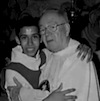
LUIZ
MARQUES BARBOSA

JOSÉ
AFONSO
no image
|
Priest
Arrested in Brazil on Charges of Sexually Abusing Boy
By ALEXEI BARRIONUEVO
The New Yoprk Times: May 23, 2010
SÃO PAULO, Brazil — The authorities
in Rio de Janeiro said Sunday that they had arrested a Polish priest
and charged him with sexually abusing a 16-year-old former altar boy.
The judge who issued the arrest warrant said the priest, Father
Marcin Michael Strachanowski, 44, had used his parish’s
rectory as an “erotic dungeon” to carry out sex acts with
boys. The police in Rio de Janeiro State said that Father Strachanowski,
who was arrested late Friday, was being held at a police station awaiting
court proceedings. He is accused of handcuffing the 16-year-old to a
bed “to satisfy his sexual whims,” according to state prosecutors.
It is the third case of sexual abuse involving a priest in Brazil, which
has the world’s biggest Roman Catholic population, in the last
two months. In April, Msgr. Luiz Marques Barbosa,
83, and two other priests were taken into custody in northeastern Brazil
and accused of abuse after a videotape surfaced of Father Barbosa having
sex with a former altar boy. Also that month, in Franca, in southeastern
Brazil, prosecutors charged the Rev. José
Afonso with abusing altar boys ranging from 12 to 16 years old. |
 CHILD
ABUSE
CHILD
ABUSE |
Vatican
says Pope is not liable for day-to-day
actions of priests
James Bone, New York
The Times of London : May 18, 2010
The Vatican says that it cannot be held responsible
for the day-to-day actions of Catholic bishops in America, as it scrambles
to prevent the Pope from being called to give evidence in a landmark
abuse case.
The argument will be made in a case brought by three Kentucky men who
claim that they were abused by priests decades ago. The men —
one of whom received compensation from the Archdiocese of Louisville
under a previous court settlement — are claiming negligence by
the Vatican. Their lawyer is trying to make the case a class-action
suit on behalf of all US victims of sex abuse by priests and wants to
force Pope Benedict XVI to testify.
The Vatican insists that it is not liable for any negligence by US Catholic
bishops. Jeffrey Lena, the Vatican’s US lawyer, said yesterday
that US bishops were not employees of the Holy See, did not act on Rome’s
behalf and were not controlled day-to-day by the Pope. The Holy See
denied that it had barred US bishops from reporting sex abuse by priests.
The Vatican outlined its defence against charges that it covered up
abuse by Roman Catholic priests in the US as it attempted to thwart
efforts to force the Pope to testify. |

TIMOTHY
DOLAN
|
Complex
Struggle: Prelate’s Record in Abuse Crisis
By SERGE F. KOVALESKI
The New York Times: May 17, 2010
In 2002, at the height of the sexual abuse crisis
confronting the Roman Catholic Church in America, Timothy M. Dolan arrived
in Milwaukee as the new archbishop, succeeding a prelate who had been
caught up in scandal. To abuse victims who had felt rebuffed by the
church, Archbishop Dolan — warm, down to earth — seemed
a bright beam of hope.
He listened to them, wept with them and vowed to change the way the
archdiocese dealt with the molestation of children by priests. But just
months later, he handwrote a letter to Peter Isely, a victim and an
advocate whose wife worried that the new archbishop would let him down.
“Listen to her,” Archbishop Dolan wrote. “Do not put
your trust in me. You often speak eloquently about your own imperfection
and sin. I’m in the same boat. I am imperfect, sinful, struggling,
clumsy.”
His message was to trust only in God. And his warning proved accurate:
He would disappoint many victims.
Days before the letter, they learned that Archbishop Dolan had instructed
lawyers to seek the dismissal of five lawsuits against the church. Over
the next six years, advocates would lament that he resisted many of
their appeals for change, from opening church records on predatory priests
to offering victims more comprehensive help. |
 JUSTICE
JUSTICE
|
Justice
for Child Abuse Victims
EDITORIAL
The New York Times: May 15, 2010
The Catholic Church is working against the interests
of child abuse victims in state legislatures around the country. In
recent weeks, lobbying by the church has blocked measures in Wisconsin,
Arizona and Connecticut intended to widen the legal window for victims
to file lawsuits against hidden predators.
We urge the New York State Legislature to rise above intense lobbying
by the New York State Catholic Conference and Orthodox Jewish officials
and pass the overdue Child Victims Act. |
 EDWARD
O. PAQUETTE
EDWARD
O. PAQUETTE |
Vermont:
Settlement in Priest Abuse Cases
THE ASSOCIATED PRESS : May 14, 2010
Dozens of former altar boys who sued the Roman Catholic Church in
Vermont over accusations of sexual abuse by priests will share in
a nearly $18 million settlement of their cases. The lawyer for the
26 former altar boys and the bishop of the statewide Diocese of Burlington
said Thursday that they were pleased by the settlement. The lawsuits
accused the diocese of negligent hiring, and many of the cases centered
on the former Rev. Edward Paquette, who was the target of accusations
before he transferred to Vermont in the mid-1970s.
Last
month, a judge set a Sept. 20 trial date for the cases unless they
could be settled out of court. In addition to the 26 pending cases
that were settled for $17.65 million, the two sides agreed to settle
three cases that had already been decided in court and were on appeal.
The diocese said those settlements would remain confidential.
In
a statement posted on the Web site of the 118,000-member diocese,
Bishop Salvatore Matano said that to make the payment, the church
would sell its Burlington headquarters, which includes prime, undeveloped
Lake Champlain waterfront property, and a lakeside summer camp on
Malletts Bay in Colchester.
(Full article)
|
 BISHOP
WALTER MIXA
BISHOP
WALTER MIXA |
Pope
Accepts Resignation of a Bishop in Germany
By RACHEL DONADIO
The New York Times: May 8, 2010
VATICAN CITY — Pope Benedict XVI on Saturday
accepted the resignation of a German bishop under investigation for
sexual abuse, the latest high-profile resignation since a sexual abuse
crisis erupted in the Roman Catholic Church.
In a terse statement, the Vatican said the pope had accepted the resignation
of Bishop Walter Mixa of Augsburg , who is also a military chaplain
for Germany , under a clause in canon law that allows for the dismissal
of bishops considered “unfit” for service.
Bishop Mixa had admitted to having slapped children as a priest and
tendered his resignation to the pope two weeks ago. But Benedict’s
decision came a day after prosecutors in his native Germany said they
were looking into a complaint of sexual abuse of an under-age boy by
Bishop Mixa, the newspaper The Augsburger Allgemeine reported Friday.
|
 BISHOP
WALTER MIXA
BISHOP
WALTER MIXA |
Abuse
Inquiry Expands in German Bishop’s Case
By NICHOLAS KULISH
The New York Times: May 7, 2010
BERLIN — A German bishop who offered his
resignation after admitting that he had physically abused children as
a priest is now under investigation for sexual abuse, yet another shock
to the Roman Catholic Church in Germany , which is reeling from a growing
child-molestation scandal.
According to a report Friday in the newspaper Augsburger Allgemeine,
prosecutors are looking into a complaint of sexual abuse of an underage
boy by Bishop Walter Mixa of Augsburg, an outspoken conservative. Bishop
Mixa denied the accusations through a lawyer, the newspaper said. |
 ARCHBISHOP
ARCHBISHOP
DADEUS GRINGS |
Brazil
bishop says kids spontaneously gay
By BRADLEY BROOKS
Associated Press: May 5, 2010
RIO
DE JANEIRO — A Brazilian archbishop said adolescents are "spontaneously
homosexual" and in need of guidance, while society at large is
pedophile, according to a Wednesday report.
Archbishop Dadeus Grings — a conservative priest who has made
controversial statements in the past — told the O Globo newspaper
at a Brazilian bishops conference that society's woes are being reflected
in the sex abuse scandal enveloping the Roman Catholic Church.
"Society today is pedophile, that is the problem. So, people easily
fall into it. And the fact it is denounced is a good sign," Grings
told O Globo.
The comments come as the church is under fire for a sex abuse scandal
touching all corners of the globe — and three weeks after Cardinal
Tarcisio Bertone, the No. 2 official at the Vatican, said at a news
conference in Chile that the sex scandals were linked to homosexuality
and not celibacy among priests.
Father Geraldo Martins, a spokesman for the National Conference of Brazilian
Bishops, said Grings would not be made available to elaborate on his
comments made Tuesday to O Globo.
Grings is the archbishop of the Porto Alegre diocese, one of the largest
in Brazil, which has more Catholics than any other nation. He also serves
as the chancellor of the Catholic University of Rio Grande do Sul.
Grings denounced the abuse within the church, but he said internal punishment
of priests guilty of abuse was sufficient and that police should not
be involved. "For the church to go and accuse its own sons would
be a little strange," he said.
The archbishop also said it was important to help children avoid homosexuality.
"We know that the adolescent is spontaneously homosexual. Boys
play with boys, girls play with girls," he said. "If there
is no proper guidance, this sticks. The question is — how are
we going to educate our children to use a sexuality that is human and
suitable?"
Grings also said the acceptance of homosexuality in society could pave
the way for the acceptance of pedophilia. |
 CARDINAL
CARDINAL
WILLIAM J. LEVADA |
Cardinal
Has a Mixed Record on Sexual Abuse Cases
By MICHAEL LUO
The New Yoprk Times: May 5, 2010
In January 2006, Cardinal William J. Levada ,
the highest ranking American official in the Vatican , slipped into
a San Francisco office building, sidestepping a gaggle of media lying
in wait. On leave from Rome, he was submitting to a day of questioning
before a flotilla of plaintiffs’ lawyers.
For eight strenuous hours, the cardinal was pressed to explain why he
had decided to return priests who were confirmed sexual abusers back
to ministry. He acknowledged that he had failed to notify the authorities
of allegations of abuse. He struggled to recall why he had chosen not
to share information with parishioners.
The questions related to abuse cases that Cardinal Levada dealt with
while he was an American bishop; he oversaw the archdioceses of Portland
and San Francisco from 1986 to 2005. But by the time the questions were
being asked, the cardinal had assumed an exalted position at the Vatican
just vacated by his old friend Pope Benedict XVI , as head of the Congregation
for the Doctrine of the Faith.
That put him in charge of adjudicating sexual abuse cases involving
priests worldwide, as Benedict had been before him. And like Benedict,
whose handling of delicate cases before he became pope has come under
scrutiny, Cardinal Levada often did not act as assertively as he could
have on abuse cases. |

CARDINAL
JOSEPH RATZINGER
the future
POPE BENEDICT XVI

MARCIAL
MACIEL DEGOLLADO
|
Abuse
Case Offers a View of the Vatican’s Politics
By DANIEL J. WAKIN and JAMES C. McKINLEY Jr.
The New York Times: May 3, 2010
The two former Mexican seminarians had gone to
the Vatican in 1998 to personally deliver a case recounting decades
of sexual abuse by one of the most powerful priests in the Roman Catholic
Church, the Rev. Marcial Maciel Degollado.
As they left, they ran into the man who would hold Father Maciel’s
fate in his hands, Cardinal Joseph Ratzinger , and kissed his ring.
The encounter was no accident. Cardinal Ratzinger wanted to meet them,
witnesses later said, and their case was soon accepted.
But in little more than a year, word emerged that Cardinal Ratzinger
— the future Pope Benedict XVI — halted the inquiry. “It
isn’t prudent,” he had told a Mexican bishop, according
to two people who later talked to the bishop.
For five years, the case remained stalled, possibly a hostage to Father
Maciel’s powerful protectors in the Curia, the Vatican’s
governing apparatus, and his own deep influence at the Holy See.
In any case, it took Cardinal Ratzinger — by then Pope Benedict
— until 2006, eight years after the case went before him, to address
Father Maciel’s abuses by removing him from priestly duties and
banishing him to a life of prayer and penitence, though without publicly
acknowledging his wrongs or the suffering of his victims. |
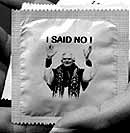 BENEDICTUS
CONDOMINUS
BENEDICTUS
CONDOMINUS |
'Foolish’
Memo on Pope’s Visit Spurs Apology by the British
By JOHN F. BURNS
The New York Times:: April 25, 2010
LONDON — Britain ’s Foreign Office
has apologized publicly for a “foolish” internal memo circulated
to government departments that suggested, with apparent sarcasm, that
the “ideal” itinerary for Pope Benedict XVI ’s visit
to Britain in September might include the pope’s opening an abortion
clinic, blessing a gay marriage and introducing a “Benedict”
brand of condoms.
The leaked memo suggested, in effect, that the visit be used to draw
critical attention to the Roman Catholic Church ’s teachings on
sex and marriage, and to highlight the scandal that has enveloped the
Vatican over the sexual abuse of children by priests and child care
workers. |
 LAWRENCE
MURPHY
LAWRENCE
MURPHY
AT ST. JOHN'S SCHOOL FOR THE DEAF |
New
Lawsuit Shows Letters to Vatican on Sexual Abuse Earlier Than Previously
Thought
By LAURIE GOODSTEIN
The New York Times: April 23, 2010
Documents released in a lawsuit filed Thursday
against Pope Benedict XVI show that the Vatican was informed more than
a year earlier than previously thought about the case of a priest who
molested deaf boys for two decades at a boarding school in Wisconsin.
One victim of the priest wrote two letters to the Vatican’s secretary
of state in 1995 asking Pope John Paul II himself to read his anguished
letters and “excommunicate” the priest, the Rev. Lawrence
Murphy .
Father Murphy, who died in 1998, admitted to a psychologist hired by
the Archdiocese of Milwaukee that he had molested 34 children when he
worked at St. John’s School for the Deaf in St. Francis, Wis.,
from 1952 to 1974. Church officials concluded that there might have
been as many as 200 victims.
The Vatican had previously said that the first notice it had about Father
Murphy was when Cardinal Joseph Ratzinger — now Pope Benedict
XVI — received a letter about the case in 1996 from Archbishop
Rembert G. Weakland of Milwaukee.
The victim said he never received a response.
What makes this lawsuit unusual is that it names as defendants Pope
Benedict; the Vatican’s current secretary of state, Cardinal Tarcisio
Bertone; a former secretary of state, Cardinal Angelo Sodano ; and the
Holy See. |
 BISHOP
ROGER
BISHOP
ROGER
VANGHELUWE |
Belgian
Bishop Quits Over Sex Abuse
By ELISABETTA POVOLEDO
The New York Times: April 23, 2010
ROME — The longest-serving bishop in Belgium
resigned Friday after admitting to sexually abusing “a young man
in my close entourage” many years ago, becoming the latest cleric
to quit in a spreading abuse scandal.
The development dealt a new blow to the Roman Catholic Church, and marked
a new entry in a corrosive catalog of disclosures that has damaged its
credibility and shaken the trust of many believers in their spiritual
leaders.
In a statement issued by the Vatican on Friday, Roger Vangheluwe, 73,
the bishop of Bruges since 1984, said that the abuse had occurred “when
I was still a simple priest and for a while when I began as a bishop.”
“This has marked the victim forever,” the statement said. |
 BISHOP
WALTER MIXA
BISHOP
WALTER MIXA |
German
Bishop Resigns in Latest Blow to Church
By NICHOLAS KULISH
The New York Times: April 22, 2010
BERLIN — A German bishop accused of beating
children decades ago when he was a priest has tendered his resignation
to Pope Benedict XVI , the diocese in Augsburg said Thursday, the latest
jolt to the Roman Catholic Church in Germany as it grapples with a swirling
sexual abuse scandal.
The accused man, Bishop Walter Mixa, was one of the church’s most
prominent and outspoken conservatives in Germany, and he aggressively
defended himself for weeks against charges of physically abusing children
in a Bavarian orphanage. |
 FERNANDO
KARADIMA
FERNANDO
KARADIMA |
Chilean
Abuse Case Tests Loyalty of a Parish
By ALEXEI BARRIONUEVO and LAURIE GOODSTEIN
The New York Times: April 23, 2010
SANTIAGO, Chile — The Rev. Fernando Karadima
is one of Chile ’s most respected and influential priests. Some
go so far as to call him a “living saint,” who for half
a century trained dozens of priests and helped mold thousands of young
Catholics from Santiago’s elite.
Now four men who were once devoted followers have filed a criminal complaint
alleging that Father Karadima, now 79, sexually abused them in secret
for years.
One man said he had reported the abuse to Father Karadima’s superiors
in the Archdiocese of Santiago as many as seven years ago, but they
took no action. All four men have filed formal complaints with the archdiocesan
tribunal and, receiving no response, spoke publicly for the first time
this week.
But the allegations have been largely met not with anger at Father Karadima
but with outrage at the accusers by many of his parishioners, a prominent
conservative politician and church officials. They say a man so respected
over so much time could not possibly have abused his followers, though
as the news broke this week, a cardinal here confirmed that the church
has been secretly investigating claims of sexual abuse leveled against
the priest. |

JUNIA

TERTULLIAN

ORIGEN OF
ALEXANDRIA
|
A
Church Mary Can Love
By NICHOLAS D. KRISTOF
The New York Times: April 18, 2010
I heard a joke the other day about a pious soul
who dies, goes to heaven, and gains an audience with the Virgin Mary.
The visitor asks Mary why, for all her blessings, she always appears
in paintings as a bit sad, a bit
Mary reassures her visitor: “Oh, everything’s great. No
problems. It’s just ... it’s just that we had always wanted
a daughter.”
That story comes to mind as the Vatican wrestles with the consequences
of a patriarchal premodern mind-set: scandal, cover-up and the clumsiest
self-defense since Watergate. That’s what happens with old boys’
clubs.
It wasn’t inevitable that the Catholic Church would grow so
addicted to male domination, celibacy and rigid hierarchies. Jesus
himself focused on the needy rather than dogma, and went out of his
way to engage women and treat them with respect.
The first-century church was inclusive and democratic, even including
a proto-feminist wing and texts. The Gospel of Philip, a Gnostic text
from the third century, declares of Mary Magdalene: “She is
the one the Savior loved more than all the disciples.” Likewise,
the Gospel of Mary (from the early second century) suggests that Jesus
entrusted Mary Magdalene to instruct the disciples on his religious
teachings.
St. Paul refers in Romans 16 to a first-century woman named Junia
as prominent among the early apostles, and to a woman named Phoebe
who served as a deacon. The Apostle Junia became a Christian before
St. Paul did (chauvinist translators have sometimes rendered her name
masculine, with no scholarly basis).
Yet over the ensuing centuries, the church reverted to strong patriarchal
attitudes, while also becoming increasingly uncomfortable with sexuality.
The shift may have come with the move from house churches, where women
were naturally accepted, to more public gatherings.
The upshot is that proto-feminist texts were not included when the
Bible was compiled (and were mostly lost until modern times). Tertullian,
an early Christian leader, denounced women as “the gateway to
the devil,” while a contemporary account reports that the great
Origen of Alexandria took his piety a step further and castrated himself.
|
 FRANK
CAPELLUPO
FRANK
CAPELLUPO |
Molest
'trial' is diocese's shot at redemption
Andrea Peyser
The New York Post: April 12, 2010
The skinny boy with the shock of black hair
thought he'd met the dad he'd craved his entire young life. The caring
man bought the boy posters from his favorite movie, "Rocky."
He lavished him with attention and took him on trips. He was a priest.
"He was a father to me," the boy, now grown, told me. "He
took an interest in me. He lifted up my self-esteem. He molested me."
This story unfolded 25 years ago at Most Precious Blood Parish in
Queens. But it has spawned a case that is being watched closely by
the Brooklyn Diocese and beyond. Because, on March 26, the diocese
staged a proceeding that's never before been used there in a case
of alleged molestation. Facing three priests acting as judges, the
accused, the Rev. Frank Capellupo*, 62, went before a rare and hush-hush
religious tribunal.
And those awaiting the results of the unusual, one-day canonical trial
-- Capellupo could be booted from the priesthood -- will decide whether
the church is serious about rooting out bad seeds hiding among the
cloth.
But the man who came forward nine years ago with a claim of sodomy
and betrayal has one question: What took so long? "Am I satisfied?"
he asked. "I mean, they're doing a lot of catch-up work. A lot
of work to cover their ass."
*
Often held late-night parties in rectory for teenage boys. Bishop
Daily was informed of this fact by at least two priests but did nothing.
In 2000 Capellupo was arrested for allegedly sodomizing a 14 yr old
boy staying at rectory because of problems at home.
Source:
Database of Publicly Accused Priests in the United States
BishopAccountability.org
|

CELESTINE
V
July
7, 1294 to
December 13, 1294

GREGORY
XII
1406
to 1415
|
Do
Popes Quit?
By DANIEL J. WAKIN
The New York Times: April 9, 2010
VATICAN CITY - He is elected for life, by a
group of elderly men infused with the will of God. People address
him as Holy Father, not Mr. President. After bishop of Rome, his second
title is vicar of Jesus Christ.
A smattering of voices suggest that Pope Benedict XVI can, and should,
as outrage has built in recent weeks over clerical abuses in the Catholic
Church. The calls — from some lay Catholics, bloggers, secular
publications like the German magazine Der Spiegel and street protesters
— have been fueled by reports that laid blame at his doorstep,
citing his response both as a bishop long ago in Germany and as a
cardinal heading the Congregation for the Doctrine of the Faith, which
handles these cases. In the most recent disclosure, on Friday, the
news emerged that in 1985, when Benedict was Cardinal Ratzinger, he
signed a letter putting off efforts to defrock a convicted child-molesting
priest. He cited the priest’s relative youth but also the good
of the church.
Vatican officials and experts who follow the papacy closely dismiss
the idea of stepping down. “There is no objective motive to
think in terms of resignation, absolutely no motive,” said the
Rev. Federico Lombardi, the Vatican spokesman, in an interview before
Friday’s disclosure. “It’s a completely unfounded
idea.”
Of
course, popes have resigned before — the last a mere 595 years
ago, when Gregory XII stepped down to heal a schism. Before that,
Celestine V, a fiercely ascetic former hermit who wore his temporal
power heavily, resigned in 1294 (Dante consigned him to hell for cowardice,
some interpreters of the “Inferno” believe).
|
 ERFURT
CATHEDRAL
ERFURT
CATHEDRAL |
Diocese
in Germany Files Action Against Priest
By NICHOLAS KULISH
The New York Times: April 9, 2010
BERLIN — A German diocese said Friday that
it had filed a criminal complaint this week against a Roman Catholic
priest on charges of sexually abusing minors in the 1980s and ’90s.
The 61-year-old priest was accused of sexually assaulting four boys
from 1980 to 1996. The man, identified only as Father Ernst W., confirmed
the accusations against him when questioned by church officials, according
to a statement Friday by the Diocese of Erfurt, in central Germany.
Although church officials were aware of one of the sexual abuse accusations
against him, the priest was allowed to work in a juvenile detention
facility from January 2004 to August 2006 without informing the authorities
of his history. |
 STEPHEN
KIESLE
STEPHEN
KIESLE |
Pope
Put Off Punishing Abusive Priest
By LAURIE GOODSTEIN and MICHAEL LUO
The New York Times: April 9, 2010
The priest, convicted of tying up and abusing
two young boys in a California church rectory, wanted to leave the
ministry.
But in 1985, four years after the priest and his bishop first asked
that he be defrocked, the future Pope Benedict XVI , then a top Vatican
official, signed a letter saying that the case needed more time and
that “the good of the Universal Church” had to be considered
in the final decision, according to church documents released through
lawsuits.
That decision did not come for two more years, the sort of delay that
is fueling a renewed sexual abuse scandal in the church that has focused
on whether the future pope moved quickly enough to remove known pedophiles
from the priesthood, despite pleas from American bishops.
As the scandal has deepened, the pope’s defenders have said
that, well before he was elected pope in 2005, he grew ever more concerned
about sexual abuse and weeding out pedophile priests. But the case
of the California priest, the Rev. Stephen Kiesle, and the trail of
documents first reported on Friday by The Associated Press, shows,
in this period at least, little urgency.

|
 JOSEPH
PALANIVEL
JOSEPH
PALANIVEL
JEYAPAUL |
Priest
accused of US abuse still working in India
By PATRICK CONDON and RAVI NESSMAN, Associated Press
STAR TRIBUNE/AP: April 5, 2010
ST. PAUL, Minn. - Top officials at the Vatican
were warned more than four years ago about a Catholic priest later
charged with sexually assaulting a 14-year-old girl in Minnesota,
according to newly released Vatican correspondence, but to this day
he continues to work in his home diocese in India.
[Documents show that the American bishop warned the Vatican that the
priest was accused of molesting two teenage girls whose trust he gained
by promising to discuss their interest in becoming nuns.
A county attorney in Minnesota is seeking to extradite the priest
from India in a criminal case that involves one of the girls, who
said the priest had forced her to perform oral sex and had threatened
her and her family.]*
Jeyapaul denied the abuse allegations and said he has no plans to
return to the United States to face the courts.
*
Priest Charged
in U.S. Is Still Serving in India
LAURIE GOODSTEIN / The New York Times: April 5, 2010
|
 MICHAEL
TETA
MICHAEL
TETA
No image available |
New
Vatican abuse shocker
Associated Press: April 3, 2010
The future Pope Benedict XVI took over the abuse
case of an Arizona priest, then let it languish at the Vatican for years
despite repeated pleas from a bishop for the man to be removed from
the priesthood, according to church correspondence.
Documents reviewed by The Associated Press show that in the 1990s, a
church tribunal found that the Rev. Michael Teta of Tucson, Ariz., had
molested children as far back as the late 1970s.
The panel deemed his behavior -- including allegations that he abused
boys in a confessional -- almost "satanic." The tribunal referred
his case to then-Cardinal Joseph Ratzinger, who would become pope in
2005.
But it took 12 years from the time Ratzinger assumed control of the
case in a signed letter until Teta was removed, a step only the Vatican
can take. |

ROWAN
WILLIAMS
Archbishop of Canterbury
|
Anglican
Says Irish Church Has Lost Credibility
THE ASSOCIATED PRESS: April 3, 2010
LONDON -- The Roman Catholic church in Ireland
has lost its credibility because of its mishandling of abuse by priests,
the leader of the Anglican church said in remarks released Saturday.
A leading Catholic archbishop said he was ''stunned'' by the comments.
It was the first time Archbishop of Canterbury Rowan Williams , the
spiritual leader of the Church of England, has spoken publicly on the
crisis engulfing the Catholic church. The remarks come ahead of a planned
visit to England and Scotland by Pope Benedict XVI later this year.
''I was speaking to an Irish friend recently who was saying that it's
quite difficult in some parts of Ireland to go down the street wearing
a clerical collar now,'' Williams told the BBC . ''And an institution
so deeply bound into the life of a society, suddenly becoming, suddenly
losing all credibility -- that's not just a problem for the church,
it is a problem for everybody in Ireland, I think.'' |

RANIERO
CANTALAMESSA
Preacher of the Papal Household
|
Vatican
Priest Likens Criticism Over Abuse to Anti-Semitism
By DANIEL J. WAKIN and RACHEL DONADIO
The New York Times: April 2, 2010
ROME — A senior Vatican priest, speaking
before Pope Benedict XVI at a Good Friday service, compared the world’s
outrage at sexual abuse scandals in the Catholic Church to the persecution
of the Jews, prompting angry responses from victims’ advocates
and consternation from Jewish groups.
The Vatican spokesman quickly distanced the Vatican from the remarks,
which came on the day Christians mark the Crucifixion. They underscored
how much the Catholic Church has felt under attack from recent news
reports and from criticism over how it has handled charges of child
molesting against priests in the past.
Speaking
in St. Peter’s Basilica, the priest, the Rev. Raniero Cantalamessa,
took note that Easter and Passover fell during the same week this
year, and said he was led to think of the Jews.
“They know from experience what it means to be victims of collective
violence, and also because of this they are quick to recognize the
recurring symptoms,” said Father Cantalamessa, who serves under
the title of preacher of the papal household. Then he quoted from
what he said was a letter from a Jewish friend he did not identify.
|

MIKE
LUCKOVICH |
Editorial
Cartoon
by Mike Luckovich
The New Kork Post: March 28,2010
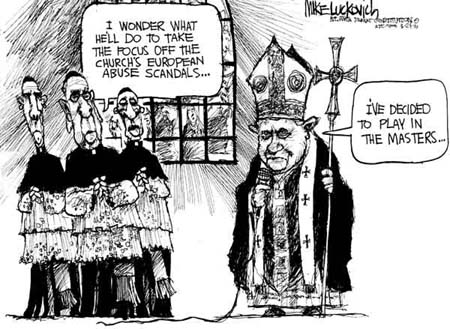
-
FULL ARTICLE -
|

NOPE
DOWD
|
A
Nope for Pope
By MAUREEN DOWD
The New York Times: March 28, 2010
Yup, we need a Nope.
A nun who is pope.
The Catholic Church can never recover as long as its Holy Shepherd
is seen as a black sheep in the ever-darkening sex abuse scandal.
Now we learn the sickening news that Cardinal
Joseph Ratzinger, nicknamed “God’s Rottweiler”
when he was the church’s enforcer on matters of faith and sin,
ignored repeated warnings and looked away in the case of the Rev.
Lawrence C. Murphy, a Wisconsin priest who molested as many as 200
deaf boys.
The church has been tone deaf and dumb on the scandal for so long
that it’s shocking, but not surprising, to learn from The Times’s
Laurie Goodstein that a group of deaf former students spent 30 years
trying to get church leaders to pay attention.
It was only when the sanctity of the confessional was breached that
an archbishop in Wisconsin (who later had to resign when it turned
out he used church money to pay off a male lover) wrote to Cardinal
Ratzinger at the Vatican to request that Father Murphy be defrocked.
The cardinal did not answer. The archbishop wrote to a different Vatican
official, but Father Murphy appealed to Cardinal
Ratzinger for leniency and got it, partly because of the church’s
statute of limitations.
Since
when does sin have a statute of limitations?
|

MARCIAL
MACIEL DEGOLLADO
|
Catholic
Order Admits Its Founder Abused Boys Over Decades
By RACHEL DONADIO
The New York Times: March 27, 2010
ROME — A powerful Roman Catholic religious
order acknowledged in a statement on Friday that its founder, a close
ally of the late Pope John Paul II , molested seminarians and fathered
several children, and it expressed “sorrow and grief” to
anyone “damaged by our founder’s actions.”
The statement was the first official admission by the Legionaries of
Christ that its charismatic Mexican founder, the Rev. Marcial Maciel
Degollado, who died in 2008, was responsible for many “grave acts.”
Around two dozen people had claimed that Father Maciel’s molesting
of boys continued for decades.
The statement was viewed as an important development because Father
Maciel was a beloved friend of Pope John Paul, and the accusations of
abuse against him were vetted personally by Cardinal Joseph Ratzinger
, now Pope Benedict XVI. |
 STEVEN
GEIER
STEVEN
GEIER
Victim |
For
Years, Deaf Boys Tried to Tell of Priest’s Abuse
By LAURIE GOODSTEIN and DAVID CALLENDER
The New York Times: March 26, 2010
They were deaf, but they were not silent. For
decades, a group of men who were sexually abused as children by the
Rev. Lawrence C. Murphy at a school for the deaf in Wisconsin reported
to every type of official they could think of that he was a danger,
according to the victims and church documents.
They told other priests. They told three archbishops of Milwaukee.
They told two police departments and the district attorney. They used
sign language, written affidavits and graphic gestures to show what
exactly Father Murphy had done to them. But their reports fell on
the deaf ears of hearing people.
This week, they learned that Cardinal Joseph Ratzinger , now Pope
Benedict XVI, received letters about Father Murphy in 1996 from Archbishop
Rembert G. Weakland of Milwaukee, who said that the deaf community
needed “a healing response from the Church.” The Vatican
sat on the case, then equivocated, and when Father Murphy died in
1998, he died a priest.
|
 SILENCE!
SILENCE! |
Pope
Was Told Pedophile Priest Would Get Transfer
Documents suggest that Pope Benedict
was kept informed of a pedophile priest's case
By NICHOLAS KULISH and KATRIN BENNHOLD
The New York Times: March 25, 2010
MUNICH — The future Pope Benedict XVI was
kept more closely apprised of a sexual abuse case in Germany than previous
church statements have suggested, raising fresh 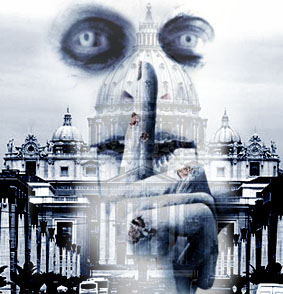 questions
about his handling of a scandal unfolding under his direct supervision
before he rose to the top of the church’s hierarchy. questions
about his handling of a scandal unfolding under his direct supervision
before he rose to the top of the church’s hierarchy.
Cardinal Joseph Ratzinger, the future pope and archbishop in Munich
at the time, was copied on a memo that informed him that a priest, whom
he had approved sending to therapy in 1980 to overcome pedophilia, would
be returned to pastoral work within days of beginning psychiatric treatment.
The priest was later convicted of molesting boys in another parish.
An initial statement on the matter issued earlier this month by the
Archdiocese of Munich and Freising placed full responsibility for the
decision to allow the priest to resume his duties on Cardinal Ratzinger’s
deputy, the Rev. Gerhard Gruber. But the memo, whose existence was confirmed
by two church officials, shows that the future pope not only led a meeting
on Jan. 15, 1980, approving the transfer of the priest, but was also
kept informed about the priest’s reassignment. |
 REV.
LAWRENCE C. MURPHY
REV.
LAWRENCE C. MURPHY |
Vatican
Declined to Defrock U.S. Priest Who Abused Boys
By LAURIE GOODSTEIN
The New York Times: March 25, 2010
Top Vatican officials — including the future
Pope Benedict XVI — did not defrock a priest who molested as many
as 200 deaf boys, even though several American bishops repeatedly warned
them that failure to act on the matter could embarrass the church, according
to church files newly unearthed as part of a lawsuit.
The internal correspondence from bishops in Wisconsin directly to Cardinal
Joseph Ratzinger, the future pope, shows that while church officials
tussled over whether the priest should be dismissed, their highest priority
was protecting the church from scandal.
The documents emerge as Pope Benedict is facing other accusations that
he and direct subordinates often did not alert civilian authorities
or discipline priests involved in sexual abuse when he served as an
archbishop in Germany and as the Vatican ’s chief doctrinal enforcer.
The Wisconsin case involved an American priest, the Rev. Lawrence C.
Murphy, who worked at a renowned school for deaf children from 1950
to 1974. But it is only one of thousands of cases forwarded over decades
by bishops to the Vatican office called the Congregation for the Doctrine
of the Faith, led from 1981 to 2005 by Cardinal Ratzinger. |
 JOHN
MAGEE
JOHN
MAGEE
Bishop of Cloyne |
Abuse
Scandal’s Ripples Spread Across Europe
By KATRIN BENNHOLD ,NICHOLAS KULISH and RACHEL DONADIO
The New York Times: March 24, 2010
MUNICH — The fallout from the sexual abuse
scandal in the Roman Catholic Church settled across Europe on Wednesday,
as prosecutors said they were weighing criminal charges against a
priest suspected of molesting children in Germany , and Pope Benedict
XVI accepted the resignation of a bishop accused of mishandling
The possibility of criminal charges emerged from new accusations against
a priest at the center of the child-molesting scandal rocking the
church in Germany. On Wednesday, church officials in Munich said the
priest, the Rev. Peter Hullermann — whose transfer in 1980 to
an archdiocese led at the time by Benedict, then Archbishop Joseph
Ratzinger, has drawn the pope himself into the nation’s child
abuse controversy — had been accused of molesting a minor as
recently as 1998.
•
In Ireland, Bishop John Magee, whose resignation was accepted by the
pope on Wednesday, issued a statement of apology. In 2008, an investigation
by a church panel into allegations in Cloyne found that Bishop Magee
had failed to respond to accusations of abuse and that policies to
protect children were severely lacking, setting off calls for his
resignation.
Bishop Magee’s was the first resignation the pope accepted since
issuing a long-awaited letter to Irish Catholics last weekend apologizing
to victims of sexual abuse and expressing “shame and remorse.”
|

PETER
HULLERMANN
|
German
Priest in Church Abuse Case Is Suspended
By NICHOLAS KULISH
The New York Times: March 15, 2010
MUNICH — The priest at the center of a
German sexual-abuse scandal that has embroiled Pope Benedict XVI continued
working with children for more than 30 years, even though a German
court convicted him of
The priest, Peter Hullermann, who had previously been identified only
by the first letter of his last name, was suspended from his duties
only on Monday. That was three days after the church acknowledged
that the pope, then Archbishop Joseph Ratzinger, had responded to
early accusations of molestation by allowing the priest to move to
Munich for therapy in 1980.
Hundreds of victims have come forward in recent months in Germany
with accounts of sexual abuse from decades past. But no case has captured
the attention of the nation like that of Father Hullermann, not only
because of the involvement of the future pope, but also because of
the impunity that allowed a child molester to continue to work with
altar boys and girls for decades after his conviction.
Benedict not only served as the archbishop of the diocese where the
priest worked, but also later as the cardinal in charge of reviewing
sexual abuse cases for the Vatican . Yet until the Archdiocese of
Munich and Freising announced that Father Hullermann had been suspended
on Monday, he continued to serve in a series of Bavarian parishes.
Cardinal
Who Didn’t Report Abuse Won’t Quit
THE ASSOCIATED PRESS: Published: March 15, 2010
 Ireland:
Cardinal Sean Brady, left, the leader
of Ireland ’s Roman Catholics, said Monday that he would not
resign, despite admitting that he helped the church get evidence against
a child-molesting priest but never told the police about it. He said
that as a priest in 1975, he interviewed two children who said they
had been abused by the Rev. Brendan Smyth, who was eventually accused
of molesting and raping scores of children in Ireland, Britain and
the United States. Both children were required to sign oaths promising
not to tell anyone outside the church of their accusations, Cardinal
Brady said. He said that church officials had not notified the police
because of “a culture of silence about this, a culture of secrecy.” Ireland:
Cardinal Sean Brady, left, the leader
of Ireland ’s Roman Catholics, said Monday that he would not
resign, despite admitting that he helped the church get evidence against
a child-molesting priest but never told the police about it. He said
that as a priest in 1975, he interviewed two children who said they
had been abused by the Rev. Brendan Smyth, who was eventually accused
of molesting and raping scores of children in Ireland, Britain and
the United States. Both children were required to sign oaths promising
not to tell anyone outside the church of their accusations, Cardinal
Brady said. He said that church officials had not notified the police
because of “a culture of silence about this, a culture of secrecy.”
-
FULL ARTICLE -
|

HOLY
WARRIORS
Jonathan Phillips
|
HOLY
WARRIORS: A Modern History of the Crusades
By Jonathan Phillips
BUTCHERS
AND SAINTS
Review by ERIC ORMSBY
The New York Times/Book Review: March 14, 2010
The villains of history seem relatively
easy to understand; however awful their deeds, their motives remain
recognizable. But the good guys, those their contemporaries saw as
heroes or saints, often puzzle and appall.
They
did the cruelest things for the loftiest of motives; they sang hymns
as they waded through blood.
Nowhere,
perhaps, is this contradiction more apparent than in the history of
the Crusades. When the victorious knights of the First Crusade finally
stood in Jerusalem, on July 15, 1099, they were, in the words of the
chronicler William of Tyre, “dripping with blood from head to
foot.” They had massacred the populace. But in the same breath,
William praised the “pious devotion . . . with which the pilgrims
drew near to the holy places, the exultation of heart and happiness
of spirit with which they kissed the memorials of the Lord’s
sojourn on earth.”
It’s tempting to dismiss the crusaders’ piety as sheer
hypocrisy. In fact, their faith was as pure as their savagery. As
Jonathan Phillips observes in his excellent new history — in
case we needed reminding at this late date — “faith lies
at the heart of holy war.”
In
the rigid, polarized mentality of the holy warrior, any deviation
can signify a dangerous otherness. This is the best recent history
of the Crusades; it is also an astute depiction of a frightening cast
of mind.
|
 MSGR.
GEORG RATSINGER
MSGR.
GEORG RATSINGER
and his brother
BENEDICT XVI |
Vatican
on Defense as Sex Scandals Build
By RACHEL DONADIO and NICHOLAS KULISH
The New York Times: March 9, 2010
ROME — Defending itself against a growing
child sexual abuse scandal in Europe, one that has even come close
to the brother of Pope Benedict XVI , the Vatican said Tuesday that
local European churches had addressed the issue with “timely
and decisive action.”
Pope Benedict XVI, right, with his brother, Monsignor Georg Ratzinger,
in Regensburg, Germany in 2006.
In a note read on Vatican Radio , the Vatican spokesman, the Rev.
Federico Lombardi, cautioned against limiting the concerns over child
sexual abuse to Roman Catholic institutions, noting that the problem
also affected the broader society.
A wave of church sexual abuse scandals has emerged in recent weeks
in Germany , Austria, and the Netherlands , adding to the fallout
from a broad abuse investigation in Ireland .
|
 ANGELO
ANGELO
BALDUCCI |
Vatican
Enmeshed in Gay Sex Allegations
By RACHEL DONADIO
The New York Times: March 4, 2010
ROME — A singer in an elite Vatican
choir and a jailed Italian public works executive who served as a papal
usher were let go by the Vatican this week amid allegations that they
were involved in what prosecutors believe was an organized network of
gay prostitution, Italian news media reported.
Ghinedu Ehiem, a Nigerian who sang in a choir that performs at St. Peter’s
Basilica, was dismissed after the center-left daily newspaper La Repubblica
reported Wednesday that he had procured men, including seminarians,
for Angelo Balducci, a former member of the board of Italy’s public
works department who was arrested and jailed last month on corruption
charges. |
 JOHN
PAUL II
JOHN
PAUL II |
John
Paul II Whipped Self
By NICOLE WINFIELD
AP: January 27, 2010
VATICAN CITY -- Pope John Paul II whipped himself with a belt, even
on vacation, and slept on the floor as acts of penitence and to bring
him closer to Christian perfection, according to a new book by the Polish
prelate spearheading the late pontiff's sainthood case. |
 PIUS
XII
PIUS
XII |
Pope
Quiz: Is Every Pontiff a Saint?
By DAVID GIBSON
The New York Times: January 17, 2010
Should
any pope be made a saint?
The church counts less than a third of all 264 dead popes as saints,
and most were canonized by popular acclaim in the first centuries
of Christianity, often because they were martyrs. Only five were canonized
in the entire second millennium, and when Pius X, who died in 1914,
was made a saint in 1954 — by Pius XII — he was the first
pope so honored in nearly 400 years.
Now nearly every recent pope is on the canonization track. John Paul
II beatified Pius IX, the 19th-century pope who is a polarizing figure
because of his belief in the power of the papacy and his views on
Judaism. But like Benedict, John Paul did a little ticket-balancing.
He simultaneously beatified the popular John XXIII, who convened the
liberalizing Second Vatican Council in 1962. The canonization process
for Paul VI, who followed John XXIII, is underway, and there is a
campaign to beatify John Paul I, who reigned a mere 33 days before
his death in 1978.
|

MAUREEN
DOWD
|
The
Nuns’ Story
By MAUREEN DOWD
The New York Times: October 24, 2009
In 2004, the cardinal who would become Pope Benedict XVI wrote a Vatican
document urging women to be submissive partners, resisting any adversarial
roles with men and cultivating “feminine values” like
“listening, welcoming, humility, faithfulness, praise and waiting.”
Nuns need to be even more sepia-toned for the über-conservative
pope, who was christened “God’s Rottweiler” for
his enforcement of orthodoxy. Once a conscripted member of the Hitler
Youth, Benedict pardoned a schismatic bishop who claimed that there
was no Nazi gas chamber. He also argued on a trip to Africa that distributing
condoms could make the AIDS crisis worse.
The Vatican is now conducting two inquisitions into the “quality
of life” of American nuns, a dwindling group with an average
age of about 70, hoping to herd them back into their old-fashioned
habits and convents and curb any speck of modernity or independence.
|
Rowan
Williams
Anglican archbishop of Canterbury

VINCENT NICHOLS
Catholic archbishop of Westminster
|
Vatican
Bidding to Get Anglicans to Join Its Fold
By RACHEL
DONADIO and LAURIE GOODSTEIN
The New York Times: October 20, 2009
VATICAN
CITY — In an extraordinary bid to lure traditionalist Anglicans
en masse, the Vatican said Tuesday that it would make it easier for
Anglicans uncomfortable with their church’s acceptance of female
priests and openly gay bishops to join the Roman Catholic Church while
retaining many of their traditions.
Anglicans would be able “to enter full communion with the Catholic
Church while preserving elements of the distinctive Anglican spiritual
and liturgical patrimony,” Cardinal William J. Levada , the
prefect for the Congregation for the Doctrine of the Faith , said
at a news conference here.
It was unclear why the Vatican made the announcement now. But it seemed
a rare opportunity, audaciously executed, to capitalize on deep divisions
within the Anglican Church to attract new members at a time when the
Catholic Church has been trying to reinvigorate itself in Europe.
Photo:
Matt Dunham/Associated Press
|
 BENEDICT
XVI
BENEDICT
XVI |
Pope
Ends Czech Visit With Warning About Power
Max Rossi/Reuters
The New York Times: September 28, 2009
PRAGUE — Ending a three-day trip here aimed at fighting secularism,
Pope Benedict XVI told about 40,000 of the faithful on Monday that the
collapse of the Communist system had shown the price paid by those who
chase power and deny God.
The pope came to this decidedly skeptical nation as part of a Continentwide
mission to urge the unbelieving out of their collective apathy.
But while Benedict’s visit has been warmly received by the country’s
Roman Catholics, the pope has been faced with the overwhelming indifference
of a nation unmoved by religion.
During his visit to the Czech Republic, where civil unions between gay
men and lesbians have been legal since 2006 and abortion has been permissible
for decades, the pope avoided delicate social issues.
Yet many Czechs said his mission here had been futile. “Catholicism
is not going to catch on here where cynicism and ‘What’s
the point?’ are the national ideology,” said Dominik Jun,
31, a filmmaker. “More Czechs believe in infomercials on television
than they do in religion.”
Max Rossi/Reuters |
 PAUL
R.
PAUL
R.
SHANLEY |
Ex-Priest
Challenges Abuse Conviction on Repressed Memories
By KATIE ZEZIMA and BENEDICT CAREY
The New York Times: September 10, 2009
BOSTON — Paul R. Shanley, 78, a defrocked
Roman Catholic priest at the center of the clergy abuse crisis here,
was convicted in 2005 of raping and assaulting a 6-year-old boy while
serving as a priest in suburban Boston, in a case that hinged on memories
of abuse the accuser said he had repressed and recovered decades later.
Mr. Shanley, a controversial street priest who worked with runaways,
troubled youth and denounced the Roman Catholic Church’s stance
on homosexuality, was accused of abuse by about 24 people. But only
the case of the accuser, now a 32-year-old suburban Boston firefighter,
made it to trial. |

MOTHER
MARY CLARE
MILLEA |
U.S.
Nuns Facing Vatican Scrutiny
By LAURIE GOODSTEIN
The New York Times: July 2, 2009
The Vatican is quietly conducting two sweeping investigations of American
nuns, a development that has startled and dismayed nuns who fear they
are the targets of a doctrinal Inquisition.
“Next
time, let’s have our women religious study the quality of life
of our male clerics.”
~
TOM FOX
Editor of The National Catholic Reporter
|
 BISHOP
BISHOP
NICHOLAS
DiMARZIO |
Bishop
Avidly Opposes Bill Extending Time to File Child-Abuse Suits
By PAUL VITELLO
The
New York Times: June 4, 2009
Bishop Nicholas A. DiMarzio of Brooklyn repeated a warning this week
that he has leveled at lawmakers for months: If the statute of limitations
on child sex-abuse lawsuits is temporarily lifted, as pending state
legislation proposes, a cascade of very bad things will happen.
His Roman Catholic diocese and others will go bankrupt. Bishops like
him will be forced to close churches and schools. And wrathful constituents
will punish the politicians who, in his view, will have made this all
happen. |
 ARCHBISHOP
ARCHBISHOP
VINCENT
NICHOLS |
Catholic
Archbishop Explains Remarks on ‘Courage’
of Abusers
By Robert Mackey
The New York Times: May 21, 2009
The new head of the Catholic Church in England and Wales, Archbishop
Vincent Nichols — who said on Wednesday that it “TAKES COURAGE”
for members of the clergy in Ireland who abused children “to face
these facts from their past, which instinctively and quite naturally
they’d rather not look at.” |

ST.
JOSEPH’S
INDUSTRIAL
SCHOOL

JOHN
BANVILLE
|
Report
Details Abuses in Irish Reformatories
By SARAH LYALL
The New York Times: May 21, 2009
LONDON — Tens of thousands of Irish children were sexually,
physically and emotionally abused by nuns, priests and others over
60 years in a network of church-run residential schools meant to care
for the poor, the vulnerable and the unwanted, according to a report
released in Dublin on Wednesday.
The Vatican had no response.
FOLLOW-UP
/ OP-ED
A Century of
Looking the Other Way
By JOHN BANVILLE
May 22, 2009
DUBLIN -- EVERYONE knew. When the Commission to Inquire Into Child
Abuse issued its report this week, after nine years of investigation,
the Irish collectively threw up their hands in horror, asking that
question we have heard so often, from so many parts of the world,
throughout the past century: How could it happen?
|
 REMBERT
G.
REMBERT
G.
WEAKLAND |
Ex-Archbishop
Speaks About Catholic Church and Homosexuality
The New York Times: May 15, 2009
In spring 2002, as the scandal over sexual abuse by Roman Catholic priests
was escalating, the long career of Archbishop Rembert G. Weakland of
Milwaukee, one of the church’s most venerable voices for change,
went up in flames one May morning. |

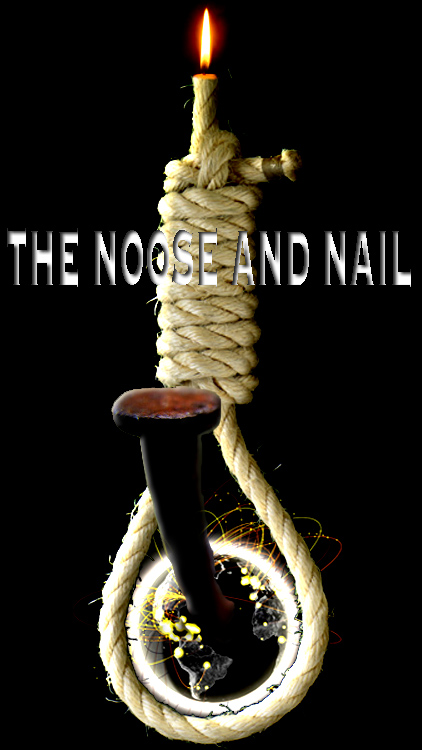





 Pennsylvania
State University’s legendary football coach, Joe
Paterno, and led to criminal charges against two high-level administrators
offers a tragic example of the willful blindness that sets in when
colleges worship
sports.
Pennsylvania
State University’s legendary football coach, Joe
Paterno, and led to criminal charges against two high-level administrators
offers a tragic example of the willful blindness that sets in when
colleges worship
sports. But
a painfully fresh case is devastating Catholics in Kansas City, Mo.,
where a priest, who was arrested in May, has been indicted by a federal
grand jury on charges of taking indecent photographs
of young girls, most recently during an Easter egg hunt just four months
ago.
But
a painfully fresh case is devastating Catholics in Kansas City, Mo.,
where a priest, who was arrested in May, has been indicted by a federal
grand jury on charges of taking indecent photographs
of young girls, most recently during an Easter egg hunt just four months
ago. that
he knew of the existence of photographs last December but did not turn
them over to the police until May.
that
he knew of the existence of photographs last December but did not turn
them over to the police until May. polarizing
figure in his diocese, and there are widespread calls for him to resign
or even to be prosecuted. Parishioners started a facebook
page called “Bishop
Finn Must Go” and are circulating a
petition. An editorial in The Kansas City
Star in June calling for the bishop to step down concluded that prosecutors
must “actively pursue all relevant criminal
charges” against everyone involved.
polarizing
figure in his diocese, and there are widespread calls for him to resign
or even to be prosecuted. Parishioners started a facebook
page called “Bishop
Finn Must Go” and are circulating a
petition. An editorial in The Kansas City
Star in June calling for the bishop to step down concluded that prosecutors
must “actively pursue all relevant criminal
charges” against everyone involved. Michael
Hunter, an abuse victim who was part of that settlement and is
now the president of the Kansas City chapter of the Survivors
Network of those Abused by Priests,
said: “There were 90 nonmonetary
agreements that the diocese signed on to, and they were things like
reporting immediately to the police. And they didn’t do it. That’s
really what sickens us as much as the abuse.”
Michael
Hunter, an abuse victim who was part of that settlement and is
now the president of the Kansas City chapter of the Survivors
Network of those Abused by Priests,
said: “There were 90 nonmonetary
agreements that the diocese signed on to, and they were things like
reporting immediately to the police. And they didn’t do it. That’s
really what sickens us as much as the abuse.” 
 movement
Opus Dei.
movement
Opus Dei. Father
Ratigan (right) worked hand-delivered a letter to the vicar general
reporting specific episodes that had raised alarms:
the priest put a girl on his lap during
a bus ride and allowed children to reach into his pants pockets for
candy. When a Brownie troop visited Father Ratigan’s house, a
parent reported finding a pair of girl’s panties in a planter,
the letter said.
Father
Ratigan (right) worked hand-delivered a letter to the vicar general
reporting specific episodes that had raised alarms:
the priest put a girl on his lap during
a bus ride and allowed children to reach into his pants pockets for
candy. When a Brownie troop visited Father Ratigan’s house, a
parent reported finding a pair of girl’s panties in a planter,
the letter said. requirement
that sex education be taught at all public
middle and high schools “troubling”
on Wednesday, and some Catholic officials said
they would advise Catholic parents not to let their children participate.
requirement
that sex education be taught at all public
middle and high schools “troubling”
on Wednesday, and some Catholic officials said
they would advise Catholic parents not to let their children participate. “Parents have the right and the
responsibility to be the first and primary educators of their children,”
Joseph
Zwilling, director of communications for the archdiocese,
wrote in a statement. “This mandate
by the city usurps that role, and allows the public
school system to substitute its beliefs and values for those
of the parents.”
“Parents have the right and the
responsibility to be the first and primary educators of their children,”
Joseph
Zwilling, director of communications for the archdiocese,
wrote in a statement. “This mandate
by the city usurps that role, and allows the public
school system to substitute its beliefs and values for those
of the parents.”
 HealthSmart
and Reducing the Risk — describes
abstinence as the best method to avoid pregnancy and sexually transmitted
diseases. It includes
lessons on how to use a condom and discussions about the appropriate
age for sexual activity.
HealthSmart
and Reducing the Risk — describes
abstinence as the best method to avoid pregnancy and sexually transmitted
diseases. It includes
lessons on how to use a condom and discussions about the appropriate
age for sexual activity.  to
the “overall lesson” of the
city’s program, “that abstinence is
a nice ideal.”
to
the “overall lesson” of the
city’s program, “that abstinence is
a nice ideal.”
 Souleimane
Konaté, an imam who is the head
of the Masjid Aqsa mosque in Harlem, said
he was in favor of the requirement.
Souleimane
Konaté, an imam who is the head
of the Masjid Aqsa mosque in Harlem, said
he was in favor of the requirement.
 Rigali,
the Roman Catholic leader of Philadelphia, on the grounds that he had
reached the retirement age of 75, the Vatican said in
a statement on Tuesday, some five months after the
city’s 1.5 million-member archdiocese was convulsed by evidence
that officials had ignored sexual-abuse charges
against dozens of active priests.
Rigali,
the Roman Catholic leader of Philadelphia, on the grounds that he had
reached the retirement age of 75, the Vatican said in
a statement on Tuesday, some five months after the
city’s 1.5 million-member archdiocese was convulsed by evidence
that officials had ignored sexual-abuse charges
against dozens of active priests. The
Vatican confirmed that Cardinal Rigali would be succeeded by Archbishop
Charles Chaput of Denver, 66, a Native American who
is known for his aggressive public opposition to abortion and same-sex
marriage, according to people familiar with the plans.
The
Vatican confirmed that Cardinal Rigali would be succeeded by Archbishop
Charles Chaput of Denver, 66, a Native American who
is known for his aggressive public opposition to abortion and same-sex
marriage, according to people familiar with the plans. bishops,
although some have served beyond the age of 75. His
resignation is being accepted only now.
bishops,
although some have served beyond the age of 75. His
resignation is being accepted only now.

 Saturday,
vowing to ban politicians
who supported the measure from any Catholic church and parochial school
events.
Saturday,
vowing to ban politicians
who supported the measure from any Catholic church and parochial school
events. Archbishop
Dolan made no mention of gay marriage during the 10:15 a.m. Mass at
St. Patrick’s Cathedral. He did not criticize
state lawmakers, or offer an impassioned defense of the church’s
view of marriage.
Archbishop
Dolan made no mention of gay marriage during the 10:15 a.m. Mass at
St. Patrick’s Cathedral. He did not criticize
state lawmakers, or offer an impassioned defense of the church’s
view of marriage. has
been a low-key presence during the debate over same-sex marriage in
the state, called in to a capital radio
talk show Friday morning to warn that the proposed legislation posed
an “ominous threat” to society.
has
been a low-key presence during the debate over same-sex marriage in
the state, called in to a capital radio
talk show Friday morning to warn that the proposed legislation posed
an “ominous threat” to society.
 That commitment has been called into question in recent months with
revelations that accused priests were allowed to continue in ministry
in the Archdiocese of Philadelphia
(left: Archbishop Justin Francis Rigali)
and the Diocese of Kansas City-St. Joseph
(right: Bishop Robert W. Finn).
Those bishops did not forward details
about all the cases to their sexual abuse advisory boards or the police.
That commitment has been called into question in recent months with
revelations that accused priests were allowed to continue in ministry
in the Archdiocese of Philadelphia
(left: Archbishop Justin Francis Rigali)
and the Diocese of Kansas City-St. Joseph
(right: Bishop Robert W. Finn).
Those bishops did not forward details
about all the cases to their sexual abuse advisory boards or the police. the
current charter because it is effective. The
charter was approved on a vote of 187 to 5, with 4 abstentions.
the
current charter because it is effective. The
charter was approved on a vote of 187 to 5, with 4 abstentions. During
discussion in the open conference session, Archbishop
Edwin O’Brien of Baltimore (left)
expressed concern about polls showing a shift in public attitudes in
the last few years toward approval of same-sex
marriage.
During
discussion in the open conference session, Archbishop
Edwin O’Brien of Baltimore (left)
expressed concern about polls showing a shift in public attitudes in
the last few years toward approval of same-sex
marriage. Bishop
Salvatore Cordileone of Oakland (right), chairman of the bishops’
committee on the defense of marriage, responded, “My
reflection on this is to ask, whose rights do we really need to respect?”
Bishop
Salvatore Cordileone of Oakland (right), chairman of the bishops’
committee on the defense of marriage, responded, “My
reflection on this is to ask, whose rights do we really need to respect?” Irish
priest who sexually abused, physically tortured and emotionally threatened
vulnerable boys — without pulling out his handkerchief and wiping
his nose.
Irish
priest who sexually abused, physically tortured and emotionally threatened
vulnerable boys — without pulling out his handkerchief and wiping
his nose.
 the
club, while Cardinal Bernard Law (left), notorious
protector of pedophiles, has a cushy Vatican sanctuary.
And Cardinal Angelo Sodano (right, top),
the
club, while Cardinal Bernard Law (left), notorious
protector of pedophiles, has a cushy Vatican sanctuary.
And Cardinal Angelo Sodano (right, top),
 who
was in league with the notorious abuser
of seminarians and inseminator of women, Father
Marcial Maciel Degollado (right, bottom), is
the dean of the College of Cardinals in Rome.
who
was in league with the notorious abuser
of seminarians and inseminator of women, Father
Marcial Maciel Degollado (right, bottom), is
the dean of the College of Cardinals in Rome.

 Catholic
Church into a crisis, the former bishop of Bruges provoked
almost universal condemnation on Friday, this time by
admitting that he had abused a second nephew and insisting
that he was not a pedophile.
Catholic
Church into a crisis, the former bishop of Bruges provoked
almost universal condemnation on Friday, this time by
admitting that he had abused a second nephew and insisting
that he was not a pedophile. the
priesthood unless he was forced to do so.
the
priesthood unless he was forced to do so. This
week, the Vatican said that its Congregation
for the Doctrine of the Faith was evaluating the bishop’s
case and that Pope Benedict
XVI himself would eventually rule on the bishop’s fate.
Among possible punishments, the pope could remove him from the priesthood.
This
week, the Vatican said that its Congregation
for the Doctrine of the Faith was evaluating the bishop’s
case and that Pope Benedict
XVI himself would eventually rule on the bishop’s fate.
Among possible punishments, the pope could remove him from the priesthood. Bishop
Vangheluwe (right) said that the same had applied to
the boy abused for a shorter period of time and that
the abuse had been restricted to the touching of genitals.
Bishop
Vangheluwe (right) said that the same had applied to
the boy abused for a shorter period of time and that
the abuse had been restricted to the touching of genitals.
 That sentiment was echoed by Karine
Lalieux (left), the Belgian deputy who led a parliamentary committee
on sexual abuse.
That sentiment was echoed by Karine
Lalieux (left), the Belgian deputy who led a parliamentary committee
on sexual abuse. Lawyers representing victims were equally shocked. “I
think it is astonishing how this man does not feel any guilt, does not
show any guilt,” said Christine Mussche
(right), a lawyer for dozens of people who claim they were abused
by a clergy member. “He’s saying that the
Lawyers representing victims were equally shocked. “I
think it is astonishing how this man does not feel any guilt, does not
show any guilt,” said Christine Mussche
(right), a lawyer for dozens of people who claim they were abused
by a clergy member. “He’s saying that the  victims
also enjoyed this, and there is no feeling of regret at all.”
victims
also enjoyed this, and there is no feeling of regret at all.”

 The
Rev. James Brennan, 47, was accused of assaulting a
14-year-old boy in 1996. All three priests were under arrest on Thursday.
The
Rev. James Brennan, 47, was accused of assaulting a
14-year-old boy in 1996. All three priests were under arrest on Thursday. In a statement issued late on Thursday, Cardinal
Justin Rigali, the archbishop of Philadelphia (right),
rejected the report’s assertion that there were active priests
who had been credibly accused of abuse.
In a statement issued late on Thursday, Cardinal
Justin Rigali, the archbishop of Philadelphia (right),
rejected the report’s assertion that there were active priests
who had been credibly accused of abuse.
 Polyclinic
shortly before John Paul's death on April 2, 2005, and has been in Dziwisz's
care.
Polyclinic
shortly before John Paul's death on April 2, 2005, and has been in Dziwisz's
care.  “inexhaustible
creativity” — not chance — lay
at
“inexhaustible
creativity” — not chance — lay
at  the
origins of the universe. Scientific concepts suggesting
the formation of the universe was accidental, like the Big Bang theory,
“only arrive at a certain point,” the pope told worshipers
in St. Peter’s Basilica on Thursday. The church no longer says
that the process of evolution violates its teachings, but for the church,
God remains the ultimate creator.
the
origins of the universe. Scientific concepts suggesting
the formation of the universe was accidental, like the Big Bang theory,
“only arrive at a certain point,” the pope told worshipers
in St. Peter’s Basilica on Thursday. The church no longer says
that the process of evolution violates its teachings, but for the church,
God remains the ultimate creator.

 questions
about his handling of a scandal unfolding under his direct supervision
before he rose to the top of the church’s hierarchy.
questions
about his handling of a scandal unfolding under his direct supervision
before he rose to the top of the church’s hierarchy. 



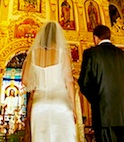
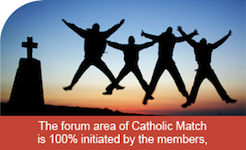




 Daniel
Jenky (right),
the bishop of Peoria, Ill., did not hesitate
to play the persecution card in the dispute
with the Obama administration over required
health insurance coverage of birth control. Evoking the history of
“terrible persecution” of the Church,
he said: “Hitler and Stalin
would not tolerate any competition with the state in education, social
services and health care. . . . Barack Obama — with his radical,
pro-abortion and extreme secularist agenda — now seems intent
on following a similar path.” In an effort
to clarify the statement, a diocese spokesperson said, “We certainly
have not reached the same level of persecution. However, history teaches
us to be cautious once we start down the path of limiting religious
liberty.” (She did not explain just what the bishop regarded
as the Church’s current “level of persecution” by
the administration.)
Daniel
Jenky (right),
the bishop of Peoria, Ill., did not hesitate
to play the persecution card in the dispute
with the Obama administration over required
health insurance coverage of birth control. Evoking the history of
“terrible persecution” of the Church,
he said: “Hitler and Stalin
would not tolerate any competition with the state in education, social
services and health care. . . . Barack Obama — with his radical,
pro-abortion and extreme secularist agenda — now seems intent
on following a similar path.” In an effort
to clarify the statement, a diocese spokesperson said, “We certainly
have not reached the same level of persecution. However, history teaches
us to be cautious once we start down the path of limiting religious
liberty.” (She did not explain just what the bishop regarded
as the Church’s current “level of persecution” by
the administration.)
 A
proper reply to the bishops:
"Want taxes?"
A
proper reply to the bishops:
"Want taxes?"
 it’s
about birth control, and women’s lower caste in the church.
It’s about conservative bishops targeting Democratic candidates
who support contraception and abortion rights as a matter of public
policy. And it’s about a church that is obsessed with sex in
ways it shouldn’t be, and not obsessed with sex in ways it should
be.
it’s
about birth control, and women’s lower caste in the church.
It’s about conservative bishops targeting Democratic candidates
who support contraception and abortion rights as a matter of public
policy. And it’s about a church that is obsessed with sex in
ways it shouldn’t be, and not obsessed with sex in ways it should
be. and
passed around like communion wine.
and
passed around like communion wine. Speaking
to the graduates [at Georgetown University],
[Kathleen Sebelius, the health and human
services secretary], evoked J.F.K.’s speech asserting that religious
bodies should not seek to impose their will through politics. She
said that contentious debate is a strength of this country, adding
that in some other places, “a leader delivers an edict and it
goes into effect. There’s no debate, no criticism, no second-guessing.”
Speaking
to the graduates [at Georgetown University],
[Kathleen Sebelius, the health and human
services secretary], evoked J.F.K.’s speech asserting that religious
bodies should not seek to impose their will through politics. She
said that contentious debate is a strength of this country, adding
that in some other places, “a leader delivers an edict and it
goes into effect. There’s no debate, no criticism, no second-guessing.” Twenty-eight
years ago, weighing a run for president, Mario
Cuomo gave a speech at Notre Dame
in which he deftly tried to explain how officials could remain good
Catholics while going against church dictums in shaping public policy.
Twenty-eight
years ago, weighing a run for president, Mario
Cuomo gave a speech at Notre Dame
in which he deftly tried to explain how officials could remain good
Catholics while going against church dictums in shaping public policy.
 As a two-term governor of Kansas, Ms. Sebelius was told by her bishop
that she should be denied communion at Mass because of her support
for abortion rights. As health secretary, she has been vilified for
upholding the mandate in the health care overhaul that requires even
religiously affiliated institutions to provide birth control coverage
to their employees.
As a two-term governor of Kansas, Ms. Sebelius was told by her bishop
that she should be denied communion at Mass because of her support
for abortion rights. As health secretary, she has been vilified for
upholding the mandate in the health care overhaul that requires even
religiously affiliated institutions to provide birth control coverage
to their employees. recently
became public that Georgetown University, a Jesuit institution, had
invited Ms. Sebelius to speak at an awards ceremony this Friday, its
commencement day.
recently
became public that Georgetown University, a Jesuit institution, had
invited Ms. Sebelius to speak at an awards ceremony this Friday, its
commencement day. Society,
has played an influential role as a whistle-blower,
alerting bishops when they find a university stepping out of line.
This spring, the
group compiled a list of 12 Catholic universities with
commencement speakers they found objectionable
because of their support for abortion rights or gay rights.
Society,
has played an influential role as a whistle-blower,
alerting bishops when they find a university stepping out of line.
This spring, the
group compiled a list of 12 Catholic universities with
commencement speakers they found objectionable
because of their support for abortion rights or gay rights. The
Georgetown controversy has generated the most outrage since the University
of Notre Dame gave an honorary degree and a commencement speaking
slot to President Obama three years ago.
Many bishops issued statements deploring the
university’s decision because of the president’s
support for abortion rights, but the
speech went ahead as planned.
The
Georgetown controversy has generated the most outrage since the University
of Notre Dame gave an honorary degree and a commencement speaking
slot to President Obama three years ago.
Many bishops issued statements deploring the
university’s decision because of the president’s
support for abortion rights, but the
speech went ahead as planned. In
response to the controversy, Georgetown’s
president, John J. DeGioia, said
it was the decision of the students at the Georgetown
Public Policy Institute to invite Ms.
Sebelius in recognition of her long service as a public
In
response to the controversy, Georgetown’s
president, John J. DeGioia, said
it was the decision of the students at the Georgetown
Public Policy Institute to invite Ms.
Sebelius in recognition of her long service as a public  official.
official.
 statement
on Tuesday “for this grave transgression” and “to
everyone who is hurt by this revelation.” He said he would take
a year off from public ministry to reflect on his transgressions and
his “commitments as a priest”
— a decision he said he made with his superiors.
statement
on Tuesday “for this grave transgression” and “to
everyone who is hurt by this revelation.” He said he would take
a year off from public ministry to reflect on his transgressions and
his “commitments as a priest”
— a decision he said he made with his superiors. The
order’s founder, a Mexican priest named Marcial
Maciel Degollado (right with John
Paul II), died in 2008 amid revelations that he had
sexually abused young seminarians, misappropriated money and fathered
several children, some of whom say they were also victims of his sexual
abuse. Only last Friday, the Legion acknowledged
that seven of its priests are being investigated by the Vatican in
connection with the sexual abuse of minors.
The
order’s founder, a Mexican priest named Marcial
Maciel Degollado (right with John
Paul II), died in 2008 amid revelations that he had
sexually abused young seminarians, misappropriated money and fathered
several children, some of whom say they were also victims of his sexual
abuse. Only last Friday, the Legion acknowledged
that seven of its priests are being investigated by the Vatican in
connection with the sexual abuse of minors.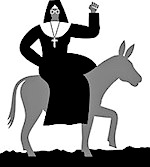
 In
1886, four Texas priests demanded that
Bishop John C. Néraz replace a
superior, Mother St. Andrew Feltin (right),
saying that she had “spread gossip”
and warned her sisters “to beware of priests.”
In
1886, four Texas priests demanded that
Bishop John C. Néraz replace a
superior, Mother St. Andrew Feltin (right),
saying that she had “spread gossip”
and warned her sisters “to beware of priests.”
 their
hands.
their
hands. against
piety and morality – the
Girl
against
piety and morality – the
Girl  Scouts
of America.
Scouts
of America. homosexual
agendas. He noted disapprovingly that
the First Lady is the organization’s
honorary president (the
First Lady is always the honorary president), and
took exception to the fact that a Colorado troop
allowed a transgendered child to join up.
homosexual
agendas. He noted disapprovingly that
the First Lady is the organization’s
honorary president (the
First Lady is always the honorary president), and
took exception to the fact that a Colorado troop
allowed a transgendered child to join up.


 represents
80 percent of American Catholic nuns,
accusing the group of “serious doctrinal
problems” and promoting “radical
feminist themes.” That seems
a misreading of the very fine work in schools, charities, prisons
and impoverished neighborhoods being done by about 60,000 nuns across
the nation.
represents
80 percent of American Catholic nuns,
accusing the group of “serious doctrinal
problems” and promoting “radical
feminist themes.” That seems
a misreading of the very fine work in schools, charities, prisons
and impoverished neighborhoods being done by about 60,000 nuns across
the nation.
 compel
the group to disclose more than two decades of e-mails that could
include correspondence with victims, lawyers, whistle-blowers, witnesses,
the police, prosecutors and journalists.
compel
the group to disclose more than two decades of e-mails that could
include correspondence with victims, lawyers, whistle-blowers, witnesses,
the police, prosecutors and journalists. of
a judge’s order. But William Donohue (right),
president of the Catholic League for Religious and Civil Rights,
a church advocacy group in New York, said targeting the network was
justified because “SNAP is a menace
to the Catholic Church.”
of
a judge’s order. But William Donohue (right),
president of the Catholic League for Religious and Civil Rights,
a church advocacy group in New York, said targeting the network was
justified because “SNAP is a menace
to the Catholic Church.” quick
to write a check, and I think they’ve realized it would be a
lot less expensive in the long run if we fought them one by one,”
Mr. Donohue said.
quick
to write a check, and I think they’ve realized it would be a
lot less expensive in the long run if we fought them one by one,”
Mr. Donohue said.
 mother's
funeral — because she is a lesbian.
mother's
funeral — because she is a lesbian.

 Vatican:
Pope Benedict XVI waded into the
American culture wars on Friday, urging visiting
American bishops to beef up their teaching about the evils of premarital
sex and cohabitation, and denouncing what he called the “powerful”
gay marriage lobby in America. Benedict said there was an urgent
need for American Catholics to discover the value of chastity, an
essential element of Christian teaching that he said had been subject
to unjust “ridicule.” The pope also told the bishops not
to back down in the face of “powerful
political and cultural currents seeking to alter the legal definition
of marriage.”
Vatican:
Pope Benedict XVI waded into the
American culture wars on Friday, urging visiting
American bishops to beef up their teaching about the evils of premarital
sex and cohabitation, and denouncing what he called the “powerful”
gay marriage lobby in America. Benedict said there was an urgent
need for American Catholics to discover the value of chastity, an
essential element of Christian teaching that he said had been subject
to unjust “ridicule.” The pope also told the bishops not
to back down in the face of “powerful
political and cultural currents seeking to alter the legal definition
of marriage.”
 new
rule requiring employer health plans to cover birth control without
a co-pay as an assault on religious freedom.
new
rule requiring employer health plans to cover birth control without
a co-pay as an assault on religious freedom.
 The New York Times: November 9, 2011
The New York Times: November 9, 2011 Graham
B. Spanier, one of the longest-serving and highest-paid university
presidents in the nation, who has helped raise the
academic profile of Penn State during his tenure,
was also removed by the Board of Trustees.
When the announcement was made at a news conference that the 84-year-old
Paterno would not coach another game, a gasp went up from the crowd
of several hundred reporters, students and
Graham
B. Spanier, one of the longest-serving and highest-paid university
presidents in the nation, who has helped raise the
academic profile of Penn State during his tenure,
was also removed by the Board of Trustees.
When the announcement was made at a news conference that the 84-year-old
Paterno would not coach another game, a gasp went up from the crowd
of several hundred reporters, students and  camera
people who were present.
camera
people who were present.
 key
part of the football program, but prosecutors have said he was a serial
pedophile who was allowed to add victims over the years in part because
the university he had served was either unable or unwilling to stop
him.
key
part of the football program, but prosecutors have said he was a serial
pedophile who was allowed to add victims over the years in part because
the university he had served was either unable or unwilling to stop
him. A
Roman Catholic, [Gov. Tom Corbett of Pennsylvania] was struck
early on in the Penn State investigation by the similarities between
the university’s failure to report allegations
of sexual abuse involving Mr. Sandusky and
the church’s failure to report pedophile priests, according
to several people who work with him.
A
Roman Catholic, [Gov. Tom Corbett of Pennsylvania] was struck
early on in the Penn State investigation by the similarities between
the university’s failure to report allegations
of sexual abuse involving Mr. Sandusky and
the church’s failure to report pedophile priests, according
to several people who work with him.

 McAneney
(below
right) told a reporter
the other day. He was referring, of course, to Joe
Paterno.
McAneney
(below
right) told a reporter
the other day. He was referring, of course, to Joe
Paterno.  Pennsauken,
N.J., had known the 84-year-old Paterno for some 50 years, he told
Randy Miller of The Courier-Post in Cherry Hill, N.J., and was “heartbroken”
to see his friend fired as the Penn State football coach for his involvement
in the sexual abuse scandal that has so soiled the university. Describing
Paterno as a devout Catholic was McAneney’s
way of saying that his friend was still a good and decent man.
Pennsauken,
N.J., had known the 84-year-old Paterno for some 50 years, he told
Randy Miller of The Courier-Post in Cherry Hill, N.J., and was “heartbroken”
to see his friend fired as the Penn State football coach for his involvement
in the sexual abuse scandal that has so soiled the university. Describing
Paterno as a devout Catholic was McAneney’s
way of saying that his friend was still a good and decent man. ending
of his long and famous career, I think about Darío
Castrillón Hoyos.
ending
of his long and famous career, I think about Darío
Castrillón Hoyos. his
country’s drug-fueled civil wars. In Colombia, he was a remarkable
figure: a “rustic man with the profile of an eagle,” as
Gabriel García Márquez described him, who left his episcopal
residence at night to feed slum children, mediated between guerrillas
and death squads and reputedly made his way to Pablo Escobar’s
house disguised as a milkman to demand that the drug kingpin confess
his sins.
his
country’s drug-fueled civil wars. In Colombia, he was a remarkable
figure: a “rustic man with the profile of an eagle,” as
Gabriel García Márquez described him, who left his episcopal
residence at night to feed slum children, mediated between guerrillas
and death squads and reputedly made his way to Pablo Escobar’s
house disguised as a milkman to demand that the drug kingpin confess
his sins. When
our heroes let us down, it forces us to question our own judgment
for elevating them in the first place.
When
our heroes let us down, it forces us to question our own judgment
for elevating them in the first place.
 out
what, if anything, to say on Sunday to his parishioners at St.
Patrick’s Catholic Church about the new turmoil facing
the local Roman Catholic diocese.
out
what, if anything, to say on Sunday to his parishioners at St.
Patrick’s Catholic Church about the new turmoil facing
the local Roman Catholic diocese.  —
all of whom expressed the same uncertainty — decided not to
address the matter directly from the pulpit but to offer a homily
on man and God that emphasized forgiveness.
—
all of whom expressed the same uncertainty — decided not to
address the matter directly from the pulpit but to offer a homily
on man and God that emphasized forgiveness. pastor,
the Rev. Shawn Ratigan, was once well-regarded
for his easy manner, fondness for children and the camera that he
always brought to events at the church and the parish
elementary school.
pastor,
the Rev. Shawn Ratigan, was once well-regarded
for his easy manner, fondness for children and the camera that he
always brought to events at the church and the parish
elementary school.  even
after church officials in December discovered
hundreds of photographs on his computer that included
nude pictures and “upskirt images” of
even
after church officials in December discovered
hundreds of photographs on his computer that included
nude pictures and “upskirt images” of  girls,
and even after he attempted suicide.
girls,
and even after he attempted suicide. of
the Diocese of Kansas City-St. Joseph and the prosecuting
attorney of neighboring Clay County, Daniel
White, leaves the bishop open to prosecution
for misdemeanor charges for five years, if he does not continue to
meet with the prosecutor and report all episodes. But victims’
advocates criticized the deal as cozy and ineffectual, compared with
previous agreements between bishops and prosecutors.
of
the Diocese of Kansas City-St. Joseph and the prosecuting
attorney of neighboring Clay County, Daniel
White, leaves the bishop open to prosecution
for misdemeanor charges for five years, if he does not continue to
meet with the prosecutor and report all episodes. But victims’
advocates criticized the deal as cozy and ineffectual, compared with
previous agreements between bishops and prosecutors. of
having sexual contact with a 13-year-old boy.
of
having sexual contact with a 13-year-old boy. “This is ridiculous. It’s a crazy story.
Who started it?” parishioner John
Sweeney said,
“This is ridiculous. It’s a crazy story.
Who started it?” parishioner John
Sweeney said,  adding
when asked if Brady is a good man, “absolutely. There’s
no better.
adding
when asked if Brady is a good man, “absolutely. There’s
no better. he
knows Brady personally and said his office cannot impartially handle
the case.
he
knows Brady personally and said his office cannot impartially handle
the case.
 having
tried to block an inquiry into sexual abuse by priests and placing
its interests ahead of protecting children. The speech
led the Vatican to recall its ambassador.
having
tried to block an inquiry into sexual abuse by priests and placing
its interests ahead of protecting children. The speech
led the Vatican to recall its ambassador. Terrance
McKiernan (right),
the president of Bishop Accountability,
which monitors sexual abuse cases in the Catholic Church, said that
the Vatican’s response “shows that
the Vatican is still in denial.”
Terrance
McKiernan (right),
the president of Bishop Accountability,
which monitors sexual abuse cases in the Catholic Church, said that
the Vatican’s response “shows that
the Vatican is still in denial.”  the
Vatican deepened Monday after Ireland accused the Holy See of “missing
the point” in a weekend statement defending its conduct in the
sexual abuse scandals involving priests. The
Irish foreign minister, Eamon Gilmore (right),
said the government was holding firm to its
claims that the Vatican had attempted to frustrate an inquiry
into abuse in the Diocese of Cloyne as
recently as three years ago. The Vatican, in a strongly
worded report on Saturday, said there was “no evidence”
to support such an accusation.
the
Vatican deepened Monday after Ireland accused the Holy See of “missing
the point” in a weekend statement defending its conduct in the
sexual abuse scandals involving priests. The
Irish foreign minister, Eamon Gilmore (right),
said the government was holding firm to its
claims that the Vatican had attempted to frustrate an inquiry
into abuse in the Diocese of Cloyne as
recently as three years ago. The Vatican, in a strongly
worded report on Saturday, said there was “no evidence”
to support such an accusation.  Missouri
- A Kansas City law firm hired by the Roman
Catholic Diocese of Kansas City-St. Joseph said the diocese
failed to follow its own policies in responding to sexual abuse claims
against priests. The firm of Graves Bartle Marcus
& Garrett issued its findings Thursday
after investigating the diocese’s response to accusations
against two priests. The Rev. Michael
Tierney (left)
Missouri
- A Kansas City law firm hired by the Roman
Catholic Diocese of Kansas City-St. Joseph said the diocese
failed to follow its own policies in responding to sexual abuse claims
against priests. The firm of Graves Bartle Marcus
& Garrett issued its findings Thursday
after investigating the diocese’s response to accusations
against two priests. The Rev. Michael
Tierney (left) 
 was
accused of sexually abusing minors in the early 1970s, and the Rev.
Shawn Ratigan (right)
is facing state and federal charges accusing him of taking pornographic
pictures of young girls. The law firm
recommends, among other things, that any employee or volunteer who
receives a report of abuse must report it immediately to law enforcement
or the state.
was
accused of sexually abusing minors in the early 1970s, and the Rev.
Shawn Ratigan (right)
is facing state and federal charges accusing him of taking pornographic
pictures of young girls. The law firm
recommends, among other things, that any employee or volunteer who
receives a report of abuse must report it immediately to law enforcement
or the state.

 building
in an area of this city hard hit by Spain’s economic crisis.
In front of the altar are a few scraggly potted plants. Behind it,
some plastic chairs.
building
in an area of this city hard hit by Spain’s economic crisis.
In front of the altar are a few scraggly potted plants. Behind it,
some plastic chairs. Madrid
is girding itself for the arrival of perhaps one and a half million
pilgrims. Its lampposts are gaily decorated with banners.
Retiro Park
has been decked out with 200 portable confessional
booths. But bitter
debates are raging over the festivities and the
role of the church in Spanish politics.
Madrid
is girding itself for the arrival of perhaps one and a half million
pilgrims. Its lampposts are gaily decorated with banners.
Retiro Park
has been decked out with 200 portable confessional
booths. But bitter
debates are raging over the festivities and the
role of the church in Spanish politics. 


 public
campaign to see women ordained as priests
in the Roman Catholic Church, has been
notified of his dismissal by his religious order, the Maryknoll
Fathers and Brothers.
public
campaign to see women ordained as priests
in the Roman Catholic Church, has been
notified of his dismissal by his religious order, the Maryknoll
Fathers and Brothers. in
support of the women’s priests movement continues to create
in the minds of many faithful the view that your position is acceptable
to our Church,” the letter said, adding that Father
Bourgeois had caused the church “grave scandal.”
in
support of the women’s priests movement continues to create
in the minds of many faithful the view that your position is acceptable
to our Church,” the letter said, adding that Father
Bourgeois had caused the church “grave scandal.” to
women says he will contest a move by his religious order to dismiss
him for his dissent. The priest, the
Rev. Roy Bourgeois, said he had retained
the Rev. Thomas Doyle (right), a canon
lawyer best known as a whistleblower in the priest sexual abuse scandal,
to press the case with the
to
women says he will contest a move by his religious order to dismiss
him for his dissent. The priest, the
Rev. Roy Bourgeois, said he had retained
the Rev. Thomas Doyle (right), a canon
lawyer best known as a whistleblower in the priest sexual abuse scandal,
to press the case with the  Maryknoll
Fathers and Brothers. Father
Doyle said he would argue that Father Bourgeois had
a right to follow his conscience, and that the prohibition on women’s
ordination was not an infallible church teaching, despite Vatican
declarations. A Maryknoll spokesman said its
general council would decide the next step.
Maryknoll
Fathers and Brothers. Father
Doyle said he would argue that Father Bourgeois had
a right to follow his conscience, and that the prohibition on women’s
ordination was not an infallible church teaching, despite Vatican
declarations. A Maryknoll spokesman said its
general council would decide the next step.
 citing
reaction to a recent Irish government report that said the Vatican
had discouraged efforts by bishops to report cases of sexual abuse
to the police.
citing
reaction to a recent Irish government report that said the Vatican
had discouraged efforts by bishops to report cases of sexual abuse
to the police. The
spokesman, the Rev. Ciro Benedettini (right),
told reporters that the archbishop would return to Rome to consult
with Vatican officials who are preparing the Holy See’s official
response to the Irish government on the report,
but added that the decision “does
not exclude some degree of surprise and disappointment at certain
excessive reactions.”
The
spokesman, the Rev. Ciro Benedettini (right),
told reporters that the archbishop would return to Rome to consult
with Vatican officials who are preparing the Holy See’s official
response to the Irish government on the report,
but added that the decision “does
not exclude some degree of surprise and disappointment at certain
excessive reactions.” he
government report, conducted by an independent investigative committee
and released July 13, found that clergy
members in the rural Irish diocese of Cloyne
(Cathedral left)did
not act on complaints against 19 priests from 1996 to as recently
as 2009. More damningly, it said that the
Vatican had encouraged bishops to ignore child-protection guidelines
adopted by Irish bishops in 1996 that included “mandatory reporting”
of abuse to the civil authorities.
he
government report, conducted by an independent investigative committee
and released July 13, found that clergy
members in the rural Irish diocese of Cloyne
(Cathedral left)did
not act on complaints against 19 priests from 1996 to as recently
as 2009. More damningly, it said that the
Vatican had encouraged bishops to ignore child-protection guidelines
adopted by Irish bishops in 1996 that included “mandatory reporting”
of abuse to the civil authorities. represented
the government’s sharpest-ever direct
attack on the Roman Catholic leadership.
represented
the government’s sharpest-ever direct
attack on the Roman Catholic leadership.


 Frantically
distancing himself from the pope of Fleet Street,
David Cameron
conceded that he should not have ignored
warnings from the palace and elsewhere against bringing a capo from
the sulfurous Murdoch gang into his inner circle.
Frantically
distancing himself from the pope of Fleet Street,
David Cameron
conceded that he should not have ignored
warnings from the palace and elsewhere against bringing a capo from
the sulfurous Murdoch gang into his inner circle. years,
they would have been very much of the view that they were Catholics
first and politicians second,” said Diarmaid
Ferriter, a professor of modern Irish history at University
College Dublin.
years,
they would have been very much of the view that they were Catholics
first and politicians second,” said Diarmaid
Ferriter, a professor of modern Irish history at University
College Dublin.
 Diarmuid
Martin, the archbishop of Dublin, who
has been frozen out by the Vatican and his fellow Irish bishops for
his tender solicitude toward abuse victims, teared up on Irish
TV talking about Kenny’s cri de coeur.
Diarmuid
Martin, the archbishop of Dublin, who
has been frozen out by the Vatican and his fellow Irish bishops for
his tender solicitude toward abuse victims, teared up on Irish
TV talking about Kenny’s cri de coeur.

 Irish
government.
Irish
government. served
as private secretary to three popes, resigned last year.
In a statement on Wednesday, Bishop Magee offered a “sincere
apology,” but he did not accept direct responsibility for covering
up the abuse.
served
as private secretary to three popes, resigned last year.
In a statement on Wednesday, Bishop Magee offered a “sincere
apology,” but he did not accept direct responsibility for covering
up the abuse. officials
were failing to investigate allegations. The report warned that other
dioceses might have similar failings.
officials
were failing to investigate allegations. The report warned that other
dioceses might have similar failings.

 Vatican
has blatantly resisted the idea that civil law must trump church rules
in confronting criminal acts. This was evident again in the revelation
that the Roman Catholic Church in Ireland continued to cover up abuse
cases long after it had issued rules to protect children in 1996.
Vatican
has blatantly resisted the idea that civil law must trump church rules
in confronting criminal acts. This was evident again in the revelation
that the Roman Catholic Church in Ireland continued to cover up abuse
cases long after it had issued rules to protect children in 1996. detailed
report on Wednesday showing that abuses were occurring as
recently as 2009.
detailed
report on Wednesday showing that abuses were occurring as
recently as 2009. conflicted
with church law and should be considered “merely a study document.”
conflicted
with church law and should be considered “merely a study document.”
 Vatican
officials point to new, tougher rules. But the rules, which do not
require dioceses to report allegations of crimes to the police, are
considered only advisory guidelines to bishops. The Dublin government
has enacted a new law making it a crime for anyone, church officials
included, to fail to report child abuse to civil authorities. The
Vatican has a valuable lesson to learn in Ireland.
Vatican
officials point to new, tougher rules. But the rules, which do not
require dioceses to report allegations of crimes to the police, are
considered only advisory guidelines to bishops. The Dublin government
has enacted a new law making it a crime for anyone, church officials
included, to fail to report child abuse to civil authorities. The
Vatican has a valuable lesson to learn in Ireland.
 didn’t
even read the bill or debate the issue before quickly voting during
the session’s final night — redefining
a centuries’ old institution.
didn’t
even read the bill or debate the issue before quickly voting during
the session’s final night — redefining
a centuries’ old institution.

 Senator
Marty Golden voted against gay marriage
and said he’s still unwelcome.
Senator
Marty Golden voted against gay marriage
and said he’s still unwelcome. into
Gotham's churches Sunday.
into
Gotham's churches Sunday.
 policies
to ensure that children have the proper nutrition, the best education
available and are safe from harms way.
policies
to ensure that children have the proper nutrition, the best education
available and are safe from harms way.
 With his cigars, blogs, Jameson’s and Irish affability, New
York Archbishop Timothy Dolan prides
himself on his gumption.
With his cigars, blogs, Jameson’s and Irish affability, New
York Archbishop Timothy Dolan prides
himself on his gumption. between
same-sex couples, painting it as a perversity against nature.
between
same-sex couples, painting it as a perversity against nature. Catholic
governor who is fiercely pushing for New York to become the sixth
and most populous state to approve gay marriage.
Catholic
governor who is fiercely pushing for New York to become the sixth
and most populous state to approve gay marriage.
 government
can dictate the size of families, who lives and who dies, and what
the very definition of ‘family’ and ‘marriage’
means.”
government
can dictate the size of families, who lives and who dies, and what
the very definition of ‘family’ and ‘marriage’
means.”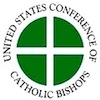
 children
are, unfortunately, just that — flimsy
guidelines for a global problem that requires an unequivocal mandate
for church officials to work with secular authorities
in prosecuting rogue priests.
children
are, unfortunately, just that — flimsy
guidelines for a global problem that requires an unequivocal mandate
for church officials to work with secular authorities
in prosecuting rogue priests.
 traditional
supremacy of local bishops. That was not the case earlier this month,
when Pope Benedict XVI removed
Bishop William Morris (right) of Toowoomba, Australia,
from office. The bishop, concerned with
the shortage of priests, asked five years ago whether the Vatican “may
well” have to reconsider the bar to ordaining women or married
men.
traditional
supremacy of local bishops. That was not the case earlier this month,
when Pope Benedict XVI removed
Bishop William Morris (right) of Toowoomba, Australia,
from office. The bishop, concerned with
the shortage of priests, asked five years ago whether the Vatican “may
well” have to reconsider the bar to ordaining women or married
men. documents
related to the church case for a criminal investigation, a police
spokeswoman, Lorena Quiroz, confirmed Tuesday. A judge ordered the
raid after Juan
Pablo Bulnes, the lawyer for the priest, the
Rev. Fernando Karadima
(right), refused to turn over documents. Mr. Bulnes on Tuesday called
the action an “abuse” of his right to lawyer-client confidentiality.
He said Chile’s bar association has asked the Supreme Court
to overturn the seizure.
documents
related to the church case for a criminal investigation, a police
spokeswoman, Lorena Quiroz, confirmed Tuesday. A judge ordered the
raid after Juan
Pablo Bulnes, the lawyer for the priest, the
Rev. Fernando Karadima
(right), refused to turn over documents. Mr. Bulnes on Tuesday called
the action an “abuse” of his right to lawyer-client confidentiality.
He said Chile’s bar association has asked the Supreme Court
to overturn the seizure. 

 describe
him. Jesus refers to the divinity as Father. So does that make the
creator a masculine force — and mean that men are more godlike
than women?
describe
him. Jesus refers to the divinity as Father. So does that make the
creator a masculine force — and mean that men are more godlike
than women? “What
the bishops have done is to reject 50 years of contemporary theology,”
said Terrence W. Tilley, chairman of
the theology department at Fordham, where many faculty
members have rallied to the sister’s defense. “Sister
Johnson has been attempting to push Catholic thinking along new paths.
And the bishops have now made it clear — this is something they
stand against.”
“What
the bishops have done is to reject 50 years of contemporary theology,”
said Terrence W. Tilley, chairman of
the theology department at Fordham, where many faculty
members have rallied to the sister’s defense. “Sister
Johnson has been attempting to push Catholic thinking along new paths.
And the bishops have now made it clear — this is something they
stand against.” person
who has described the male-only priesthood as a sign of ‘patriarchal
resistance to women’s equality,’ ” said Patrick
J. Reilly, the society’s president. “So I think
she has officially challenged church teaching in ways that are beyond
the pale.”
person
who has described the male-only priesthood as a sign of ‘patriarchal
resistance to women’s equality,’ ” said Patrick
J. Reilly, the society’s president. “So I think
she has officially challenged church teaching in ways that are beyond
the pale.” examined
different understandings of the divine through the experiences of
women, Latinos, Holocaust victims, the poor and people of other religions.
Saying the book should not be used in Catholic schools and colleges,
the bishops singled out passages they said contained “misrepresentations,
ambiguities and errors.” Those included sections describing
other religious traditions as having roots in divine revelation as
deep as Christianity’s.
examined
different understandings of the divine through the experiences of
women, Latinos, Holocaust victims, the poor and people of other religions.
Saying the book should not be used in Catholic schools and colleges,
the bishops singled out passages they said contained “misrepresentations,
ambiguities and errors.” Those included sections describing
other religious traditions as having roots in divine revelation as
deep as Christianity’s. has
been debated and rejected by the bishops before. Still,
the book persisted, “all-male images of God are hierarchical
images rooted in the unequal relation between women and men, and they
function to maintain this arrangement.”
has
been debated and rejected by the bishops before. Still,
the book persisted, “all-male images of God are hierarchical
images rooted in the unequal relation between women and men, and they
function to maintain this arrangement.” they
have the truth and Sister Johnson doesn’t.”
they
have the truth and Sister Johnson doesn’t.”  But
Teresa Berger, a theology professor
at Yale Divinity
But
Teresa Berger, a theology professor
at Yale Divinity  School
whom the Vatican barred from teaching in Catholic universities in
the early 1990s because of her feminist theological writings, said
the church’s attitude toward women was diminishing its understanding
of God.
School
whom the Vatican barred from teaching in Catholic universities in
the early 1990s because of her feminist theological writings, said
the church’s attitude toward women was diminishing its understanding
of God.

 McCormack
of Manchester a “pedophile
pimp” on his Facebook
page.
McCormack
of Manchester a “pedophile
pimp” on his Facebook
page.
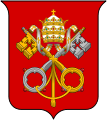

 that
a popular book about God by Sister
Elizabeth A. Johnson, a theologian at Fordham
University in New York, should not be used
in Catholic schools and universities because it does not uphold church
doctrine.
that
a popular book about God by Sister
Elizabeth A. Johnson, a theologian at Fordham
University in New York, should not be used
in Catholic schools and universities because it does not uphold church
doctrine. The
Rev. Thomas Weinandy, executive director of the bishops’ Secretariat
for Doctrine
(left), said several American bishops
who did not serve on the doctrine committee had raised concerns about
the book.
The
Rev. Thomas Weinandy, executive director of the bishops’ Secretariat
for Doctrine
(left), said several American bishops
who did not serve on the doctrine committee had raised concerns about
the book. Stephen
J. Pope, a theologian at Boston College (right), said:
“The reason is political. Certain
bishops decide that they want to punish some theologians, and this
is one way they do that. There’s nothing particularly unusual
in her book as far as theology goes. It’s making an example
of someone who’s prominent.”
Stephen
J. Pope, a theologian at Boston College (right), said:
“The reason is political. Certain
bishops decide that they want to punish some theologians, and this
is one way they do that. There’s nothing particularly unusual
in her book as far as theology goes. It’s making an example
of someone who’s prominent.” Cardinal
Donald Wuerl of Washington, the committee chairman
(left), said in a statement that Sister Johnson might have avoided
problems if she had sought a bishop’s approval, known as an
“imprimatur,”
and made revisions before publishing her book.
Cardinal
Donald Wuerl of Washington, the committee chairman
(left), said in a statement that Sister Johnson might have avoided
problems if she had sought a bishop’s approval, known as an
“imprimatur,”
and made revisions before publishing her book.


 lives
with his girlfriend, Food Network hostess
Sandra Lee.
lives
with his girlfriend, Food Network hostess
Sandra Lee. from
2002 to 2009.
from
2002 to 2009.



 removed
from ministry in a parish, and the diocese’s vicar of clergy
has also resigned, officials of the Roman
Catholic Archdiocese of Los Angeles said Friday.
removed
from ministry in a parish, and the diocese’s vicar of clergy
has also resigned, officials of the Roman
Catholic Archdiocese of Los Angeles said Friday. was
his job to grant clergymen what are known as faculties to serve as
priests.
was
his job to grant clergymen what are known as faculties to serve as
priests.






 cardinal,
Adrianus Simonis, the retired archbishop
of Utrecht, who testified last month as a witness
in a legal action taken by one of almost 2,000 people who have said
they were victims of abuse.
cardinal,
Adrianus Simonis, the retired archbishop
of Utrecht, who testified last month as a witness
in a legal action taken by one of almost 2,000 people who have said
they were victims of abuse.









 its
eroding control over sexual abuse scandals in the United States and
Ireland, highlighting complex tensions between the Vatican hierarchy,
local bishops and civil authorities.
its
eroding control over sexual abuse scandals in the United States and
Ireland, highlighting complex tensions between the Vatican hierarchy,
local bishops and civil authorities.



 serpentine
look both in her body language and her face. She kept rolling her
eyes," he said.
serpentine
look both in her body language and her face. She kept rolling her
eyes," he said.

 infection.”
infection.”


 with
dyslexia who practiced intensively before facing the suburban Don
Bosco Catholic parish to perform the Sunday Mass rituals he
grew up with.
with
dyslexia who practiced intensively before facing the suburban Don
Bosco Catholic parish to perform the Sunday Mass rituals he
grew up with.



 basis
of evil, instruct clergy on evaluating whether a person is truly possessed,
and review the prayers and rituals that comprise an exorcism. Among
the speakers will be Cardinal Daniel DiNardo,
archbishop of Galveston-Houston, Texas, and a priest-assistant to
New York Archbishop Timothy Dolan.
basis
of evil, instruct clergy on evaluating whether a person is truly possessed,
and review the prayers and rituals that comprise an exorcism. Among
the speakers will be Cardinal Daniel DiNardo,
archbishop of Galveston-Houston, Texas, and a priest-assistant to
New York Archbishop Timothy Dolan.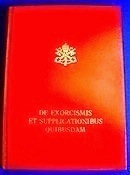
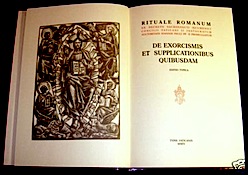


 Spain
as he sought to rekindle the faith in a once staunchly Roman Catholic
nation that is now among Europe’s most liberal.
Spain
as he sought to rekindle the faith in a once staunchly Roman Catholic
nation that is now among Europe’s most liberal.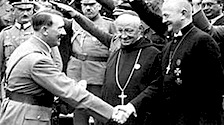
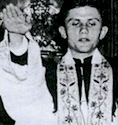
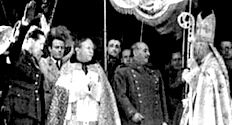






 The Times recommended an art exhibit in the West Village by AIDS activist
group ACT UP that features a photo of O'Connor next to a condom.
The Times recommended an art exhibit in the West Village by AIDS activist
group ACT UP that features a photo of O'Connor next to a condom. Dolan
slammed the Times' separate review of the "fresh and funny"
play "The Divine Sister," in the East Village.
Dolan
slammed the Times' separate review of the "fresh and funny"
play "The Divine Sister," in the East Village.















 ROME
— The Vatican expressed “shock” on Friday at the
raid on Thursday by the Belgian police of church offices in their
search for hidden evidence of child sex abuse by priests. It also
voiced its “indignation” at what it called the “violation”
of two cardinals’ tombs in the search.
ROME
— The Vatican expressed “shock” on Friday at the
raid on Thursday by the Belgian police of church offices in their
search for hidden evidence of child sex abuse by priests. It also
voiced its “indignation” at what it called the “violation”
of two cardinals’ tombs in the search.







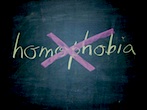
































 Ireland:
Cardinal Sean Brady, left, the leader
of Ireland ’s Roman Catholics, said Monday that he would not
resign, despite admitting that he helped the church get evidence against
a child-molesting priest but never told the police about it. He said
that as a priest in 1975, he interviewed two children who said they
had been abused by the Rev. Brendan Smyth, who was eventually accused
of molesting and raping scores of children in Ireland, Britain and
the United States. Both children were required to sign oaths promising
not to tell anyone outside the church of their accusations, Cardinal
Brady said. He said that church officials had not notified the police
because of “a culture of silence about this, a culture of secrecy.”
Ireland:
Cardinal Sean Brady, left, the leader
of Ireland ’s Roman Catholics, said Monday that he would not
resign, despite admitting that he helped the church get evidence against
a child-molesting priest but never told the police about it. He said
that as a priest in 1975, he interviewed two children who said they
had been abused by the Rev. Brendan Smyth, who was eventually accused
of molesting and raping scores of children in Ireland, Britain and
the United States. Both children were required to sign oaths promising
not to tell anyone outside the church of their accusations, Cardinal
Brady said. He said that church officials had not notified the police
because of “a culture of silence about this, a culture of secrecy.”














